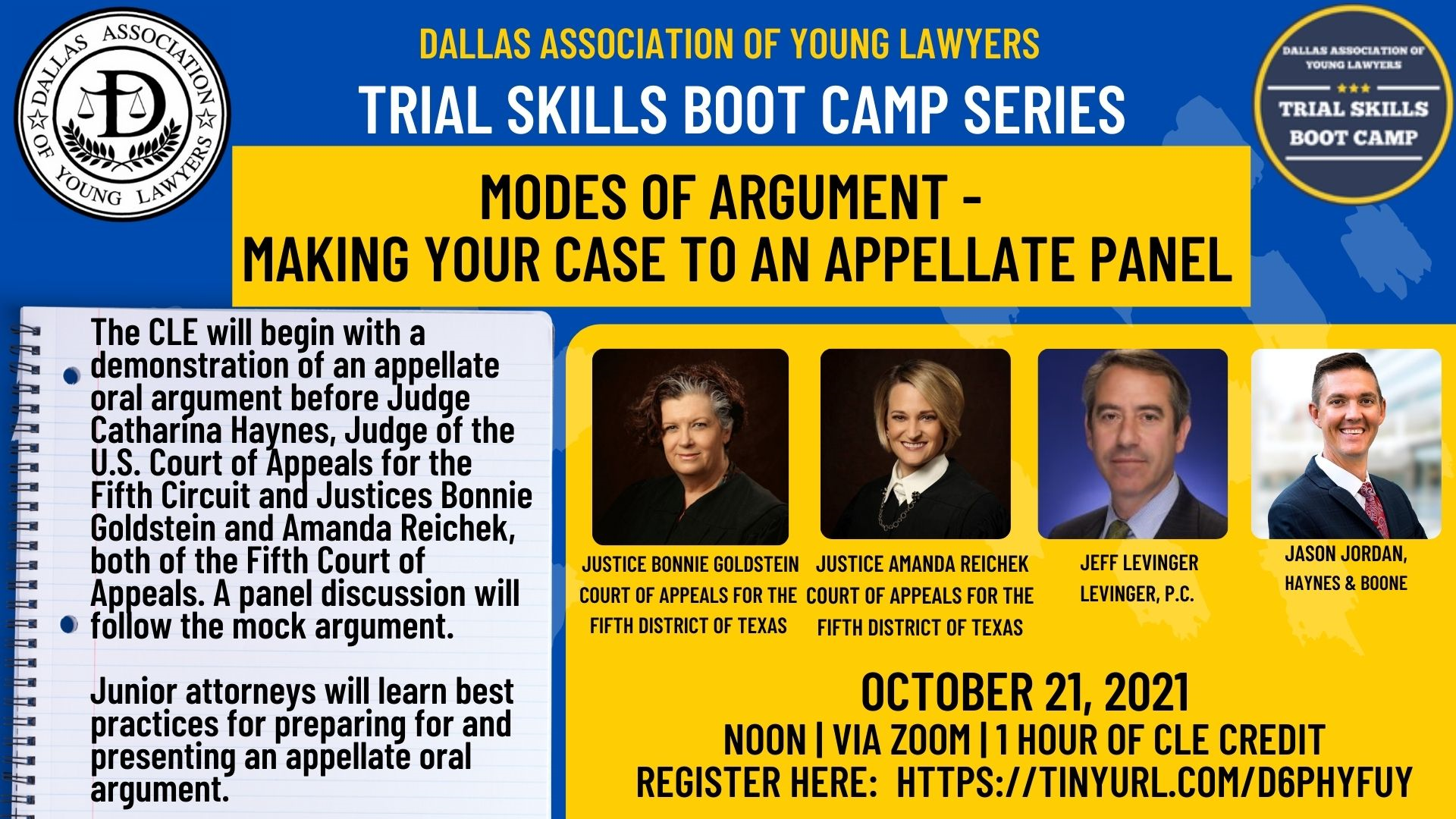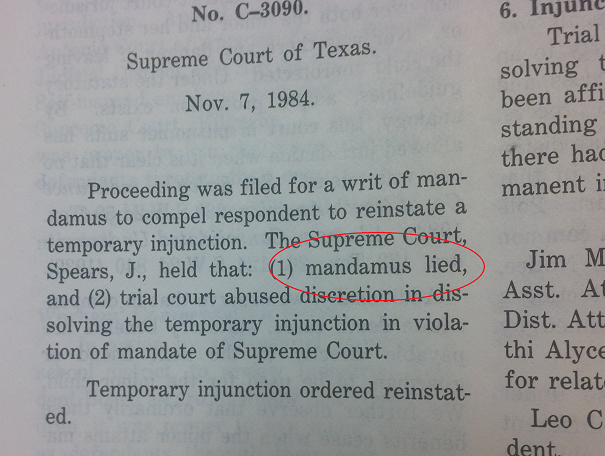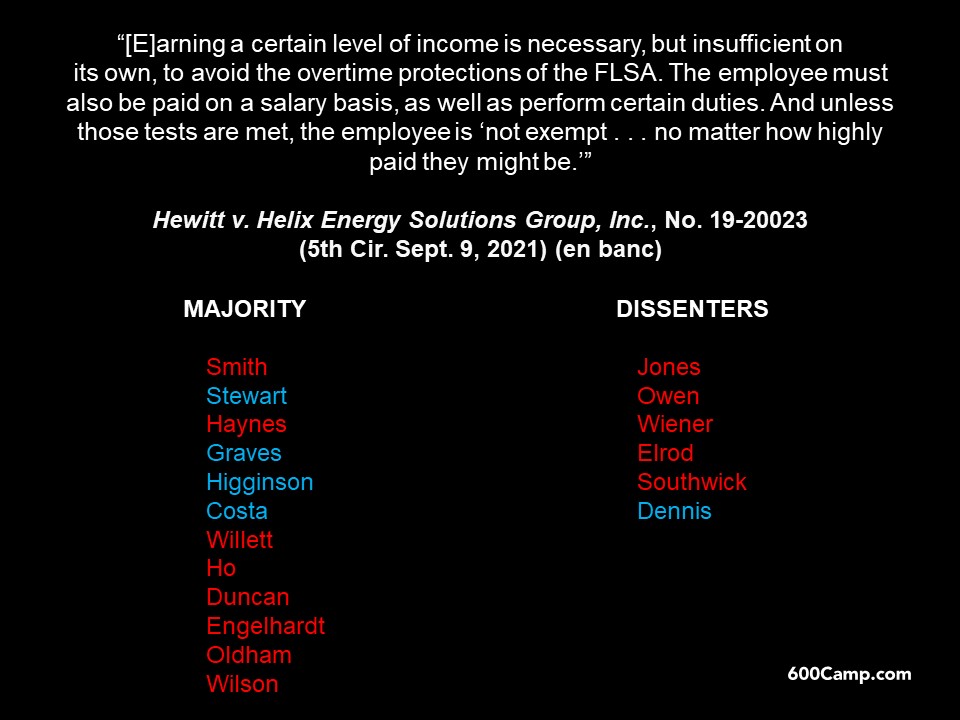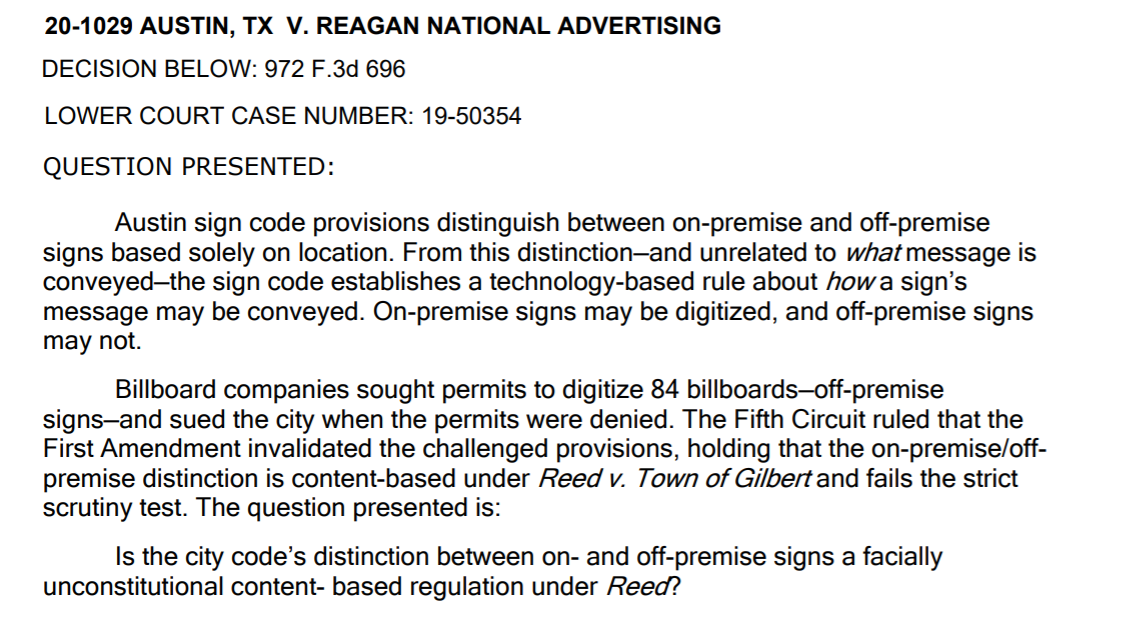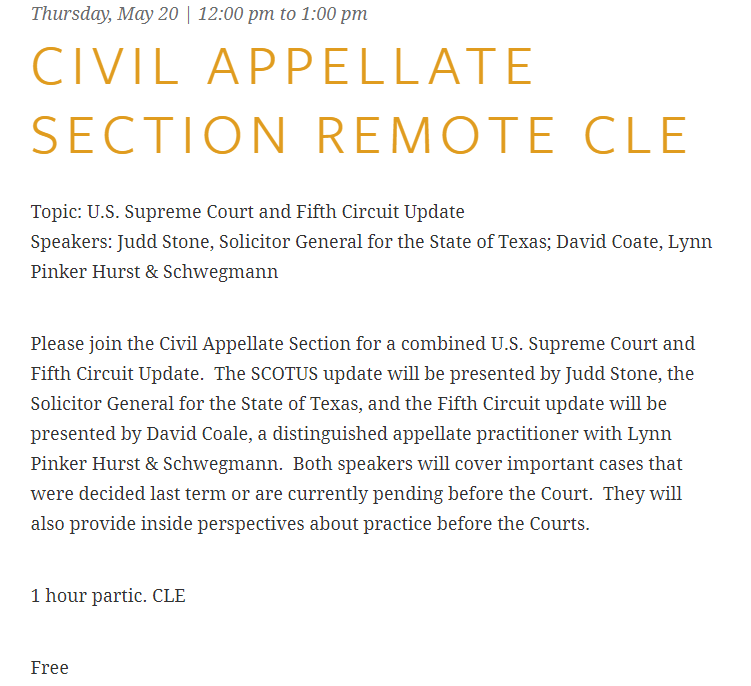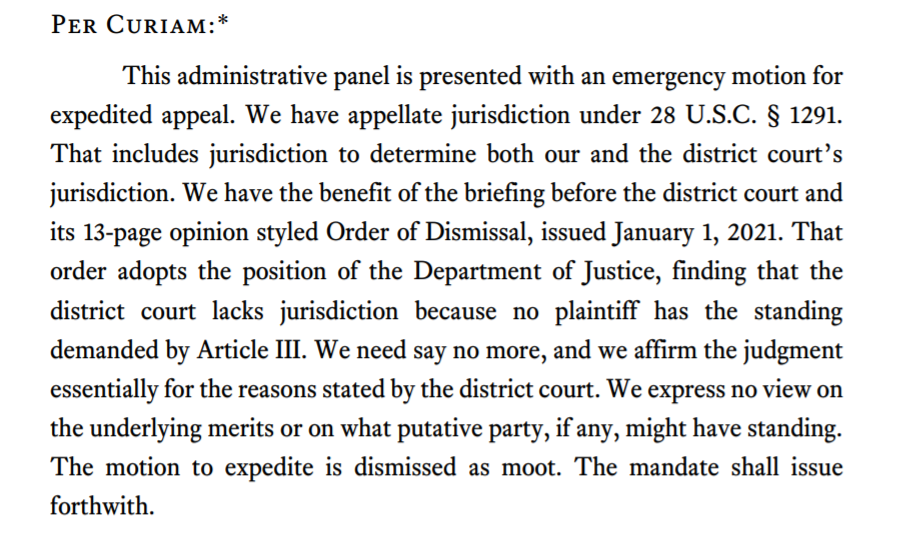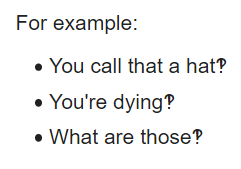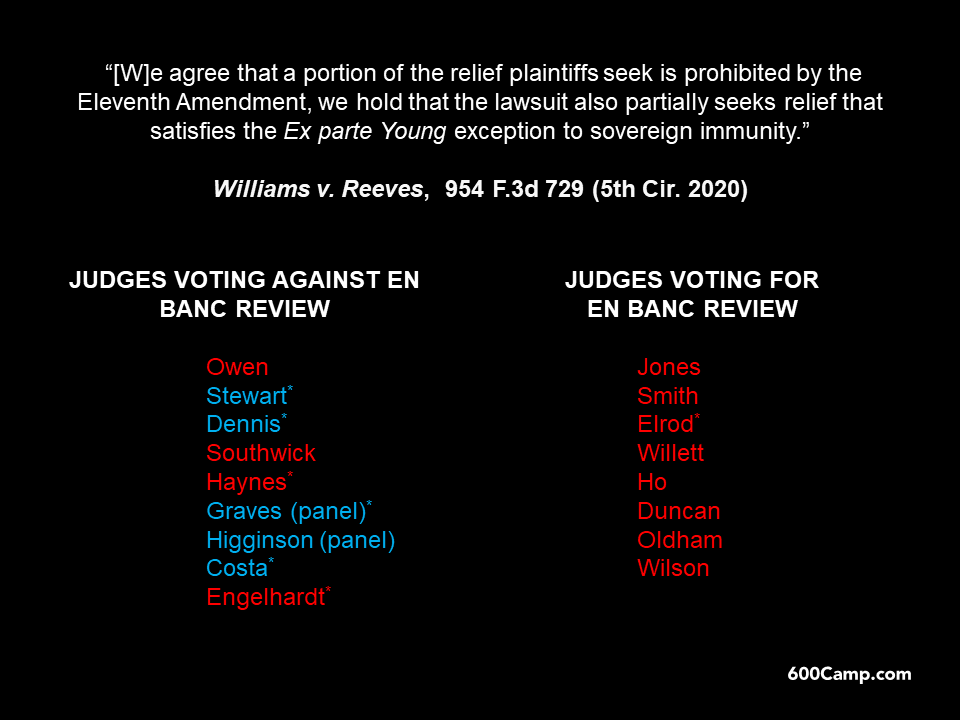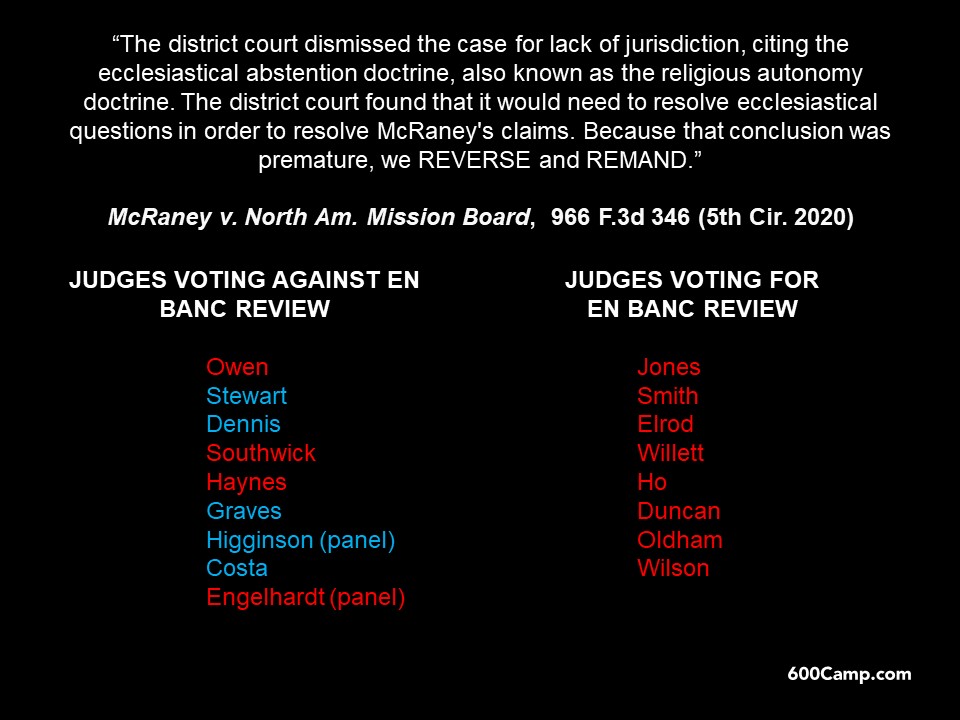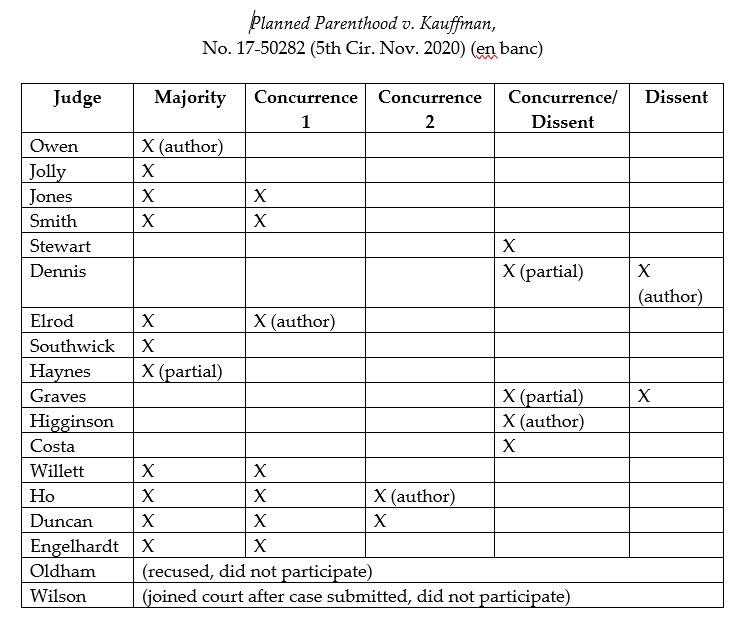 The question whether an insurance statute violated the Texas Constitution’s prohibition on “retroactive laws” presented a textbook case for certification in Fire Protection Service, Inc. v. Survitec Survival Prods, Inc.: “Beyond the closeness of the question and the dearth of on-point precedent, considerations of comity counsel in favor of certification.” No. 21-20145 (Nov. 22, 2021).
The question whether an insurance statute violated the Texas Constitution’s prohibition on “retroactive laws” presented a textbook case for certification in Fire Protection Service, Inc. v. Survitec Survival Prods, Inc.: “Beyond the closeness of the question and the dearth of on-point precedent, considerations of comity counsel in favor of certification.” No. 21-20145 (Nov. 22, 2021).
If you think that the modern administrative state relies heavily upon acronyms, you are not alone, as the Fifth Circuit illustrated in Leigh Ann H v. Reisel ISD, No. 20-50003-CV (Nov. 22, 2021):
 In Great Am. Ins. Co. v. Employers Mut. Cas. Co., both the Great American and Employers’ umbrella policies were “excess,” in that they both provided coverage for liability “in excess” of a “retained limit.” That said . . .
In Great Am. Ins. Co. v. Employers Mut. Cas. Co., both the Great American and Employers’ umbrella policies were “excess,” in that they both provided coverage for liability “in excess” of a “retained limit.” That said . . .
- the Employers’ policy defined “retained limit” as “the available limits of all ‘underlying insurance,'” a term that was, in turn, defined by two descriptions of primary coverage; while
- the Great American policy defined “retained limit” to include “the applicable limits of any other insurance providing coverage to the ‘Insured’ during the Policy Period.” (emphasis added).
Thus, “[b]ased on the plain terms of these policies, the Great American Umbrella Policy was the true excess policy after all other policies.” No. 20-11113 (Nov. 17, 2021).
 In a rough stretch for the administrative state, after the Fifth Circuit’s recent skeptical rejection of an FDA regulation of e-cigarettes, another panel stayed OSHA’s vaccine-mandate regulation. It based its decision on several administrative-law principles and summarized:
In a rough stretch for the administrative state, after the Fifth Circuit’s recent skeptical rejection of an FDA regulation of e-cigarettes, another panel stayed OSHA’s vaccine-mandate regulation. It based its decision on several administrative-law principles and summarized:
“[T]he Mandate’s strained prescriptions combine to make it the rare government pronouncement that is both overinclusive (applying to employers and employees in virtually all industries and workplaces in America, with little attempt to account for the obvious differences between the risks facing, say, a security guard on a lonely night shift, and a meatpacker working shoulder to shoulder in a cramped warehouse) and underinclusive (purporting to save employees with 99 or more coworkers from a “grave danger” in the workplace, while making no attempt to shield employees with 98 or fewer coworkers from the very same threat). The Mandate’s stated impetus—a purported “emergency” that the entire globe has now endured for nearly two years, and which OSHA itself spent nearly two months responding to—is unavailing as well. And its promulgation grossly exceeds OSHA’s statutory authority.”
No. 21-60845 (Nov. 12, 2021) (footnotes omitted, emphasis in original).
 The dispute in Guzman v. Allstate Assurance Co. was whether the insured was a smoker when he applied for insurance; the Fifth Circuit concluded that “self-serving” affidavits by family members were sufficient to raise a fact issue and avoid summary judgment. The details offer an excellent, general example about this sort of affidavit:
The dispute in Guzman v. Allstate Assurance Co. was whether the insured was a smoker when he applied for insurance; the Fifth Circuit concluded that “self-serving” affidavits by family members were sufficient to raise a fact issue and avoid summary judgment. The details offer an excellent, general example about this sort of affidavit:
“Mirna’s and Martha’s affidavits are competent summary judgment evidence. They are based on personal knowledge, set out facts that are admissible in evidence, are given by competent witnesses, and are particularized rather than vague or conclusory. Mirna and Martha testify about their personal experiences with Guzman. In her deposition and affidavit, Mirna claimed that Guzman was not a smoker; that she was often with Guzman and would know if he smoked; that she is “able to tell whether [people] use tobacco because they have a peculiar and specific smoke smell”; and that neither Guzman nor his belongings, including his clothes and truck, ever smelled like smoke. Martha made substantially similar claims in her own affidavit. Though self-serving, this testimony is sufficient to—and does— create a genuine dispute of material fact.”
No. 21-10023 (Nov. 10, 2021).
“Federal courts can enforce an arbitration agreement only if they could hear the underlying ‘controversy between the parties.’ 9 U.S.C. § 4. In Vaden v. Discover Bank, 556 U.S. 49 (2009), the court told us to define that ‘controversy’ by looking to the whole dispute, including any state-court pleadings.” ADT, LLC v. Richmond, No. 21-10023 (Nov. 10, 2021).
ADT presented the question whether that technique for definition also applies to the parties in the case–a material issue in that case, because federal diversity jurisdiction over the arbitration suit depended on how the court treated nondiverse parties in the underlying state-court lawsuit.
The Fifth Circuit concluded that Vaden did not apply,, based on the plain language of section 4: “Having agreed to arbitrate its claims against a diverse defendant, a plaintiff may not escape our power by joining to its state-court suit nondiverse persons whom it could not hale into arbitration. ‘Parties,’ in § 4, means the parties to the § 4 suit–not everyone against whom one party claims relief.” (emphasis added).
 In Wages & White Lions Investments LLC v. FDA, the Fifth Circuit found many problems with the FDA’s denial of a company’s application to market flavored e-cigarettes. Among them, the Court identified two issues with the FDA’s review of the company’s marketing plan to avoid improper product use by young people; the Court’s reasoning is of broad general interest for Daubert practice as well as administrative law:
In Wages & White Lions Investments LLC v. FDA, the Fifth Circuit found many problems with the FDA’s denial of a company’s application to market flavored e-cigarettes. Among them, the Court identified two issues with the FDA’s review of the company’s marketing plan to avoid improper product use by young people; the Court’s reasoning is of broad general interest for Daubert practice as well as administrative law:
- The FDA’s contention “that no marketing plan would be sufficient, so it stopped working”: “That’s like an Article III judge saying that she stopped reading briefs because she previously found them unhelpful.”
- Reliance on expertise and experience. “An agency’s ‘experience and expertise’ presumably enable the agency to provide the required explanation, but they do not substitute for the explanation, any more than an expert witness’s credentials substitute for the substantive requirements applicable to the expert’s testimony under [Rule] 702.”
No. 21-60766 (Oct. 26, 2021).
In Gezu v. Charter Communications, “the record show[ed] a valid modification to [plaintiff’s] employment contract–i.e., notice and acceptance,” when:
- Notice. “On October 6, 2017, Charter sent an email notice to Gezu of its new Program aimed at ‘efficiently resolv[ing] covered employment-related legal disputes through binding arbitration.’ … The email stated that by participating, the recipient and Charter ‘both waive[d] the right to initiate or participate in court litigation … involving a covered claim’ and that recipients ‘would be automatically enrolled in the Program unless they chose to ‘opt out of participating … within … 30 days.’ This language, along with the referenced links to additional information about the Program provided in the email, was sufficient to notify Gezu unequivocally of the arbitration agreement.” (emphasis added); and
- Acceptance. “The October 6, 2017 email ‘conspicuously warned that employees were deemed to accept’ the Program unless they opted out within 30 days. In re Dillard Dep’t Stores, Inc., 198 S.W.3d 778, 780 (Tex. 2006). The email also provided recipients with directions on how to opt out. Nonetheless, Gezu did not opt out of the Program and continued working for Charter for over a year until he was terminated in May 2019.”
No. 21-10198 (Nov. 2, 2021).
A key issue facing OSHA’s new COVID regulation is whether a “grave danger” justified the agency acting so rapidly. In an unusual flash of appellate-court wit, the Fifth Circuit temporarily stayed the regulation, observing:
(Regrettably, Judge Graves was not on the panel.)
“It should be obvious to any reasonable police officer that locking up a journalist for asking a question violates the First Amendment. Indeed, even Captain Lorenzo, the stubborn police chief in Die Hard 2, acknowledged: ‘Now personally, I’d like to lock every [expletive] reporter out of the airport. But then they’d just pull that “freedom of speech” [expletive] on us and the ACLU would be all over us.” Die Hard 2 (1990). Captain Lorenzo understood this. The officers in Laredo should have, too. Cf. Dickerson v. United States, 530 U.S. 428, 443 (2000) (‘Miranda has become embedded in routine police practice to the point where the warnings have become part of our national culture.’). The complaint here alleges an obvious violation of the First Amendment. The district court erred in holding otherwise.”
Villarreal v. City of Laredo, No. 20-40359 (Nov. 1, 2021).
 In the course of resolving a long-running dispute about arbitration, the Fifth Circuit highlighted an important but infrequently litigated collateral-estoppel issue:
In the course of resolving a long-running dispute about arbitration, the Fifth Circuit highlighted an important but infrequently litigated collateral-estoppel issue:
… an unappealable ruling like a remand order is not entitled to preclusive effect. Beiser v. Weyler, 284 F.3d 665, 673 (5th Cir. 2002) (explaining that when “a litigant, as a matter of law, has no right to appellate review, then he has not had a full and fair opportunity to litigate and the issue is not precluded”); see Winters v. Diamond Shamrock Chem. Co., 149 F.3d 387, 395 (5th Cir. 1998) (suggesting that “collateral estoppel may not be applied offensively to a jurisdictional decision—such as one granting a motion to remand—that is not capable of being subjected to appellate review”) … The unappealability of remand orders is why, after a remand, a state court may revisit the federal court’s jurisdictional reasoning. … We recognized this principle in dismissing the appeal of the 2002 remand: “[T]he district court determined that the arbitration clause was invalid in the process of ascertaining whether it had subject matter jurisdiction,” which meant the ruling “has no preclusive effect in state court.” Dahiya, 371 F.3d at 211. The state court could freely reexamine the issue and “reach a different conclusion about [the] dispute’s arbitrability.” Beiser, 284 F.3d at 674.
Neptune Shipmanagement Services v. Dahiya, No. 20-30776 (Oct. 1, 2021) (emphasis added).
I recently wrote an article, “Federalism and Appellate Procedure: Five Texas-Federal Differences to Know,” in the Appellate Advocate, the quarterly publication by the Appellate Section of the State Bar of Texas. I hope you find it interesting and useful.
 A frequent international traveler alleged that he had been placed on a TSA list that required additional, invasive searches of him when he flew. The Fifth Circuit affirmed the dismissal of the several Constitutional claims that he raised in a lawsuit against the leaders of the relevant federal agencies:
A frequent international traveler alleged that he had been placed on a TSA list that required additional, invasive searches of him when he flew. The Fifth Circuit affirmed the dismissal of the several Constitutional claims that he raised in a lawsuit against the leaders of the relevant federal agencies:
“In short, Ghedi has no right to hassle-free travel. In the Supreme Court’s view, international travel is a ‘freedom’ subject to ‘reasonable governmental regulation.’ And when it comes to reasonable governmental regulation, our sister circuits have held that Government-caused inconveniences during international travel do not deprive a traveler’s right to travel. In the Sixth Circuit’s view, ‘incidental or negligible’ delays of ‘ten minutes’ to ‘an entire day’ do not ‘implicate the right to travel.’ The Second and Tenth Circuits have held the same. Ghedi has therefore failed to plausibly allege that he has been deprived of his right to travel internationally by the extra security measures he has experienced.”
Ghedi v. Mayorkas, No. 20-10995 (Oct. 25, 2021) (footnotes omitted).
A New Orleans bar was sued after two patrons were stabbed by another, underaged patron who had been drinking at the bar. The insurance company denied coverage under a “weapons” exclusion (reaching “instruments of an offensive or defensive nature and include but are not limited to batons, bow or crossbow [?!], arrows, knives, mace, stun guns, tasers, or swords.” The Fifth Circuit affirmed judgment for the insurer:
“The district court described the claims of negligence in state court as Funky 544’s failure to require patron identifications and, more generally, its failure to prevent underage drinking. Even so, an element of each of [the plaintiffs’] claims is that Funky 544’s negligence caused them to be injured by a knife. … The term in this exclusion of ‘arising out of’ the use of weapons unambiguously provides that for coverage, an injury must be entirely separate from those relating to the use of weapons.”
Funky 544, LLC v. Houston Specialty Ins. Co., No. 21-30310 (Oct. 22, 2021) (unpublished).
While specifically addressing a novel Hague Convention child-custody issue, Harm v. Lake-Harm provides a useful general illustration of clear-error review: “There is evidence that SLH might have established a habitual residence in Ireland. As noted above, the family discussed and took steps toward setting up a ‘home base’ in Ireland to provide more opportunities to SLH. … It is equally plausible, however, as the trial court concluded, that SLH’s presence in Ireland was transitory. Ms. Lake-Harm’s career as a
professional musician sent mother and daughter on a dogged schedule of
travel outside Ireland. … We hold that the district court’s determinations are plausible in light of the record as a whole.” No. 20-30488 (Oct. 21, 2021).
In a challenge to the constitutionality of the “eviction moratorium,” the federal government argued that the case had become moot because the specific order at issue had expired. The Fifth Circuit expressed skepticism:
“Appellees respond that the appeal is not moot because the parties still dispute whether the government has constitutional power under the Commerce Clause to invade individual property rights by limiting landlords’ use of state court eviction remedies. The government maintains it has such authority. And in the government’s view, espoused at oral argument, that constitutional power is in no way limited to combatting the ongoing pandemic; the government asserts it can wield that staggering constitutional authority for any reason. Appellees further contend the proposed dismissal is a pretext to avoid appellate review of the constitutional question.”
(emphasis added). The court concluded, however, that it did not need to address mootness because it was granting the government’s motion to dismiss “on terms . . . fixed by the court” under FRAP 42. Those terms included the “express condition” that ‘”our dismissal does not abrogate the district court’s judgment or opinion, both of which remain in full force according to the express concession of the government during oral argument and in briefing.” Terkel v. Centers for Disease Control, No. 21-40137 (Oct. 19, 2021) (One panelist joined the result only.)
 The complexity of the route map for the Erie Railway is well-illustrated by Butler v. Denka Performance Elastomer, LLC, No. 20-30365 (Oct. 15, 2021), in which one judge dissented from the panel’s decision to apply Louisiana tort law without certifying the issue to the Louisiana Supreme Court, and another dissented about the panel’s decision, based on Louisiana law, about whether prescription (limitations) had been established. No. 20-30365 (Oct. 15, 2021).
The complexity of the route map for the Erie Railway is well-illustrated by Butler v. Denka Performance Elastomer, LLC, No. 20-30365 (Oct. 15, 2021), in which one judge dissented from the panel’s decision to apply Louisiana tort law without certifying the issue to the Louisiana Supreme Court, and another dissented about the panel’s decision, based on Louisiana law, about whether prescription (limitations) had been established. No. 20-30365 (Oct. 15, 2021).
The Fifth Circuit denied the stay application in the appeal of the DOJ’s lawsuit against SB8, stating: While the referenced Fifth Circuit opinion primarily focused on Ex Parte Young (not relevant in a suit by the US, see West Virginia v. United States, 479 U.S. 305 (1987)), it made other observations about justiciability that this order suggests will now be central in the resolution of the merits. Professor Steve Vladeck further analyzes the relationship of the two cases in a recent Twitter thread.
While the referenced Fifth Circuit opinion primarily focused on Ex Parte Young (not relevant in a suit by the US, see West Virginia v. United States, 479 U.S. 305 (1987)), it made other observations about justiciability that this order suggests will now be central in the resolution of the merits. Professor Steve Vladeck further analyzes the relationship of the two cases in a recent Twitter thread.
 The annual Appellate Judges Education Institute, hosted by the Appellate Judges Conference, an arm of the American Bar Association’s Judicial Division, will be held November 11-14, 2021, at the Hyatt Regency in Austin, Texas. This Appellate Summit offers four days of advanced-level appellate educational programming and is the largest nationwide gathering of appellate jurists and advocates. The most recent Summit sold out and the ABA had to cut off registrations early. Early-bird registration for the 2021 Summit is now open through October 15, 2021. Over 100 judges from throughout the country have already signed up for the Summit.
The annual Appellate Judges Education Institute, hosted by the Appellate Judges Conference, an arm of the American Bar Association’s Judicial Division, will be held November 11-14, 2021, at the Hyatt Regency in Austin, Texas. This Appellate Summit offers four days of advanced-level appellate educational programming and is the largest nationwide gathering of appellate jurists and advocates. The most recent Summit sold out and the ABA had to cut off registrations early. Early-bird registration for the 2021 Summit is now open through October 15, 2021. Over 100 judges from throughout the country have already signed up for the Summit.
This year’s summit features speakers on the following topics, among others:
- How Judges Read in an E-filing Era
- Top-Notch Oral Argument Answers
- Managing Stress and Strengthening Resiliency: Practical Strategies for Judges and Lawyers
- Building and Growing an Appellate Practice
- Supreme Court Preview
- Writing from the Reader’s Perspective: How the English Language Really Works
- United States Supreme Court Civil Update
- Storytelling for Advocates and Judges: How and Why We Should Incorporate Storytelling Techniques and Themes into our Work
Panelists include:
Erwin Chemerinsky, Dean of the University of California, Berkeley, School of Law
Hon. Nathan Hecht, Chief Justice, Texas Supreme Court
Hon. Bridget Mary McCormack, Chief Justice, Michigan Supreme Court
Hon. Albert Diaz, United States Court of Appeals for the Fourth Circuit
Hon. James Earl Graves Jr., United States Court of Appeals for the Fifth Circuit
Hon. Consuelo Callahan, United States Court of Appeals for the Ninth Circuit
Hon. Steven H. David, Indiana Supreme Court
Hon. Marsha Ternus, former Chief Justice, Iowa Supreme Court
Hon. Samuel A. Thumma, Arizona Court of Appeals
Hon. Martha Warner, Fourth District Court of Appeal, Florida
Hon. David W. Ellis, Illinois Court of Appeals and best-selling author
Kannon K. Shanmugam, Partner, Paul, Weiss, Rifkind, Wharton & Garrison LLP
George Gopen, Ph.D., Professor Emeritus of the Practice of Rhetoric, Duke University & Consultant on Writing the English Language
The summit will be taking place in a hotel that will easily accommodate social distancing for attendees and presenter. The ballroom boasts over 14,000 square feet and a ceiling height of 22 feet. It is rated to hold more than 1,000 attendees during normal times, but will be capped at 400 attendees. Round tables will be set with no more than 4-5 seats instead of the usual 7 to 8. The opening reception at the Bullock Museum will be held in the museum’s Grand Lobby, which has a capacity of 600. Additionally, a color coding system, to reflect your social distancing preference, will be offered at registration. Meals also will have enhanced safety measures.
For further details on speakers, programs, and registration, go to: https://lnkd.in/exxjtGjA.
In the movie “Girls! Girls! Girls!” Elvis 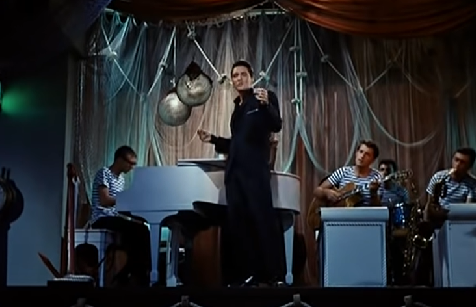 Presley enthusiastically sang “Return to Sender.” In that general spirit, the Fifth Circuit affirmed a disgorgement award in SEC v. Blackburn when “[f]irst, the disgorgement amounts are the profits defendants received from their securities fraud,” and “[s]econd, the district court concluded that the SEC has identified the victims and created a process for the return of disgorged funds” to the victims. (emphasis added). In so doing, the SEC avoided the “the issue [Liu v. SEC, 140 S. Ct. 1936 (2020)] left open: whether
Presley enthusiastically sang “Return to Sender.” In that general spirit, the Fifth Circuit affirmed a disgorgement award in SEC v. Blackburn when “[f]irst, the disgorgement amounts are the profits defendants received from their securities fraud,” and “[s]econd, the district court concluded that the SEC has identified the victims and created a process for the return of disgorged funds” to the victims. (emphasis added). In so doing, the SEC avoided the “the issue [Liu v. SEC, 140 S. Ct. 1936 (2020)] left open: whether
disgorgement is ‘awarded for victims’ when the money is put into a
Treasury fund that helps “pay whistleblowers reporting securities fraud and
to fund the activities of the Inspector General.” No. 20-30464 (Oct. 12, 2021).
The fantastically controversial Texas abortion statute returned to the Fifth Circuit, which granted an administrative stay on Friday, October 8, while it receives further briefing about a stay during the appeal of Judge Pittman’s preliminary-injunction order. Enthusiasts of court history will note that the motions panel —
 bears substantial similarity to the original panel in what led to the 2021 Supreme Court opinion in Collins v. Yellen. The panel divided 2-1 (Judges Haynes and Stewart, joining) about the constitutional problem with Fannie Mae’s regulator, and then again divided 2-1 (Judges Haynes and Willett, joining) about the proper remedy:
bears substantial similarity to the original panel in what led to the 2021 Supreme Court opinion in Collins v. Yellen. The panel divided 2-1 (Judges Haynes and Stewart, joining) about the constitutional problem with Fannie Mae’s regulator, and then again divided 2-1 (Judges Haynes and Willett, joining) about the proper remedy:
 Johnson alleged that BOKF’s collection of “extended overdraft charges” (fees charged to customers who overdraw on their checking accounts and fail to timely pay the bank for covering the overdraft) were “interest” within the meaning of the National Bank Act. The Fifth Circuit rejected her claim, giving Auer deference to an interpretive letter of the Office of the Comptroller of the Currency, and noting as to the relevant considerations:
Johnson alleged that BOKF’s collection of “extended overdraft charges” (fees charged to customers who overdraw on their checking accounts and fail to timely pay the bank for covering the overdraft) were “interest” within the meaning of the National Bank Act. The Fifth Circuit rejected her claim, giving Auer deference to an interpretive letter of the Office of the Comptroller of the Currency, and noting as to the relevant considerations:
- Authoritative. The letter was drafted by the OCC’s chief counsel, in response to a bank’s request for OCC guidance, and thus “bears the hallmarks of an official interpretation by OCC.”
- Within the agency’s substantive expertise. OCC administers the National Bank Act, the letter “appears aimed at providing assurance to regulated parties,” and did not appear to merely take a “convenient litigating position.”
- Fair and considered judgment. The letter “is neither plainly erroneous nor inconsistent with the regulations it interprets.”
No. 18-11375 (Sept. 29, 2021).
“[T]he district court erred by failing to give notice to the parties. We ask, then, whether that error was harmless. Lexon argues that, had it received notice, it would have submitted different evidence of the value of its ‘lost collateral’—less than the full amount of the letters of credit. Lexon argues that the lost collateral, while perhaps not being worth the full value of the letters of credit, ‘had at least some economic value.’ However, Lexon never pleaded nor argued in the district court that its damages could be anything less than the full value of the letters of credit—$9,985,500. If the district court did not have an opportunity to rule on an argument, we will not address it on appeal.” Lexon Ins. Co. v. FDIC, No. 20-30173 (Aug. 2, 2021) (footnote and citation omitted) (emphasis added).
 In Jungian psychology, the “Trickster” archetype (right) has been called “the embodiment of ambiguity.” In McDonnel Group, LLC v. Jung, LLC, the Fifth Circuit found an embodiment of ambiguity in an insurance policy provision that defined the flood-damage deductible as:
In Jungian psychology, the “Trickster” archetype (right) has been called “the embodiment of ambiguity.” In McDonnel Group, LLC v. Jung, LLC, the Fifth Circuit found an embodiment of ambiguity in an insurance policy provision that defined the flood-damage deductible as:
“5% of the total insured values at risk at the time and place of loss subject to a $500,000 minimum deduction as respects … FLOOD.”
The Court observed that “the plaintiffs read the deductible as saying ‘5% of the total insured values at risk … as respects FLOOD,'” and that “the insurers read the provision as ‘5% of the total insured values at risk at the time and place of loss, subject to a $500,000 minimum deduction … as respects FLOOD.” In other words: “[U]nder the plaintiffs’ theory, ‘as respects FLOOD’ modifies ‘total insured values at risk,'” while “[u]nder the insurer’s theory, ‘as respects FLOOD’ pertains only to the ‘$500,000 minimum deduction.'” The Court concluded that “[b]oth parties’ interpretations are reasonable, so the policy is ambiguous.” No. 20-30140 (Sept. 24, 2021).
 The United States successfully seized the M/Y Galactic Star, a valuable yacht, in connection with a massive bribery scheme involving Nigerian government officials. The Fifth Circuit agreed with the district court that the majority shareholder of the yacht’s corporate owner lacked standing to complain: “LightRay chose to maintain Earnshaw as a separate corporate entity, thereby securing all the attendant advantages of doing so, including an attempt by its principals to support the argument that LightRay is an innocent owner. We agree with the Eighth Circuit that ‘[a] court of equity will not disregard a corporation’s exclusive ownership of assets and claims ‘where those in control have deliberately adopted the corporate form in order to secure its advantages.’'” United States v. The M/Y Galactic Star, No. 20-20471 (Sept. 13, 2021) (citations omitted).
The United States successfully seized the M/Y Galactic Star, a valuable yacht, in connection with a massive bribery scheme involving Nigerian government officials. The Fifth Circuit agreed with the district court that the majority shareholder of the yacht’s corporate owner lacked standing to complain: “LightRay chose to maintain Earnshaw as a separate corporate entity, thereby securing all the attendant advantages of doing so, including an attempt by its principals to support the argument that LightRay is an innocent owner. We agree with the Eighth Circuit that ‘[a] court of equity will not disregard a corporation’s exclusive ownership of assets and claims ‘where those in control have deliberately adopted the corporate form in order to secure its advantages.’'” United States v. The M/Y Galactic Star, No. 20-20471 (Sept. 13, 2021) (citations omitted).
 Forby v. One Technologies presented the unusual situation of an arbitration waiver by the defendant, followed by an arbitration waiver the plaintiff as to a newly asserted claim: “We again address a class action claiming that One Technologies, L.P. (“One Tech”), duped consumers into signing up for ‘free’ credit reports that were not really free. The last time around, we ruled One Tech waived its right to arbitrate the plaintiffs’ state-law claims. Forby v. One Technologies., 909 F.3d 780 (5th Cir. 2018) [hereinafter Forby I]. Now, we consider whether One Tech also waived its right to arbitrate federal claims added after remand. Adhering to our precedent that waivers of arbitral rights are evaluated on a claim-by-claim basis, see Subway Equip. Leasing Corp. v. Forte, 169 F.3d 324, 328 (5th Cir. 1999), we hold that One Tech did not waive its right to arbitrate the new federal claims.” No. 20-10088 (Sept. 14, 2021) (citing, inter alia, Collado v. J&G Transp., Inc., 820 F.3d 1256 (11th Cir. 2016)).
Forby v. One Technologies presented the unusual situation of an arbitration waiver by the defendant, followed by an arbitration waiver the plaintiff as to a newly asserted claim: “We again address a class action claiming that One Technologies, L.P. (“One Tech”), duped consumers into signing up for ‘free’ credit reports that were not really free. The last time around, we ruled One Tech waived its right to arbitrate the plaintiffs’ state-law claims. Forby v. One Technologies., 909 F.3d 780 (5th Cir. 2018) [hereinafter Forby I]. Now, we consider whether One Tech also waived its right to arbitrate federal claims added after remand. Adhering to our precedent that waivers of arbitral rights are evaluated on a claim-by-claim basis, see Subway Equip. Leasing Corp. v. Forte, 169 F.3d 324, 328 (5th Cir. 1999), we hold that One Tech did not waive its right to arbitrate the new federal claims.” No. 20-10088 (Sept. 14, 2021) (citing, inter alia, Collado v. J&G Transp., Inc., 820 F.3d 1256 (11th Cir. 2016)).
 Despite the defeat of the Moorish armies in 732 by Charles Martel at the Battle of Tours (right), the appellants in Luminant Mining Co. v. PakeyBey asserted rights as cotenants to certain real property in East Texas as “’Moorish Americans’ who are ‘sovereign freemen under the Republic . . . .'” The Fifth Circuit affirmed judgment for the appellees, concluding: “[T]the PakeyBey parties contend that Luminant failed to demonstrate hostile possession vis-à-vis its cotenants. They assert that the record is devoid of evidence of actual notice of repudiation of the common title. They further contend that Luminant cannot show constructive notice of repudiation, arguing that constructive notice and ouster require more than Luminant’s demonstrated possession of the land and the absence of a claim against the land by Walling’s heirs. Their argument rests on a correct reading of the law, up to a point. (citation omitted) But Luminant’s possession and Luminant’s recorded deeds are sufficient to give constructive notice of hostility to cotenants and to effect an ouster.” No. 20-40803 (Sept. 17, 2021).
Despite the defeat of the Moorish armies in 732 by Charles Martel at the Battle of Tours (right), the appellants in Luminant Mining Co. v. PakeyBey asserted rights as cotenants to certain real property in East Texas as “’Moorish Americans’ who are ‘sovereign freemen under the Republic . . . .'” The Fifth Circuit affirmed judgment for the appellees, concluding: “[T]the PakeyBey parties contend that Luminant failed to demonstrate hostile possession vis-à-vis its cotenants. They assert that the record is devoid of evidence of actual notice of repudiation of the common title. They further contend that Luminant cannot show constructive notice of repudiation, arguing that constructive notice and ouster require more than Luminant’s demonstrated possession of the land and the absence of a claim against the land by Walling’s heirs. Their argument rests on a correct reading of the law, up to a point. (citation omitted) But Luminant’s possession and Luminant’s recorded deeds are sufficient to give constructive notice of hostility to cotenants and to effect an ouster.” No. 20-40803 (Sept. 17, 2021).
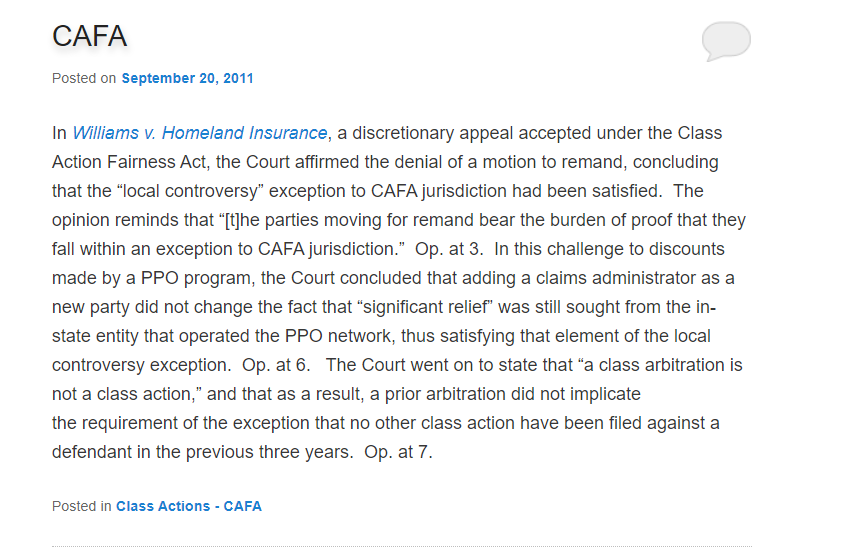 Ten years ago, I posted a short note about a CAFA case (right); today, I make the 1,957th post on this blog. Tomorrow, I’ll make the 1,958th — blogging is a road traveled one case at a time. Publishing this blog has been a fantastic journey and I appreciate everyone who has shared the ride so far.
Ten years ago, I posted a short note about a CAFA case (right); today, I make the 1,957th post on this blog. Tomorrow, I’ll make the 1,958th — blogging is a road traveled one case at a time. Publishing this blog has been a fantastic journey and I appreciate everyone who has shared the ride so far.
To celebrate this anniversary properly, I observe three 600Camp traditions:
- Valuable 600Camp Merchandise. Anyone who catches an error in a post goes on the list to receive valuable 600Camp merchandise. Unfortunately I do not yet have any merchandise, but I assure you that all such commitments will be duly honored at the earliest possible time.
 Update on the M/V OCEAN SHANGHAI. The 2013 case of Farenco Shipping Co. v. Farenco Shipping PTE, Ltd. produced the best mootness argument of all time — a case about the seizure of a marine vessel became moot once the ship had sailed. The M/V OCEAN SHANGHAI, recently renamed as SFERA, has avoided the Fifth Circuit’s waters ever since; as of September 18, 2021, it was transiting the Laccadive Sea south of Sri Lanka (right).
Update on the M/V OCEAN SHANGHAI. The 2013 case of Farenco Shipping Co. v. Farenco Shipping PTE, Ltd. produced the best mootness argument of all time — a case about the seizure of a marine vessel became moot once the ship had sailed. The M/V OCEAN SHANGHAI, recently renamed as SFERA, has avoided the Fifth Circuit’s waters ever since; as of September 18, 2021, it was transiting the Laccadive Sea south of Sri Lanka (right).- Creole Recipe. The Fifth Circuit is blessed to be headquartered in the culturally rich city of New Orleans; to celebrate 600Camp’s birthday properly, I recommend the Artisanal Eggs Benedict at Brennan’s.
In light of the recent, intense debate about principles of “textualism” in Hewitt v. Helix Energy, it seemed a good time to revisit this classic meme:
The Fifth Circuit recently released its opinion on the emergency-stay motions of early September in the high-profile challenge to Texas’s “heartbeat law,” Whole Womens Health v. Jackson, No. 21-50792 (Sept. 10, 2021). In addition to identifying problems with the application of Ex parte Young, the Court observed: “We do not even take into account the many other justiciability defenses Defendants have raised beyond Young. Defendants have argued powerfully that, not only do they enjoy Eleventh Amendment immunity, but federal jurisdiction is also lacking under Article III. Related doctrines of standing, ripeness, and justiciability are also likely to prevail because these Plaintiffs have no present or imminent injury from the enactment of S.B 8.”
 In reviewing a claim of improper joinder, a court may “conduct a Rule 12(b)(6)-type analysis” to determine if the claim against the in-state defendant “is plausible on its face.”
In reviewing a claim of improper joinder, a court may “conduct a Rule 12(b)(6)-type analysis” to determine if the claim against the in-state defendant “is plausible on its face.”- Alternatively, if “discrete and undisputed facts . . . would preclude plaintiff’s recovery against the in-state defendant,” then “the district court may, in its discretion, pierce the pleadings and conduct a summary inquiry.”
- But, “unlike summary judgment, which can be granted when there is ‘lack of substantive evidence’ to support a plaintiff’s claim, improper joinder requires the defendant to ‘put forward evidence that would negate a possibility of liability on the part of ‘ the in-state defendant.
Accordingly, the Fifth Circuit reversed a finding of improper joinder in Hicks v. Martinrea Automotive Structures (USA), Inc., No. 20-60926 (Sept. 7, 2021), noting that the defendant’s argument about the tortious-interference element of malice “rel[ies] on evidence developed during merits discovery, which is far afield from Rule 12(b)(6) [and] the evidence they cite relates to the crucial question of Clark’s motive in terminating Hicks.” No. 20-60926 (Sept. 7, 2021).
The en banc court divided along atypical lines in Hewitt v. Helix Energy, a dispute about overtime-pay obligations for highly compensated employees in the oil-and-gas industry. The Texas Lawbook and Houston Chronicle have covered the opinion thoroughly; below is a chart showing which judges joined the majority opinion and which judges dissented in some way. Note that Senior Judge Wiener participated in this en banc case because he was part of the original panel.
Longtime observers of the Court may see echoes of the divided en banc court in Mississippi Poultry Ass’n v. Madigan, 31 F.3d 293 (5th Cir. 1994) (en banc), a dispute about the import of the word “same” in the Poultry Products Inspection Act.
 A chapter of the United Daughters of the Confederacy complained about the recent removal of a statue of a Confederate soldier from a San Antonio park. The Fifth Circuit affirmed the dismissal of its claim, observing (1) an 1899 document relating to the construction of the statue did not create a conveyance or use privilege for the relevant land; and (2) if it had done so, any such conveyance expired when an earlier chapter that actually received the document ceased operations in 1972, without conveying any such interest to its successor. Albert Sidney Johnston Chapter, Chapter No. 2060, UDC v. City of San Antonio, No. 20-50155 (Aug. 25, 2021).
A chapter of the United Daughters of the Confederacy complained about the recent removal of a statue of a Confederate soldier from a San Antonio park. The Fifth Circuit affirmed the dismissal of its claim, observing (1) an 1899 document relating to the construction of the statue did not create a conveyance or use privilege for the relevant land; and (2) if it had done so, any such conveyance expired when an earlier chapter that actually received the document ceased operations in 1972, without conveying any such interest to its successor. Albert Sidney Johnston Chapter, Chapter No. 2060, UDC v. City of San Antonio, No. 20-50155 (Aug. 25, 2021).
 There’s always “that” customer, who brings rude remarks and behavior along with repeat business. In Sansone v. Jazz Casino Co., No. 20-30640 (Sept. 1, 2021), “that” customer led to a prima facie case about a hostile work environment: “The unidentified Harrah’s customer frequently asked Sansone about her sex life and expressed his desire to sleep with her. He commented on her breasts and physical appearance and directed sexual gestures towards her. His comments were made in the presence of others and occurred at least two times a week for a significant period of time. This contrasts with instances where we have held a smaller stint within a lengthy period of employment was not sufficiently pervasive to support a hostile work environment claim.” (citations omitted, applying Farpella-Crosby v. Horizon Health Care, 97 F.3d 803, 806 (5th Cir. 1996)).
There’s always “that” customer, who brings rude remarks and behavior along with repeat business. In Sansone v. Jazz Casino Co., No. 20-30640 (Sept. 1, 2021), “that” customer led to a prima facie case about a hostile work environment: “The unidentified Harrah’s customer frequently asked Sansone about her sex life and expressed his desire to sleep with her. He commented on her breasts and physical appearance and directed sexual gestures towards her. His comments were made in the presence of others and occurred at least two times a week for a significant period of time. This contrasts with instances where we have held a smaller stint within a lengthy period of employment was not sufficiently pervasive to support a hostile work environment claim.” (citations omitted, applying Farpella-Crosby v. Horizon Health Care, 97 F.3d 803, 806 (5th Cir. 1996)).
“When reviewing for abuse of discretion, we will reverse a district court’s refusal to give a requested jury instruction ‘only if the instruction (1) was a substantially correct statement of law, (2) was not substantially covered in the charge as a whole, and (3) concerned an important point in the trial such that the failure to instruct the jury on the issue seriously impaired the [party’s] ability to present a given [claim].'” (citations omitted). In HTC Corp. v. Telefonaktiebolaget LM Ericsson, while the panel divided 2-1 about whether a requested instruction was accurate, all three judges agreed that the appellant was not “seriously impaired” at trial by its absence. No. 19-40566 (Aug. 31, 2021).
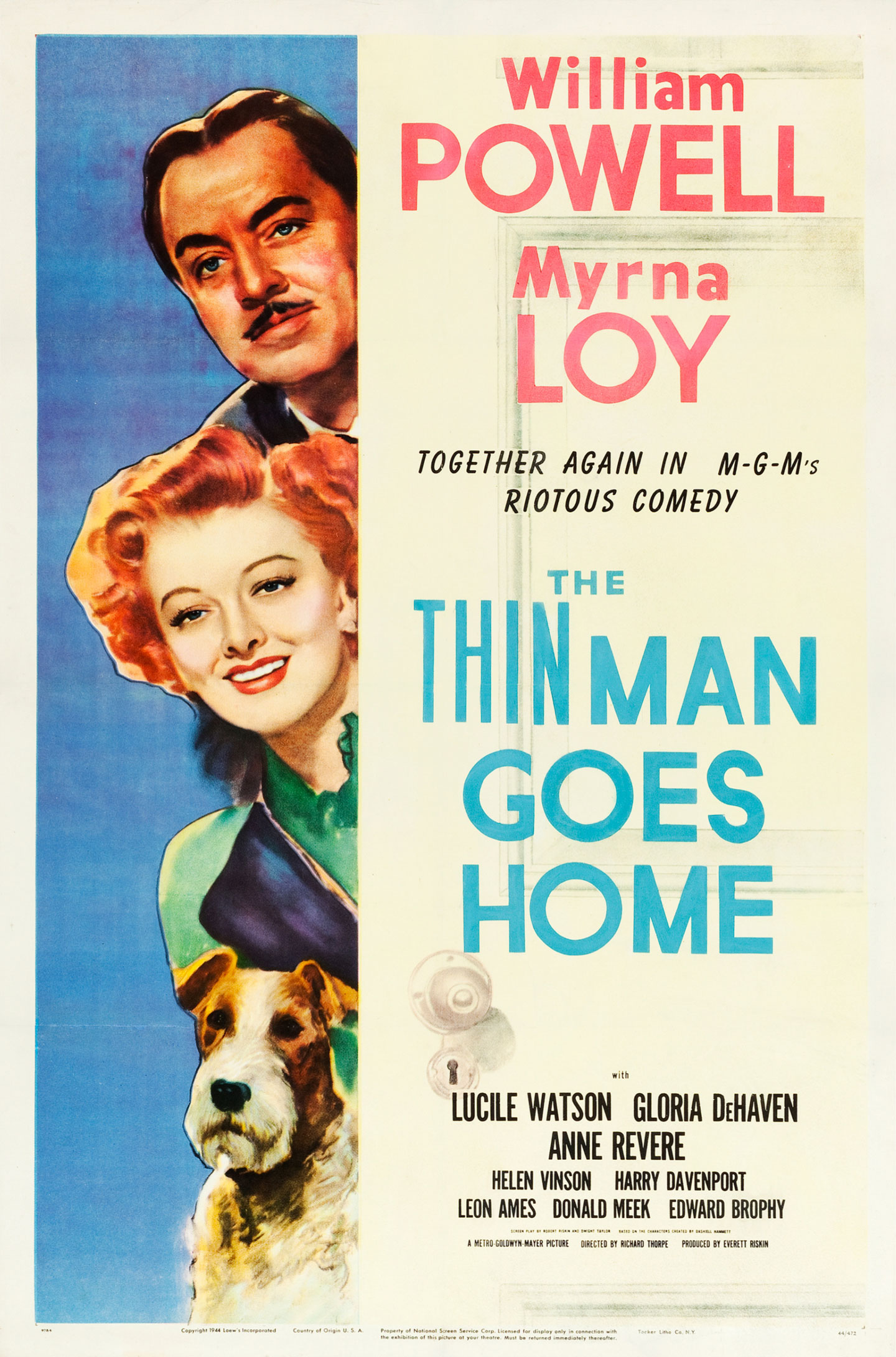 CAFA creates an exception to federal class-action jurisdiction if, among other requirements, “the primary defendants[] are citizens of the State in which the action was originally filed.” Recognizing a lack of clear authority about the meaning of “primary defendant,” the Fifth Circuit reasoned that “there is much to commend the [Third Circuit’s] emphasis on the ‘real target’ of the litigation and [this Court’s] description of the controversy’s ‘primary thrust.'” Madison v. ADT, LLC, No. 21-90028 (Aug. 24, 2021).
CAFA creates an exception to federal class-action jurisdiction if, among other requirements, “the primary defendants[] are citizens of the State in which the action was originally filed.” Recognizing a lack of clear authority about the meaning of “primary defendant,” the Fifth Circuit reasoned that “there is much to commend the [Third Circuit’s] emphasis on the ‘real target’ of the litigation and [this Court’s] description of the controversy’s ‘primary thrust.'” Madison v. ADT, LLC, No. 21-90028 (Aug. 24, 2021).
“We are … persuaded that, under Texas law, undercapitalization alone would not be sufficient to pierce the corporate veil.” Ledford v. Keen, No. 20-50650 (applying, inter alia, Ramirez v. Hariri, 165 S.W.3d 912, 916 (Tex. App.–Dallas 2005, no pet.)).
Zurich won an insurance coverage dispute with Maxim Crane. On appeal, in addition to defending the merits, Zurich argued that the matter should be dismissed entirely because Maxim lacked standing. This argument led to the question whether a cross-appeal was needed to make that point, and the Fifth Circuit concluded:
… although our judgment would be different if we credited Zurich’s standing argument, that does not mean that Zurich needed to file a cross-appeal to present that argument. To be sure, as a matter of standard appellate practice, “[m]any cases state the general rule that a cross-appeal is required to support modification of the judgment,” whereas “arguments that support the judgment as entered can be made without a cross-appeal.” (quoting [Wright & Miller]). But this case falls within an exception to that general rule. A cross-appeal “is not necessary to challenge the subject-matter jurisdiction of the district court, under the well-established rule that both district court and appellate courts are obliged to raise such questions on their own initiative.” Id.
Maxim Crane Works LP v. Zurich Am. Ins. Co., No. 19-20489 (Aug. 20, 2021) (ultimately, certifying the underlying coverage issue to the Texas Supreme Court).
The practical problems cause by conversion of a Rule 12 motion to one for summary judgment were examined in Lexon Ins. Co. v. FDIC, where the nonmovant argued that “had it received [proper] notice, it would have submitted different evidence of the value of its ‘lost collateral,'” but the Fifth Circuit rejected that argument because the nonmovant “never pleaded nor argued in the district court that its damages could be anything less than the full value of the letters of credit ….” No. 20-30173 (Aug. 2, 2021).
 The Texas Supreme Court’s longtime staff attorney for public information, Osler McCarthy, retires on August 31 after many years of dedicated service. I wanted to salute his hard work and share a well-written tribute to him recently prepared by former Chief Justice Wallace Jefferson.
The Texas Supreme Court’s longtime staff attorney for public information, Osler McCarthy, retires on August 31 after many years of dedicated service. I wanted to salute his hard work and share a well-written tribute to him recently prepared by former Chief Justice Wallace Jefferson.
The Fifth Circuit found that Petrobras did not have sufficient knowledge of a potential claim to trigger limitations in Petrobras America, Inc. v. Samsung Heavy Indus. Co., holding:
- two officers “acted in their own interests by accepting $10 million in bribes . . . [t]hus, [they] are clearly adverse agents of Petrobras. Their knowledge cannot be imputed to Petrobras.”;
- “an ujnfavorable contract alone is not a legally cognizable injury”;
- statements in SEC filings about the general topic of bribery, when they involved “separate bribery schemes [that] involved separate parties, separate contracts, and separate ships,” “at best raise fact questions not suitable for disposition under Rule 12(b)(6).”
No. 20-20339 (Aug. 11, 2021).
The Fifth Circuit reversed the Rule 12 dismissal of a Lanham Act case in which “Plaintiffs allege that Defendants purchased trademark terms as keywords for search-engine advertising, then placed generic advertisements that confused customers as to whether the advertisements belonged to or were affiliated with the Plaintiffs.” Adler v. McNeil Consultants, No. 20-10936 (Aug. 10, 2021) (LPHS represented the appellee in this matter).
 Season Two of the “Coale Mind” podcast begins by returning to an earlier episode about the Supreme Court’s review of high-profile Fifth Circuit cases — “Is the Fifth Circuit More Conservative than the Roberts Court: Revisited.” I hope you have a chance to listen!
Season Two of the “Coale Mind” podcast begins by returning to an earlier episode about the Supreme Court’s review of high-profile Fifth Circuit cases — “Is the Fifth Circuit More Conservative than the Roberts Court: Revisited.” I hope you have a chance to listen!
 A triable fact issue on the issue of pretext arose in Lindsey v. Bio-Medical Applications: “As anyone who has ever worked in an office environment can attest, there are real deadlines and hortatory ones—and everyone understands the difference between the two. Missing real deadlines results in actual adverse consequences for employer and employee alike—while failing to meet hortatory deadlines does not. BMA does not point to any adverse impact that Lindsey’s tardy reports had on the company. And in any event, there is no evidence BMA ever warned Lindsey that failure to submit the reports on time could jeopardize her job. So there is a genuine issue of material fact as to whether BMA’s assertion that it fired Lindsey for this reason is ‘unworthy of credence.'” No. 20-30289 (Aug. 16, 2021).
A triable fact issue on the issue of pretext arose in Lindsey v. Bio-Medical Applications: “As anyone who has ever worked in an office environment can attest, there are real deadlines and hortatory ones—and everyone understands the difference between the two. Missing real deadlines results in actual adverse consequences for employer and employee alike—while failing to meet hortatory deadlines does not. BMA does not point to any adverse impact that Lindsey’s tardy reports had on the company. And in any event, there is no evidence BMA ever warned Lindsey that failure to submit the reports on time could jeopardize her job. So there is a genuine issue of material fact as to whether BMA’s assertion that it fired Lindsey for this reason is ‘unworthy of credence.'” No. 20-30289 (Aug. 16, 2021).
The provocatively named book “Hooker to Looker: a makeup guide for the not so easily offended” (video summary available here) gave rise to a dispute about the preemptive force of the Copyright Act, which the Fifth Circuit resolved in favor of preemption by looking to:
- Factual allegations. “Although Di Angelo muddles its complaint with contract allegations aplenty, it also alleges that it ‘acquired copyrights in the [B]ook’ by ‘writing, editing, planning and taking all photographs and making all illustrations, and planning, designing, and arranging the layout of the [B]ook.’ … Although the complaint uses neither the term joint work” nor “co-author,” it is nigh impossible to read Di Angelo’s allegations … without concluding that Di Angelo is alleging, at minimum, co-authorship of the Book.”
- The parties’ contract. “The Contract does not define author, and the word’s common meaning can apply to multiple parties who collaboratively engage in producing one creative work, a possibility expressly contemplated by copyright law. And contrary to Kelley’s suggestion, the terms of the Contract lend some support to the notion that the Book would be produced collaboratively.” (footnote omitted).
- Requested relief. “[A] declaration of Di Angelo’s copyright in the updated work could permit it to exercise rights with respect to that work that it would not enjoy under the Contract. For instance, a declaration could allow Di Angelo to profit from the Book’s update, which according to its state court complaint, Kelley currently
prevents it from doing.”
Di Angelo Publications, Inc., No. 20-20523 (Aug. 12, 2021).
 Under Texas insurance law: “Payment and acceptance of an appraisal award means there is nothing left for a breach of contract claim seeking those same damages. But a plaintiff may still have a claim under the prompt payment law after it accepts an appraisal award. The Supreme Court of Texas recently held that even a preappraisal payment that seemed reasonable at the time does not bar a prompt-payment claim if it does not ‘roughly correspond’ to the amount ultimately owed.” Randel v. Travelers Lloyds, No. 20-20567 (Aug. 12, 2021).
Under Texas insurance law: “Payment and acceptance of an appraisal award means there is nothing left for a breach of contract claim seeking those same damages. But a plaintiff may still have a claim under the prompt payment law after it accepts an appraisal award. The Supreme Court of Texas recently held that even a preappraisal payment that seemed reasonable at the time does not bar a prompt-payment claim if it does not ‘roughly correspond’ to the amount ultimately owed.” Randel v. Travelers Lloyds, No. 20-20567 (Aug. 12, 2021).
The plaintiffs in Turner v. Cincinnati Ins. Co. obtained a “non-adversarial” default judgment against a defunct vocational school. The Fifth Circuit found that Texas’s “no-direct action” rule did not bar their claim against the school’s insurer: “[T]he Plaintiffs’ default judgment against ATI is an adjudication that satisfies the no-action clause. Accordingly, although the non-adversarial default judgment does not bind Cincinnati to its terms, the no-direct-action rule is not a bar to this coverage suit.” (citation omitted). (Unfortunately for the plaintiffs, the Court then affirmed the dismissal of their claim on timeliness grounds.) No. 20-50548 (Aug. 13, 2021).
The Fifth Circuit affirmed a jurisdiction-based collateral attack on a judgment in Bessie Jeanne Worthy Revocable Trust, reasoning that in the prior litigation, “the Estate’s Texas citizenship defeated diversity among the parties,” creating a “‘total want of jurisdiction’ to enter judgment[.]” No. 20-10492 (Aug. 10, 2021). In so doing, the Court distinguished Picco v. Global Marine Drilling Co., 900 F.2d 846 (5th Cir. 1990), as turning on a distinct question about the effect of the automatic bankruptcy stay. The able Rory Ryan from Baylor’s law school cautions against an overly broad reading of this new opinion.
 To illustrate a point about the risks of unbounded judicial discretion, the Fifth Circuit quoted a well-known gorilla joke in Rollins v. Home Depot USA, No. 20-50736 (Aug. 9, 2021):
To illustrate a point about the risks of unbounded judicial discretion, the Fifth Circuit quoted a well-known gorilla joke in Rollins v. Home Depot USA, No. 20-50736 (Aug. 9, 2021):
 Counsel failed to file a summary-judgment response because his notification of filing went to his email “spam” folder. The Fifth Circuit affirmed the denial of relief under Fed. R. Civ. P. 59(e):
Counsel failed to file a summary-judgment response because his notification of filing went to his email “spam” folder. The Fifth Circuit affirmed the denial of relief under Fed. R. Civ. P. 59(e):
“It is not ‘manifest error to deny relief when failure to file was within [Rollins’s] counsel’s ‘reasonable control.’ Notice of Home Depot’s motion for summary judgment was sent to the email address that Rollins’s counsel provided. Rule 5(b)(2)(E) provides for service ‘by filing [the pleading] with the court’s electronic-filing system’ and explains that ‘service is complete upon filing or sending.’ That rule was satisfied here. Rollins’s counsel was plainly in the best position to ensure that his own email was working properly—certainly more so than either the district court or Home Depot. Moreover, Rollins’s counsel could have checked the docket after the agreed deadline for dispositive motions had already passed.”
Rollins v. Home Depot USA, No. 20-50736 (Aug. 9, 2021).
 “‘Lost debt’ cases present a unique type of claim. They allege ‘a RICO violation whose central purpose [i]s to prevent the collection of a claim or judgment.’ The substantive RICO violation is the act of preventing collection. And the plaintiff’s injury is the inability to collect the lawful debt. So, when the plaintiff successfully recovers that debt, it is no longer lost. And because that unrecovered debt is the only source of the plaintiff’s injury, there is no RICO claim in its absence. As a result, a plaintiff cannot rely on its lost debt to animate a RICO suit after it has recovered that debt. The ‘debt is “lost” and thereby
“‘Lost debt’ cases present a unique type of claim. They allege ‘a RICO violation whose central purpose [i]s to prevent the collection of a claim or judgment.’ The substantive RICO violation is the act of preventing collection. And the plaintiff’s injury is the inability to collect the lawful debt. So, when the plaintiff successfully recovers that debt, it is no longer lost. And because that unrecovered debt is the only source of the plaintiff’s injury, there is no RICO claim in its absence. As a result, a plaintiff cannot rely on its lost debt to animate a RICO suit after it has recovered that debt. The ‘debt is “lost” and thereby
becomes a basis for RICO trebling only if the debt (1) cannot be collected (2)
“by reason of” a RICO violation.’ ‘In other words, to the extent of a successful collection, the RICO claim is abated pro tanto, prior to any application of trebling.'” HCB Fin. Corp. v. McPherson, No. 20-50718 (Aug. 4, 2021) (citations omitted). Put another way: “There must be independent damages to treble; the possibility of treble damages alone cannot confer statutory RICO standing.”
 A recent antitrust case reminds of an important but infrequently-litigated point about the review of pleadings in the context of a motion to dismiss: “If an attached exhibit contradicts a factual allegation in the complaint, ‘then indeed the exhibit and not the allegation controls.'” Quadvest LP v. San Jacinto River Auth., No. 20-20447 (Aug. 3, 2021).
A recent antitrust case reminds of an important but infrequently-litigated point about the review of pleadings in the context of a motion to dismiss: “If an attached exhibit contradicts a factual allegation in the complaint, ‘then indeed the exhibit and not the allegation controls.'” Quadvest LP v. San Jacinto River Auth., No. 20-20447 (Aug. 3, 2021).
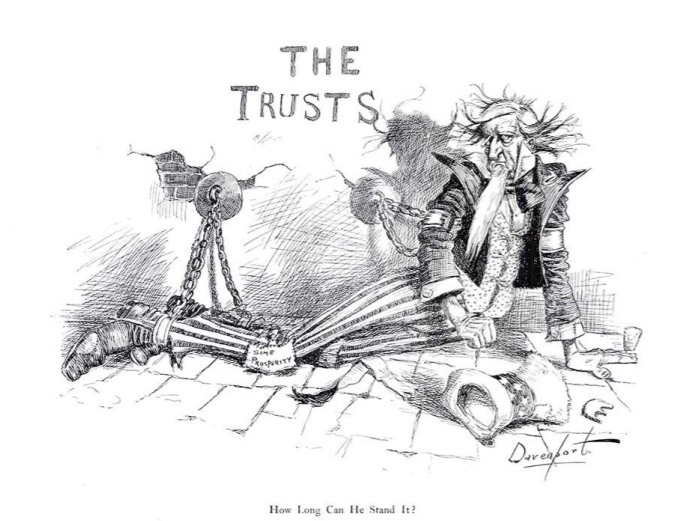 The plaintiffs in Quadvest LP v. San Jacinto River Auth. alleged that a state-created river authority violated Section 1 of the Sherman Act by unreasonably restraining the market for wholesale raw water in Montgomery County. Procedurally, the Fifth Circuit concluded that the denial of the authority’s motion to dismiss on immunity grounds was appealable under Circuit precedent (acknowledging that the Fifth Circuit is an outlier on this point). Substantively, the Court affirmed the denial of the authority’s motion “at this stage” of the case, concluding that “the Texas Legislature did not authorize [the authority’s] entry into and enforcement of the challenged [contract] provisions with the intent to displace competition in the market for wholesale raw water in Montgomery County.” No. 20-20447 (August 5, 2021).
The plaintiffs in Quadvest LP v. San Jacinto River Auth. alleged that a state-created river authority violated Section 1 of the Sherman Act by unreasonably restraining the market for wholesale raw water in Montgomery County. Procedurally, the Fifth Circuit concluded that the denial of the authority’s motion to dismiss on immunity grounds was appealable under Circuit precedent (acknowledging that the Fifth Circuit is an outlier on this point). Substantively, the Court affirmed the denial of the authority’s motion “at this stage” of the case, concluding that “the Texas Legislature did not authorize [the authority’s] entry into and enforcement of the challenged [contract] provisions with the intent to displace competition in the market for wholesale raw water in Montgomery County.” No. 20-20447 (August 5, 2021).
Two rulings about the crime-fraud exception to the attorney-client privilege were recently reversed, by both the Fifth Circuit and Dallas’s Fifth District, in response to mandamus petitions. (This is a cross-post with 600commerce.com.)
- In the Fifth Circuit: “[A]s Boeing argues, the district court clearly erred in finding that Plaintiffs established a prima facie case that the contested documents were subject to the crime-fraud exception. The district court concluded that the contested documents were reasonably connected to the fraud based on one finding only—that the documents sought ‘f[e]ll within the period Boeing admit to hav[ing] knowingly and intentionally committed “fraud” in the DPA. However, a temporal nexus between the contested documents and the fraudulent activity alone is insufficient to satisfy the second element for a prima facie showing that the crime-fraud exception applies.” In re The Boeing Co., No. 21-40190 (July 29, 2021, unpublished).
- In the Fifth District, the Court noted: “[A] determination at the TCPA stage as to a prima facie showing does not automatically translate to a prima facie showing for purposes of application of the crime–fraud exception to the attorney–client privilege. The exception UDF attempts to invoke is for crime–fraud, not crime–tort.” From there, it declined to follow a broad view of the exception defined by another Texas intermediate court, “and note that, notwithstanding certain language in the [relevant] opinion, the El Paso court continues to apply the elements of common-law fraud when determining the applicability of the crime fraud exception, rather than requiring proof of a false statement only.” In re Bass, No. 05-21-00102-CV (July 30, 2021) (mem. op.).
A long-running discovery dispute in Texas state court led to a contempt order, which in turn led to a federal-court habeas action. The Fifth Circuit noted that habeas relief was potentially available under the Antiterrorism and Effective Death Penalty Act of 1996, as codified in 28 U.S.C. § 2254, under which:
… if an adequate state ‘corrective process’ for raising a claim exists that the petitioner could avail him or herself of, a federal court may only consider the claim if the petitioner has exhausted available state remedies. And when the petitioner has done so and the state court has rejected the claim on the merits, federal courts may provide relief only when the state court adjudication was either ‘contrary to, or involved an unreasonable application of, clearly established Federal law, as determined by the Supreme Court of the United States,’ or ‘based on an unreasonable determination of the facts in light of the evidence presented in the State court proceeding.’
(citations omitted). Among other observations, the Court held: “A rule that due process does not permit the use of civil contempt to compel the production of documents that are in the hands of third parties would also overturn longstanding precedents and would likely be unworkable in practice.” Topletz v. Skinner, No. 20-40136 (July 30, 2021).
 “While litigants should, when possible, identify specific contractual provisions alleged to have been breached, Rule 8 does not require that level of granularity. ‘So long as a pleading alleges facts upon which relief can be granted, it states a claim even if it “fails to categorize correctly the legal theory giving rise to the claim.”‘ ” (citations omitted).
“While litigants should, when possible, identify specific contractual provisions alleged to have been breached, Rule 8 does not require that level of granularity. ‘So long as a pleading alleges facts upon which relief can be granted, it states a claim even if it “fails to categorize correctly the legal theory giving rise to the claim.”‘ ” (citations omitted).- That said — “That the pleading was sufficient in this contract dispute, governed by an agreement neither exceedingly long nor rife with addenda, exhibits, and multiple parts, does not mean that Rule 8 would necessarily be satisfied by general allegations involving more complex contracts.”
Sanchez Oil & Gas Corp. v. Crescent Drilling & Prod., Inc., No. 20-20304 (July 30, 2021).
 The key contract provision in Papalote Creek II LLC v. Lower Colorado River Authority said that “[LCRA]’s damages for failure to perform its material obligations under this Agreement shall likewise be limited in the aggregate to sixty million dollars ($60,000,000).” The Fifth Circuit concluded that read in context, this provision referred to damages that LCRA would owe to Papalote (acknowledging authority that, in the abstract, would suggest damages that LCRA would be owed).
The key contract provision in Papalote Creek II LLC v. Lower Colorado River Authority said that “[LCRA]’s damages for failure to perform its material obligations under this Agreement shall likewise be limited in the aggregate to sixty million dollars ($60,000,000).” The Fifth Circuit concluded that read in context, this provision referred to damages that LCRA would owe to Papalote (acknowledging authority that, in the abstract, would suggest damages that LCRA would be owed).
The Court went on to conclude that this provision capped damages available under a specific liquidated-damages provision, finding that another clause dealing with those specific remedies did not displace the language of the cap (It said that “for any provision for which an express and exclusive remedy or measure of damages is provided, such express remedy or measure of damages shall be the sole and exclusive remedy, [and] the obligor’s liability shall be limited as set forth in such provision[.]”). No. 19-50850 (July 16, 2021).
The relevant policy language in a data-breach coverage dispute provided insurance for:
 In Landry’s, Inc. v. Ins. Co. of the State of Penn., the Fifth Circuit found that this language created coverage, observing, inter alia:
In Landry’s, Inc. v. Ins. Co. of the State of Penn., the Fifth Circuit found that this language created coverage, observing, inter alia:
- “Publication”: “[C]overage is triggered by a ‘publication, in any manner.’ It follows that the Policy intended to use every definition of the word ‘publication’—even the very broadest ones. And some of the dictionary definitions of ‘publication’ are quite broad.”
- Scope: “[T]he Policy does not simply extend to violations of privacy rights; the Policy instead extends to all injuries that arise out of such violations. … [I]t’s undisputed that a person has a ‘right of privacy’ in his or her credit-card data.” (emphasis in original).
- Injury: “[E]veryone agrees that the facts alleged in the Paymentech complaint constitute an injury arising from the violation of customers’ privacy rights, as those terms are commonly understood. It does not matter that Paymentech’s legal theories sound in contract rather than tort. Nor does it matter that Paymentech (rather than individual customers) sued Landry’s. Paymentech’s alleged injuries arise from the violations of customers’ rights to keep their credit-card data private.”
 The Fifth Circuit rejected class claims about the handling of funds in an ERISA plan, identifying a basic standing problem arising from the links in the causal chain of the plaintiffs’ damages theory: “[Plaintiffs’] expert has provided calculations for the returns that they would have earned had they not invested in the FCU Option but had instead placed their money in a stable value fund. This ‘lost investment income’ is a ‘concrete’ and redressable injury for the purposes of standing. That said, another question we must ask is whether Plaintiffs would have in fact invested in a stable value fund to earn the higher returns had [Defendants] never offered the FCU Option. In other words, the question is whether Plaintiffs have demonstrated that it is ‘substantially probable that the challenged acts of the defendant, not of some . . . third party[]’ (including themselves) caused the injury. If anything, the record reveals that Plaintiffs would not have invested in a stable value fund in a counterfactual world since they did not place their money in one when given the opportunity to do so.” (citations omitted, emphasis added). Oritz v. American Airlines, No. 20-10817 (July 19, 2021).
The Fifth Circuit rejected class claims about the handling of funds in an ERISA plan, identifying a basic standing problem arising from the links in the causal chain of the plaintiffs’ damages theory: “[Plaintiffs’] expert has provided calculations for the returns that they would have earned had they not invested in the FCU Option but had instead placed their money in a stable value fund. This ‘lost investment income’ is a ‘concrete’ and redressable injury for the purposes of standing. That said, another question we must ask is whether Plaintiffs would have in fact invested in a stable value fund to earn the higher returns had [Defendants] never offered the FCU Option. In other words, the question is whether Plaintiffs have demonstrated that it is ‘substantially probable that the challenged acts of the defendant, not of some . . . third party[]’ (including themselves) caused the injury. If anything, the record reveals that Plaintiffs would not have invested in a stable value fund in a counterfactual world since they did not place their money in one when given the opportunity to do so.” (citations omitted, emphasis added). Oritz v. American Airlines, No. 20-10817 (July 19, 2021).
 In a will contest, “the district court determined that, because the claims against Craig and Alita were founded on a single deprivation, the loss of the transferred assets, joint and several liability is appropriate.” The Fifth Circuit agreed, quoting the Restatement (First) of Restitution section cited by the district court: “Where a claim against two persons is founded upon a single deprivation as it is where a tort resulting in a single harm has been committed by two persons concurrently or acting in cooperation, the injured person, while having a cause of action against each of the parties for the entire amount of injury, is entitled only to one satisfaction. If he obtains judgment against one and it is satisfied, he thereby loses his claim against the other.” (citation omitted). In other words, “this part of the Restatement ‘effectively imposes joint and several liability on a restitution defendant when the action is founded ‘upon a single deprivation.’” Great American Life v. Tanner, No. 20-60588 (July 16, 2021).
In a will contest, “the district court determined that, because the claims against Craig and Alita were founded on a single deprivation, the loss of the transferred assets, joint and several liability is appropriate.” The Fifth Circuit agreed, quoting the Restatement (First) of Restitution section cited by the district court: “Where a claim against two persons is founded upon a single deprivation as it is where a tort resulting in a single harm has been committed by two persons concurrently or acting in cooperation, the injured person, while having a cause of action against each of the parties for the entire amount of injury, is entitled only to one satisfaction. If he obtains judgment against one and it is satisfied, he thereby loses his claim against the other.” (citation omitted). In other words, “this part of the Restatement ‘effectively imposes joint and several liability on a restitution defendant when the action is founded ‘upon a single deprivation.’” Great American Life v. Tanner, No. 20-60588 (July 16, 2021).
In Spectrum Association Management of Texas v. Lifetime HOA Management LLC, the Fifth Circuit identified an “exceptional case” that justified an award of attorneys’ fees under the Anti-Cybersquatting Consumer Protection Act. The Court contrasted Kiva Kitchen & Bath Inc. v. Capital Distributing, Inc., 319 F. App’x 316 (5th Cir. 2009), observing:
“Like the defendants in Kiva, the Lifetime Defendants acted in bad faith by registering and using an infringing internet domain with the intent to divert a direct competitor’s potential customers to Lifetime’s website. Further, the facts of this case are even more egregious than Kiva, because the Lifetime Defendants never offered to transfer the Infringing Domain to Spectrum, whereas the Kiva defendants made such an offer to the plaintiff shortly before trial. Finally, the Lifetime Defendants engaged in post-trial misconduct by blatantly copying text from Spectrum’s website—evidence of willfulness and bad faith that was not present in Kiva.”
No. 20-50604 (July 13, 2021).
 Official Committee of Unsecured Creditors v. Walker County Hosp. Dist. presented a debtor’s challenge to the terms of a bankruptcy court’s sale order. The Fifth Circuit dismissed: “In this opinion, we have held that § 363(m) forecloses the creditor’s appeal because it failed to seek the required stay of the Sale Order. Established precedent leads us to this conclusion, and the Committee’s argument that it appealed an order not subject to § 363(m) is unpersuasive. In short: no stay, no pay.” No. 20-20572 (July 12, 2021) (emphasis added).
Official Committee of Unsecured Creditors v. Walker County Hosp. Dist. presented a debtor’s challenge to the terms of a bankruptcy court’s sale order. The Fifth Circuit dismissed: “In this opinion, we have held that § 363(m) forecloses the creditor’s appeal because it failed to seek the required stay of the Sale Order. Established precedent leads us to this conclusion, and the Committee’s argument that it appealed an order not subject to § 363(m) is unpersuasive. In short: no stay, no pay.” No. 20-20572 (July 12, 2021) (emphasis added).
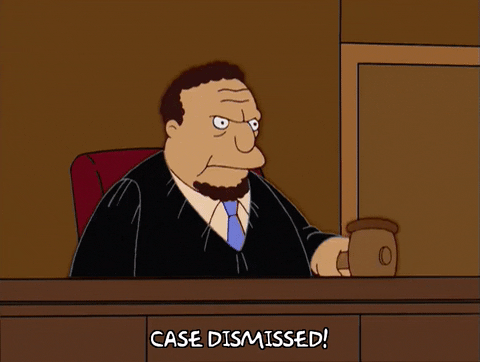 The government moved to dismiss a qui tam case; the Fifth Circuit found that the relators received the statutorily-required opportunity to contest that motion at a hearing:
The government moved to dismiss a qui tam case; the Fifth Circuit found that the relators received the statutorily-required opportunity to contest that motion at a hearing:
“Health Choice had a hearing before the magistrate judge. It had a witness available to testify at that hearing, and the witness was not prohibited from testifying. Health Choice declined to call the witness to testify and the magistrate judge did not prevent Health Choice from presenting the witness. Health Choice’s statements at oral argument suggest that it consciously and strategically chose not to offer evidence because it believed it had already won the motion. Even assuming that [42 U.S.C.] § 3730(c)(2)(A) requires the hearing to be an evidentiary hearing, there was no error because Health Choice declined to offer evidence at the hearing.”
(citations omitted). A concurrence emphasized the fact-specific nature of the holding, and one of the three panel members concurred as to the judgment only. United States ex rel. Health Choice Alliance v. Eli Lilly & Co., No. 19-40906 (July 7, 2021).
 The Fifth Circuit granted a stay during appeal in a challenge to a Texas JP’s practices regarding an invocation at the beginning of court proceedings: “In deciding whether to grant a stay pending appeal, we consider four factors: ‘(1) whether the stay applicant has made a strong showing that he is likely to succeed on the merits; (2) whether the applicant will be irreparably injured absent a stay; (3) whether issuance of the stay will substantially injure the other parties interested in the proceeding; and (4) where the public interest lies.’ All four factors favor Judge Mack.” The Court found a “manifestly erroneous” analysis of Ex Parte Young by the district court, which guided the application of the remaining factors in the appellant’s favor. Freedom From Religion Foundation v. Mack, No. 21-20279 (July 9, 2021).
The Fifth Circuit granted a stay during appeal in a challenge to a Texas JP’s practices regarding an invocation at the beginning of court proceedings: “In deciding whether to grant a stay pending appeal, we consider four factors: ‘(1) whether the stay applicant has made a strong showing that he is likely to succeed on the merits; (2) whether the applicant will be irreparably injured absent a stay; (3) whether issuance of the stay will substantially injure the other parties interested in the proceeding; and (4) where the public interest lies.’ All four factors favor Judge Mack.” The Court found a “manifestly erroneous” analysis of Ex Parte Young by the district court, which guided the application of the remaining factors in the appellant’s favor. Freedom From Religion Foundation v. Mack, No. 21-20279 (July 9, 2021).
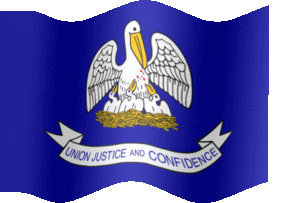 Goodrich v. United States certified a complex issue of Louisiana law to that state’s supreme court; confirming the wisdom of that decision, it summarized a relevant principle as stating: “If the things subject to the usufruct are consumables, the usufructuary becomes owner of them. He may consume, alienate, or encumber them as he sees fit. At the termination of the usufruct he is bound to pay to the naked owner either the value that the things had at the commencement of the usufruct or
Goodrich v. United States certified a complex issue of Louisiana law to that state’s supreme court; confirming the wisdom of that decision, it summarized a relevant principle as stating: “If the things subject to the usufruct are consumables, the usufructuary becomes owner of them. He may consume, alienate, or encumber them as he sees fit. At the termination of the usufruct he is bound to pay to the naked owner either the value that the things had at the commencement of the usufruct or
deliver to him things of the same quantity and quality.” No. 20-30422 (July 6, 2021) (emphasis added). Hopefully the resulting opinion will clothe the case with quality legal reasoning.
A wheelchair-bound potential juror complained about the inaccessibility of the courthouse to him when he was called for jury duty. The Fifth Circuit reviewed two guideposts about standing for such claims in its earlier opinions, noting:
O’Hair and Herman can be summarized as holding that a plaintiff with a substantial risk of being called for jury duty has standing to seek an injunction against a systemic exclusionary practice but not a one-off, episodic exclusion related to a particular judge’s actions. Thus, the plaintiff in O’Hair had standing for injunctive relief against a state constitutional provision that systemically excluded atheists from jury service, but the plaintiff in Herman lacked standing for injunctive relief against a particular judge’s conduct.
Applied to this case, the Fifth Circuit held: “[Plaintiff] has a substantial risk of being called for jury duty again. He was called twice between 2012 and 2017. Those past incidents, though insufficient to confer standing, are still ‘evidence bearing on whether there is a real and immediate threat of repeated injury.’ Moreover, Hinds County is not extremely populous, and only a subset of its population is eligible for jury service, so it’s fairly likely that Crawford will again, at some point, be called for jury duty.” Crawford v. Hinds County Board of Supervisors, No. 20-60372 (June 16, 2021) (citations omitted).
The Supreme Court will review Reagan National Advertising v. City of Austin, 972 F.3d 696 (5th Cir. 2020). The court’s summary of the issue presented is below, and here is my discussion of the case on the Coale Mind podcast —
Applying Keller v. State Bar of California, 491 U.S. 1 (1990), the Fifth Circuit concluded that certain activities by the State Bar of Texas were not “germane” to the Bar’s accepted purpose, and thus held that their funding with bar dues violated the First Amendment.
In sum, the Bar is engaged in non-germane activities, so compelling the plaintiffs to join it violates their First Amendment rights. There are multiple other constitutional options: The Bar can cease engaging in nongermane activities; Texas can directly regulate the legal profession and create a voluntary bar association, like New York’s; or Texas can adopt a hybrid system, like California’s. But it may not continue mandating membership in the Bar as currently structured or engaging in its current activities.
The Court acknowledged the “weakened foundations” of Keller after the union-dues case of Janus v. Am. Fed. of State, County, & Municipal Employees, 138 S. Ct. 2448 (2018), but concluded that it still framed the relevant issues in the context of a mandatory bar association. McDonald v. Longley, No. 20-50448 (July 2, 2021). The Texas Lawbook has written on the opinion. (The companion case of Boudreaux v. Louisiana State Bar Ass’n, No. 20-30086 (July 2, 2021), reversed a standing-based dismissal to a similar challenge to the activities of Louisiana’s state bar.)
 If you are an email subscriber to this blog’s new posts, or subscribe to its RSS feed, please know that Google has discontinued its “Feedburner” service, so 600Camp is converting to a similar (but hopefully much improved) service offered by “Follow.it.” With luck, the transition will be seamless. But if you experience a loss of service – or the opposite problem of multiple deliveries – please notify me at dcoale@lynnllp.com. Many thanks for subscribing!
If you are an email subscriber to this blog’s new posts, or subscribe to its RSS feed, please know that Google has discontinued its “Feedburner” service, so 600Camp is converting to a similar (but hopefully much improved) service offered by “Follow.it.” With luck, the transition will be seamless. But if you experience a loss of service – or the opposite problem of multiple deliveries – please notify me at dcoale@lynnllp.com. Many thanks for subscribing!
The plaintiff in Arruda v. Curves Int’l alleged that violations of the Franchise Rule were RICO predicate acts, but the Fifth Circuit disagreed: “Congress’s omission of a private right of action in the [Federal Trade Commission Act] controls. A violation of the Franchise Rule does not itself constitute a predicate act of mail or wire fraud to support a RICO claim.” The Court cited D.C. Circuit opinion about the Service Contract Act that asked the cogent question: “If there is no implied cause of action for damages, how much the less for treble damages?” No. 20-50734 (June 28, 2021) (unpublished).
 Huawei Technologies USA v. FCC presents an exhaustive summary of modern-day administrative law, in the context of reviewing an FCC rule that excluded Huawei from federal funds as a security risk. As the Court summarized its several holdings:
Huawei Technologies USA v. FCC presents an exhaustive summary of modern-day administrative law, in the context of reviewing an FCC rule that excluded Huawei from federal funds as a security risk. As the Court summarized its several holdings:
Their most troubling challenge is that the rule illegally arrogates to the FCC the power to make judgments about national security that lie outside the agency’s authority and expertise. That claim gives us pause. The FCC deals with national communications, not foreign relations. It is not the Department of Defense, or the National Security Agency, or the President. If we were convinced that the FCC is here acting as “a sort of junior varsity [State Department],” Mistretta v. United States, 488 U.S. 361, 427 (1989) (Scalia, J., dissenting), we would set the rule aside.
But no such skullduggery is afoot. Assessing security risks to telecom networks falls in the FCC’s wheelhouse. And the agency’s judgments about national security receive robust input from other expert agencies and officials. We are therefore persuaded that, in crafting the rule, the agency reasonably acted within the broad authority Congress gave it to regulate communications.
No. 19-60896 (June 18, 2021).
 The long and winding case of Doe v. McKesson, remanded from the Supreme Court with instruction to certify a threshold state-law question to the Louisiana Supreme Court, added one more state-law issue after remand. Doe v. McKesson, No. 17-30864 (June 25, 2021).
The long and winding case of Doe v. McKesson, remanded from the Supreme Court with instruction to certify a threshold state-law question to the Louisiana Supreme Court, added one more state-law issue after remand. Doe v. McKesson, No. 17-30864 (June 25, 2021).
Strong feelings were voiced about the Fifth Circuit’s panel opinion in Ramirez v. Guardarrama, 844 F. App’x 710 (5th Cir. 2021) (per curiam). The vote against en banc review was 13-4, with several opinions:
- Judge Jolly, who had been on the panel that found no Fourth Amendment violation, concurred with denial and observed: “The unanimous panel opinion also explains why we cannot quarterback from our Delphic shrines, three years later, the split-second decision making required of these officers in response to a suicidal man (1) doused in gasoline, (2) reportedly high on methamphetamine, (3) screaming nonsense, (4) holding a lighter, and (5) threatening to set himself on fire and to burn down the home, occupied by six people, which he had earlier covered in gasoline.”
- Judge Ho, joined by Judges Jolly and Jones, concurred and further observed: “[H]ow can a constitutional violation be ‘obvious,’ ‘egregious,’ and ‘conscience-shocking,’ when the dissent can’t tell the officers what they should have done differently to keep people safe?”
- Judge Oldham (also on the panel), joined by all of the above and Judge Engelhardt, reviewed the Fourth Amendment claim through a Twombly lens and concluded: “[T]he Fourth Amendment is not an antidote to tragedy. It’s a cornerstone of our Bill of Rights, with an august history and profound original meaning. We cheapen it when we treat it like a chapter from Prosser & Keeton. And we transmogrify it beyond recognition when we say officers act ‘unreasonably’ without any effort to say what a reasonable officer would’ve done.”
- Judge Smith dissented, arguing that this case provided an opportunity to revisit another recent en banc opinion.
- Judge Willett dissented, joined by Judges Graves and Higginson, pointing to recent Supreme Court cases that rejected qualified-immunity claims and observing: “The complaint alleges a plausible Fourth Amendment violation, and an obvious one at that. How is it reasonable—more accurately, not plausibly unreasonable—to set someone on fire to prevent him from setting himself on fire?”
 The defendant in IMA, Inc. v. Medical City Dallas sought to compel arbitration under a “direct-benefits estoppel” theory. It argued that the plaintiff’s claim, which involved a series of related contracts, necessarily implicated an agreement that contained an arbitration clause. The Fifth Circuit affirmed the denial of its motion to compel arbitration, agreeing that the defendant lacked “knowledge of the contract’s ‘basic terms,’ and noting: “IMA neither was shown to have, nor needed, knowledge of the Hospital Agreement in order to fulfill its obligations to the Health Plan and the IMAPPOplus Agreement; rather IMA could process the claims with ‘a copy of the [Health] Plan and the PPO Contract Rates.'” No. 20-20032 (June 17, 2021).
The defendant in IMA, Inc. v. Medical City Dallas sought to compel arbitration under a “direct-benefits estoppel” theory. It argued that the plaintiff’s claim, which involved a series of related contracts, necessarily implicated an agreement that contained an arbitration clause. The Fifth Circuit affirmed the denial of its motion to compel arbitration, agreeing that the defendant lacked “knowledge of the contract’s ‘basic terms,’ and noting: “IMA neither was shown to have, nor needed, knowledge of the Hospital Agreement in order to fulfill its obligations to the Health Plan and the IMAPPOplus Agreement; rather IMA could process the claims with ‘a copy of the [Health] Plan and the PPO Contract Rates.'” No. 20-20032 (June 17, 2021).
Retana, a Dallas police officer, sued several social-media companies after he was injured in a mass shooting. He alleged that Hamas radicalized the shooter through their platforms, and sought relief under the Anti-Terrorist Act. The Fifth Circuit affirmed dismissal, agreeing that the Dallas shooting was not “primarily outside the territorial jurisdiction of the United States” as the Act requires, and also found that the companies did not assist any terrorist group’s actions: “The shooting was committed by a self-radicalized ‘lone wolf’ … not by Hamas.” Retana v. Twitter, Inc., No. 19-11389 (June 16, 2021).
A wrongful-foreclosure case reminds of a basic Twombly principle: “Green’s breach-of contract claim in her complaint alleged that Defendants violated conditions in the deed of trust, but she never explained which part of the deed was violated. It was only in response to Defendants’ summary judgment motion that Green identified the deed’s notice requirement as the specific violation. Her failure to specify her breach-of-contract claim in her complaint warrants dismissal of that claim.” Green v. Windsor Park Asset Holding Trust, No. 20-11226 (June 18, 2021, unpublished) (per curiam).
The Supreme Court reversed a Fifth Circuit panel opinion about the constitutionality of the Affordable Care Act, finding that none of the plaintiffs had standing in light of (1) the repeal of coverage-related penalties and (2) the apparent mismatch between the ACA provisions complained of as unconstitutional, and those that caused the complained–of harms to the states. California v. Texas, No. 19-840 (U.S. Jun 17, 2021) (reversing Texas v. United States, 945 F. 3d 355 (5th Cir. 2019)).
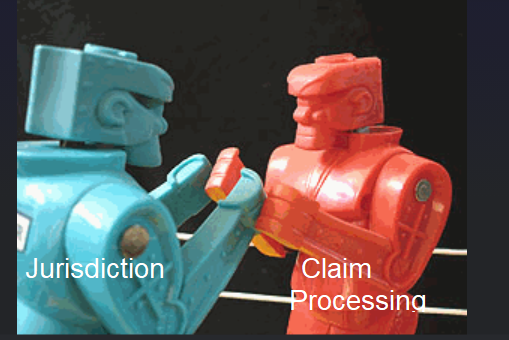 An important question about statutes bearing on the ability of a federal court to hear a matter is whether they are “jurisdictional,” or only speak to issues of “claim-processing.” See, e.g., Reed Elsevier, Inc. v. Muchnick, 559 U.S. 154 (2010). In Rivero v. Fidelity Investments, “[e]xamining the text and structure of the [Declaratory Judgment Act]’s federal-tax exception” led to the conclusion that it was jurisdictional: “[T]he statute plainly ‘speak[s] to the power of the court.’ … [T]he juxtaposition of the DJA’s reference to federal courts’ jurisdiction and the federal-tax exception indicates that the latter deprives a court of jurisdiction that might otherwise exist in cases ‘with respect to Federal taxes.'” The court also noted holdings in cases about a similarly-worded provision of the Anti-Injunction Act. No. 20-40371 (June 10, 2021) (citations omitted).
An important question about statutes bearing on the ability of a federal court to hear a matter is whether they are “jurisdictional,” or only speak to issues of “claim-processing.” See, e.g., Reed Elsevier, Inc. v. Muchnick, 559 U.S. 154 (2010). In Rivero v. Fidelity Investments, “[e]xamining the text and structure of the [Declaratory Judgment Act]’s federal-tax exception” led to the conclusion that it was jurisdictional: “[T]he statute plainly ‘speak[s] to the power of the court.’ … [T]he juxtaposition of the DJA’s reference to federal courts’ jurisdiction and the federal-tax exception indicates that the latter deprives a court of jurisdiction that might otherwise exist in cases ‘with respect to Federal taxes.'” The court also noted holdings in cases about a similarly-worded provision of the Anti-Injunction Act. No. 20-40371 (June 10, 2021) (citations omitted).
While this is a post about Texas state practice, I am cross-posting it from 600Commerce because it is of broad general interest to civil appellate practitioners.
With respect to court orders and judgments, the words “signed,” “rendered,” and “entered” are often used interchangeably. But those words have specific, technical meanings, and it is wise to remember those meanings when differences matter. Accord, Burrell v. Cornelius, 570 S.W.2d 382, 384 (Tex. 1978) (“Judges render judgment; clerks enter them on the minutes. … The entry of a judgment is the clerk’s record in the minutes of the court. ‘Entered’ is synonymous with neither ‘Signed’ nor ‘Rendered.’”).
Two rules set the background as to when critical countdowns commence:
- Tex. R. Civ. P. 306a: “The date of judgment or order is signed as shown of record shall determine the beginning of the periods prescribed by these rules for the court’s plenary power to grant a new trial or to vacate, modify, correct or reform a judgment or order and for filing in the trial court the various documents that these rules authorize a party to file …”
- Similarly, Tex. R. App. P. 26.1 begins: “The notice of appeal must be filed within 30 days after the judgment is signed, except as follows …”
By contrast, “[j]udgment is rendered when the trial court officially announces its decision in open court or by written memorandum filed with the clerk.” E.g., S&A Restaurant Corp. v. Leal, 892 S.W.2d 855, 857 (Tex. 1995) (per curiam). And the above-quoted paragraph from Rule 306a concludes: “… but this rule shall not determine what constitutes rendition of a judgment or order for any other purpose.”
By contrast, entry of judgment refers to the recording of a rendered judgment in the court’s official records. See, e.g., Lone Star Cement Corp v. Fair, 467 S.W.2d 402, 405 (Tex. 1971) (“The law is settled in this state that clerical errors in the entry of a judgment, previously rendered, may be corrected after the end of the court’s term by a nunc pro tunc judgment; however, judicial errors in the previously rendered judgment may not be so corrected.” (emphasis added)).
I gratefully acknowledge the excellent insights of Ben Taylor in preparing this post!
The able Rory Ryan of Baylor’s law school has Tweeted in detail about a recent district-court opinion on a thorny, and persistent, removal-jurisdiction issue. The case, which arose under a Texas Insurance Code provision with a specific procedure about claims against insurance agents, presented these facts:
Plaintiffs sued their insurer, Chubb (who is diverse), and agent, Smith (who is non-diverse), in state court. Chubb then elected to accept whatever liability Smith might have, and the state court dismissed Smith. Chubb then removed the case under diversity jurisdiction.
Leading to this issue: “[I]n determining diversity jurisdiction, does the Court consider Smith’s citizenship?”
After an extensive review of the relevant statutes and cases, the Court concluded:
Without binding authority, the Court must rely on the policy and rationale supporting the improper-joinder rule. The improper-joinder rule holds that the non-diverse defendant never should have been a party. As the Fifth Circuit has said: “If no reasonable basis of recovery exists, a conclusion can be drawn that the plaintiff’s decision to join the local defendant was indeed fraudulent …,” and therefore improper. As shown above, this rationale explains the improper-joinder rule’s past application.
But the rationale does not support an improper-joinder finding when the plaintiff’s claims against the non-diverse defendant were initially valid. In this situation, it is false to say an improper-joinder finding amounts to a determination that the non-diverse defendant was never properly before the court. It was.
(citations omitted, emphasis in original). The case was thus remanded to state court.
 If MoneyGram is a “bank” under the applicable Internal Revenue Code provision, it can take a large deduction that it cannot otherwise take. The Fifth Circuit did not agree with its claim to be a bank: “MoneyGram contends that when a customer buys a money order, the customer is placing funds with MoneyGram for safekeeping, at least until such time as the recipient of the money order presents it for payment. The tax court rejected this argument, likening a money order to the purchase of a gift card rather than a deposit in a bank account. We agree.” MoneyGram Int’l v. Commissioner of Internal Revenue, No. 20-60146 (June 1, 2021).
If MoneyGram is a “bank” under the applicable Internal Revenue Code provision, it can take a large deduction that it cannot otherwise take. The Fifth Circuit did not agree with its claim to be a bank: “MoneyGram contends that when a customer buys a money order, the customer is placing funds with MoneyGram for safekeeping, at least until such time as the recipient of the money order presents it for payment. The tax court rejected this argument, likening a money order to the purchase of a gift card rather than a deposit in a bank account. We agree.” MoneyGram Int’l v. Commissioner of Internal Revenue, No. 20-60146 (June 1, 2021).
 The Fifth Circuit harmonized two insurance-policy provisions in Miller v. Reliance Std. Ins. Co.:
The Fifth Circuit harmonized two insurance-policy provisions in Miller v. Reliance Std. Ins. Co.:
“[T]he phrase ‘active, full-time’ employees must be construed in the insured’s favor to include those who, on the relevant date, are current employees even if not actually working. We also agree that the term ‘regular work week’ must be construed to refer to an employee’s job description, or to his typical workload when on duty.
To hold otherwise, as Reliance urges, would render the second paragraph of the Transfer Provision virtually redundant with the first. On Reliance’s reading, the paragraph would cover employees who actually maintain a full-time work schedule at the time of transfer. But this is barely different, if at all, from the previous paragraph’s provision for employees who at the time are ‘Actively at Work,’ defined to mean ‘actually performing on a Full-time basis the material duties pertaining to his/her job'[.]
Effectively, Reliance’s reading is that the second paragraph covers employees who are not “actually performing” work duties but are ‘otherwise’ actually working. We reject this convoluted construction as the unambiguous meaning of the provision.”
No. 20-30240 (June 2, 2021) (emphasis in original, breaks added).
The Supreme Court affirmed the Fifth Circuit’s analysis of appellate costs (often a trivial issue, but here involving over $2 million in supersedeas-bond premiums) in City of San Antonio v. Hotels.com, stating: “[W]e hold that courts of appeals have the discretion to apportion all the appellate costs covered by Rule 39 and that district courts cannot alter that allocation.” No. 20–334 (U.S. May 27, 2021). (It remains to be seen how the Roberts Court will review other, more politically charged opinions from the Fifth Circuit this term.)
A party in Int’l Energy Ventures Mgmnt, LLC v. United Energy Group, Ltd. “recognize[d] the general proposition that litigation-conduct waiver is an issue that should be decided by the court,” but “contend[ed] that the general rule does not apply here for three reasons.” The Fifth Circuit rejected each one:
- Incorporation of AAA rules. Yes, the parties’ agreement gave the arbitrator “the power to rule on its own jurisdiction,” but it did not “clearly and unmistakably” confer the power to decided litigation-conduct waiver.
- Waiver. Again, the Court found that activity during the arbitration did not “clearly and unmistakably” result in the “submission” of this issue, noting reservations made by the relevant party and the arbitrator’s own actions.
- “Unique facts.” The Court did not find key cases inapplicable because of the party who sought arbitration: “‘Arbitration is a matter of contract,'” reasoned the Court, and “[e]xtra-contractual factors–like where an issue first arises and who initiates arbitration–are not part of the interpretive analysis.”
No. 20-20221 (May 28, 2021).
 The “similar birds” case — Alliance for Good Government v. Coalition for Better Government — returned to the
The “similar birds” case — Alliance for Good Government v. Coalition for Better Government — returned to the  Fifth Circuit to address attorneys’ fees. The panel majority affirmed the final fee award, over a strong dissent that questioned the application of the Lanham Act to what it saw as purely political speech. No. 20-30233 (May 19, 2021).
Fifth Circuit to address attorneys’ fees. The panel majority affirmed the final fee award, over a strong dissent that questioned the application of the Lanham Act to what it saw as purely political speech. No. 20-30233 (May 19, 2021).
Canfield v. Lumpkin presented an ineffective-assistance claim arising from voir dire. The record showed the following exchange with the juror in question, followed by general questions to the panel about the ability ot be fair, with no individual followup questioning of this juror:
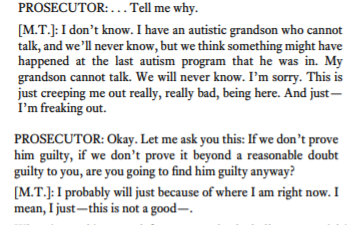 The panel majority found no error sufficient to justify habeas relief, as well as a lack of sufficient prejudice. A dissent saw matters otherwise: “[T]he trial judge and counsel were acutely aware of the necessary care that must attend jury selection and the challenges of this case. Our question is whether they succeeded in protecting the jury room. Unlike the majority, I conclude that they did not. During voir dire, a prospective juror volunteered that she felt the defendant was guilty and would probably vote to convict him even if the State failed to prove his guilt beyond a reasonable doubt. Neither counsel nor the judge followed up with her. So, she served on the jury that first convicted Jerry Lee Canfield and, then, free to choose from a menu of sentences from 5 years to life imprisonment, sentenced him to 50 years in prison without the possibility of parole.” No. 18-10431 (May 18, 2021).
The panel majority found no error sufficient to justify habeas relief, as well as a lack of sufficient prejudice. A dissent saw matters otherwise: “[T]he trial judge and counsel were acutely aware of the necessary care that must attend jury selection and the challenges of this case. Our question is whether they succeeded in protecting the jury room. Unlike the majority, I conclude that they did not. During voir dire, a prospective juror volunteered that she felt the defendant was guilty and would probably vote to convict him even if the State failed to prove his guilt beyond a reasonable doubt. Neither counsel nor the judge followed up with her. So, she served on the jury that first convicted Jerry Lee Canfield and, then, free to choose from a menu of sentences from 5 years to life imprisonment, sentenced him to 50 years in prison without the possibility of parole.” No. 18-10431 (May 18, 2021).
Please sign up for my Fifth Circuit update for the Austin Bar Association this Thursday, May 12, at noon – here is the link – and Texas Solicitor General Judd Stone will present a Supreme Court update as well! Here is a draft of my PowerPoint for the presentation.
Removals under the federal-officer statute have drawn increased scrutiny in recent years. In BP P.L.C. v. Mayor and City Council of Baltimore, the Supreme Court addressed an important issue about appellate review of remand orders involving that statute, concluding: “To remove a case, a defendant must comply with 28 U. S. C. §1446. Essentially, that statute requires the defendant to provide affected parties and
courts with a notice stating its grounds for removal. §§1446(a), (d). The combination of these actions ‘effect[s] the removal.’ §1446(d). To remove a case ‘pursuant to’ §1442 or §1443, then, just means that a defendant’s notice of removal must assert the case is removable ‘in accordance with or by reason of’ one of those provisions. Here, everyone admits the defendants’ notice of removal did just that by citing §1442 as one of its grounds for removal. Once that happened and the district court ordered the case remanded to state court, the whole of its order became reviewable on appeal.” No. 19-1189 (U.S. May 17, 2021) (footnotes omitted).
The appellant in Lillie v. Office of Financial Institutions argued that an adverse summary judgment was based on an unreliable case. The Fifth Circuit disagreed: “The court relied on Friedman only in reasoning that a showing of ‘but-for causation’—namely that SEI might have been able to prevent STC’s violations—is not enough to establish control. Such a rationale … is distinct from Friedman’s independent holding that the plaintiffs there had not alleged culpability. One may cite a case without endorsing everything for which it stands. The district court understood the law.” No. 19-30705 (May 14, 2021).
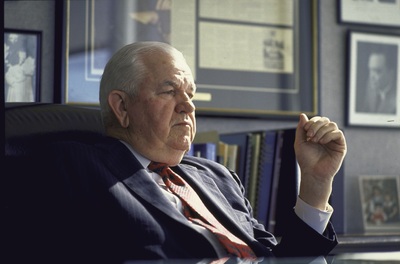 Roe v. Wade famously named Dallas County DA Henry Wade (right) as its defendant, because he was the official charged with enforcement of the criminal statute at issue. The Texas Legislature has passed a new abortion law — a “heartbeat bill” — that features a novel enforcement procedure involving private litigants. The statute disclaims any
Roe v. Wade famously named Dallas County DA Henry Wade (right) as its defendant, because he was the official charged with enforcement of the criminal statute at issue. The Texas Legislature has passed a new abortion law — a “heartbeat bill” — that features a novel enforcement procedure involving private litigants. The statute disclaims any  public enforcement, relying on a private right of action against abortion providers that features an extremely broad definition of standing. The Texas Tribune correctly notes that the Fifth Circuit’s en banc opinion in Okpalobi v. Foster, 244 F.3d 501 (5th Cir. 2001), declined to extend Ex Parte Young (left) to a Louisiana statute that created a somewhat-analogous private cause of action against abortion providers. Assuming that the Governor signs the new Texas law, Okpalobi will likely be cited frequently in federal-court challenges to it. (I recently did a an interview with Fox 4’s “Good Day” about this new law.)
public enforcement, relying on a private right of action against abortion providers that features an extremely broad definition of standing. The Texas Tribune correctly notes that the Fifth Circuit’s en banc opinion in Okpalobi v. Foster, 244 F.3d 501 (5th Cir. 2001), declined to extend Ex Parte Young (left) to a Louisiana statute that created a somewhat-analogous private cause of action against abortion providers. Assuming that the Governor signs the new Texas law, Okpalobi will likely be cited frequently in federal-court challenges to it. (I recently did a an interview with Fox 4’s “Good Day” about this new law.)
While Olivarez v. T-Mobile involved the high-profile topic of Title VII’s protection for transgendered individuals, it turned on a basic and common proof problem in such cases: “Olivarez has failed to plead any facts indicating less favorable treatment than others ‘similarly situated’ outside of the asserted protected class. In fact, the Second Amended Complaint does not contain any facts about any comparators at all. The complaint simply indicates that Olivarez took six months of leave from September 2017  to February 2018—including an extension granted by T-Mobile and Broadspire—and that when Olivarez requested additional leave in March 2018, T-Mobile denied the request and terminated Olivarez’s employment in April 2018. Notably, there is no allegation that any non-transgender employee with a similar job and supervisor and who engaged in the same conduct as Olivarez received more favorable treatment.” No. 20-20463 (May 12, 2021) (emphasis added).
to February 2018—including an extension granted by T-Mobile and Broadspire—and that when Olivarez requested additional leave in March 2018, T-Mobile denied the request and terminated Olivarez’s employment in April 2018. Notably, there is no allegation that any non-transgender employee with a similar job and supervisor and who engaged in the same conduct as Olivarez received more favorable treatment.” No. 20-20463 (May 12, 2021) (emphasis added).
 In 2017, the USS Fitzgerald, a U.S. Navy destroyer, collided with the MV ACX Crystal, a commercial container ship, in Japanese territorial waters. The incident caused extensive damage and injury, including the death of seven American sailors. Relatives of the deceased sailors sued the ship owner in federal court under the Death on the High Seas Act. They based personal jurisdiction on Fed. R. Civ. P. 4(k)(2), “alleging that, despite NYK Line’s status as a foreign corporation, its substantial, systematic, and continuous contacts with the United States should make NYK Line amenable to suit in federal court.” I
In 2017, the USS Fitzgerald, a U.S. Navy destroyer, collided with the MV ACX Crystal, a commercial container ship, in Japanese territorial waters. The incident caused extensive damage and injury, including the death of seven American sailors. Relatives of the deceased sailors sued the ship owner in federal court under the Death on the High Seas Act. They based personal jurisdiction on Fed. R. Civ. P. 4(k)(2), “alleging that, despite NYK Line’s status as a foreign corporation, its substantial, systematic, and continuous contacts with the United States should make NYK Line amenable to suit in federal court.” I
In Douglass v. Nippon Yusen Kabushiki Kaisha, the Fifth Circuit noted that that the case raised novel but significant issues about the distinction between 5th and 14th Amendment due process protections, but found itself constrained by the “rule of orderliness” to follow an earlier Circuit case on the topic. A 2-judge dissent urged en banc consideration, noting that “[o]ur decision today … determines that a global corporation with extensive contacts with the United States cannot be haled into federal court for federal claims arising out of a maritime collision that killed seven United States Navy sailors.” No. 20-30379 (April 30, 2021).
The difficult First Amendment case of Wilson v. Harris County Community College System, 955 F.3d 490 (5th Cir. 2020), produced a panel opinion that allowed an elected member of a community-college board to bring a claim about alleged retaliation for his exercise of First Amendment rights, followed by an 8-8 tie on the question of en banc review. The Supreme Court has now granted review of this fundamental issue about the relationship between elected officials’ rights and the interests of the institutions they serve: 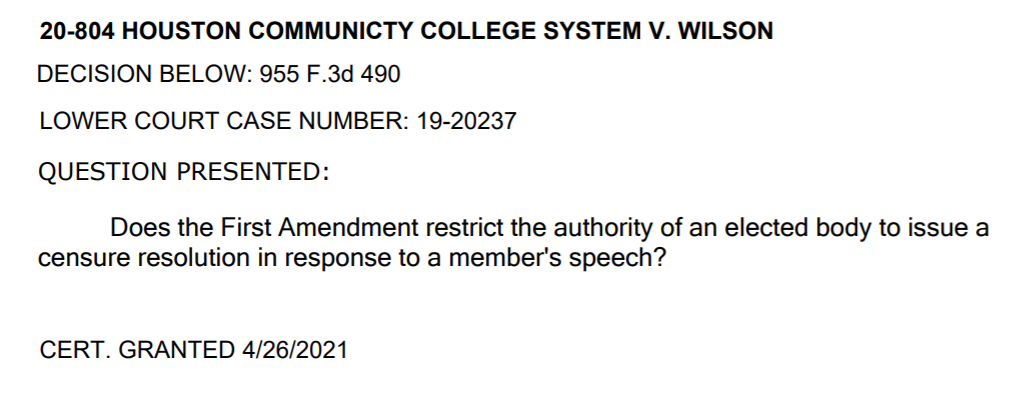 (The first episode of the “Coale Mind” podcast considers this case along with the “Cancel Culture” phenomenon.)
(The first episode of the “Coale Mind” podcast considers this case along with the “Cancel Culture” phenomenon.)
 CNN recently reported on a Capitol rioter who was turned in by an unimpressed Bumble match (right). This story illustrates precisely the kind of “red-blue” interaction (admittedly, with less romanticism) that jury service forces when it brings together people of different backgrounds and interactions. These interactions are increasingly important in our divided times, and have taken on new dimensions after the difficult year of 2020. I discuss this topic (jury selection, not date-getting) with top jury consultant Jason Bloom in the most recent episode of the Coale Mind podcast.
CNN recently reported on a Capitol rioter who was turned in by an unimpressed Bumble match (right). This story illustrates precisely the kind of “red-blue” interaction (admittedly, with less romanticism) that jury service forces when it brings together people of different backgrounds and interactions. These interactions are increasingly important in our divided times, and have taken on new dimensions after the difficult year of 2020. I discuss this topic (jury selection, not date-getting) with top jury consultant Jason Bloom in the most recent episode of the Coale Mind podcast.
 During the course of a long-running contract dispute, the Fifth Circuit remanded the case for further development of the record about diversity jurisdiction. Problems with appellate deadlines for a later appeal ensued; in reviewing the parties’ arguments the Court noted:
During the course of a long-running contract dispute, the Fifth Circuit remanded the case for further development of the record about diversity jurisdiction. Problems with appellate deadlines for a later appeal ensued; in reviewing the parties’ arguments the Court noted:
- “Full” v. “partial” remand. “It is true that in some cases where this court has remanded with a specific directive to the district court, we have retained jurisdiction over the appeal, obviating the need for the appellant to file a new notice of appeal after the district court’s remand proceedings. However, in those cases, this court specified that we retained jurisdiction over the appeal.”
- Effect of an attorneys-fee appeal. “[W]hen the merits judgment has already become final and unappealable, a mere delay of that judgment is no longer possible, and the court lacks any authority under FRAP 4(a)(4)(A)(iii) and FRCP 58[(e)] to modify the finality or the effect of the merits judgment.” (citation omitted).
- Good cause is not GOOD CAUSE. “Rule 4(a)(5), unlike Rule 4(a)(4)(A)(iii) and Rule 58(e), does allow a district court to revive an untimely notice of appeal after the original time to appeal has expired. … Pathway’s motion cannot be construed as a Rule 4(a)(5) motion, however. The extension motion cites Rule 58(e) rather than Rule 4(a)(5), and its arguments are relevant only to the former ….”
Midcap Media Finance LLC v. Pathway Data, Inc., No. 20-50259 (April 20, 2021).
 In one corner, there is “Metchup”: “Mr. Dennis Perry makes Metchup, which depending on the batch is a blend of either Walmart-brand mayonnaise and ketchup or Walmart-brand mustard and ketchup. Mr. Perry sells Metchup exclusively from the lobby of a nine-room motel adjacent to his used-car dealership in Lacombe, Louisiana. He has registered Metchup as an incontestable trademark. Though he had big plans for Metchup, sales have been slow. Since 2010, Mr. Perry has produced only 50 to 60 bottles of Metchup, which resulted in sales of around $170 and profits of around $50. He owns www.metchup.com but has never sold Metchup online. For better or worse, the market is not covered in Metchup.”
In one corner, there is “Metchup”: “Mr. Dennis Perry makes Metchup, which depending on the batch is a blend of either Walmart-brand mayonnaise and ketchup or Walmart-brand mustard and ketchup. Mr. Perry sells Metchup exclusively from the lobby of a nine-room motel adjacent to his used-car dealership in Lacombe, Louisiana. He has registered Metchup as an incontestable trademark. Though he had big plans for Metchup, sales have been slow. Since 2010, Mr. Perry has produced only 50 to 60 bottles of Metchup, which resulted in sales of around $170 and profits of around $50. He owns www.metchup.com but has never sold Metchup online. For better or worse, the market is not covered in Metchup.”
 In the other corner, there is Heinz: “Along comes Heinz. It makes Mayochup, which is solely a blend of mayonnaise and ketchup. To promote Mayochup’s United States launch, Heinz held an online naming contest where fans proposed names. A fan submitted Metchup, and Heinz posted a mock-up bottle bearing the name Metchup on its website alongside mock-up bottles for the other proposed names. Heinz never sold a product labeled Metchup.”
In the other corner, there is Heinz: “Along comes Heinz. It makes Mayochup, which is solely a blend of mayonnaise and ketchup. To promote Mayochup’s United States launch, Heinz held an online naming contest where fans proposed names. A fan submitted Metchup, and Heinz posted a mock-up bottle bearing the name Metchup on its website alongside mock-up bottles for the other proposed names. Heinz never sold a product labeled Metchup.”
Sadly for Perry’s trademark-infringement claim, the Fifth Circuit concluded: “It would be a coincidence to ever encounter both Mayochup and Metchup in the market, much less get confused about the affiliation, sponsorship, or origin of the two products. Accordingly, no reasonable jury could conclude that Heinz’s use of Metchup in advertising or the sale of its own product, Mayochup, created a likelihood of confusion.” Perry v. H.J. Heinz, No. 20-30418 (April 12, 2021).
 This week on the “Coale Mind” podcast, I had top-flight jury consultant Jason Bloom as a special guest; in the episode we touch on the many pervasive effects that 2020 will have on jurors and jury selection, including:
This week on the “Coale Mind” podcast, I had top-flight jury consultant Jason Bloom as a special guest; in the episode we touch on the many pervasive effects that 2020 will have on jurors and jury selection, including:
– A surprising eagerness of people to show up and serve on juries, in part driven by widespread feelings of frustration after months of shutdown;
– Concern about what Jason calls the “massive exercise in confirmation bias” that potential jurors bring to the courthouse with them, depending on how restricted a juror’s information sources may be;
– The once-obscure psychological terms “ultracrepidarian” and “pareidolia” (you have to listen to the podcast to explore those terms’ meaning 🙂;
– Remembering that 2020 changed potential jurors not only because of COVID, but because of Black Lives Matter, the Biden-Trump election and its aftermath, etc.
– And a reminder that jury service—unlike the similar civic-engagement exercise of voting—forces jurors to form a consensus among their different beliefs; and
– Why 1-page written questionnaires for potential jurors may be particularly useful now in light of the above issues.
 Confronted with the impossibly tangled Gordian Knot, Alexander the Great famously sliced it in half with his sword (right). Confronted with a “counterintuitive flow of money” in the complex intersection between pharmaceutical patents and the antitrust laws, in the Fifth Circuit affirmed the outcome of an FTC proceeding on the narrowest available ground in Impax Labs v. FTC, No. 19-60394 (April 13, 2021). The case arose from the settlement of a patent case between a brand-drug manufacturer and a generic drug maker, which presented these considerations about competition:
Confronted with the impossibly tangled Gordian Knot, Alexander the Great famously sliced it in half with his sword (right). Confronted with a “counterintuitive flow of money” in the complex intersection between pharmaceutical patents and the antitrust laws, in the Fifth Circuit affirmed the outcome of an FTC proceeding on the narrowest available ground in Impax Labs v. FTC, No. 19-60394 (April 13, 2021). The case arose from the settlement of a patent case between a brand-drug manufacturer and a generic drug maker, which presented these considerations about competition:
- The legal monopoly created by the brand-drug maker’s patent, and the challenge to it posed by the patent dispute;
- The framework established by the Hatch-Waxman Act for FDA approval of a generic drug, which has the practical effect of shifting all of the generic maker’s products into the first six months of manufacture;
- The settlement of the patent dispute by lengthening the brand-drug maker’s
 monopoly in exchange for consideration given to the the generic manufacturer (which in turn, potentially worsens the approval “bottleneck” created by the Hatch-Waxman Act);
monopoly in exchange for consideration given to the the generic manufacturer (which in turn, potentially worsens the approval “bottleneck” created by the Hatch-Waxman Act); - The pro-competitive effect of ending a patent monopoly earlier than it might otherwise have ended;
- Whether certain pro-competitive features of the parties’ settlement had a “nexus” to the above payments.
The FTC concluded that these factors made the settlement anticompetitive, and also concluded that the parties had a “less restrictive alternative” available that would have avoided these issues. The Fifth Circuit affirmed on the less-restrictive-alternative ground, finding it supported by “[t]hree evidentiary legs–industry practice, credibility determinations about settlement negotiations, and economic analysis ….”
 In an arbitrability dispute, the Fifth Circuit reviewed the basis for federal jurisdiction, noting: “[Vaden v. Discover Bank, 556 U.S. 49 (2009)] then went on to point out a wrinkle. ‘As for jurisdiction over controversies touching arbitration, however, the [Federal Arbitration] Act is something of an anomaly in the realm of federal legislation: It bestows no federal jurisdiction but rather requires for access to a federal forum an independent jurisdictional basis over the parties’ dispute.'” Applied to the case at hand: “Under that “look through” analysis, we hold that this underlying dispute presents a federal question. Polyflow’s arbitration demand included at least three federal statutory claims under the Lanham Act …. What matters is that a federal question—the Lanham Act claims—animated the underlying dispute, not whether Polyflow listed them in its original complaint.” Polyflow LLC v. Specialty RTP LLC, No. 20-20416 (March 30, 2021).
In an arbitrability dispute, the Fifth Circuit reviewed the basis for federal jurisdiction, noting: “[Vaden v. Discover Bank, 556 U.S. 49 (2009)] then went on to point out a wrinkle. ‘As for jurisdiction over controversies touching arbitration, however, the [Federal Arbitration] Act is something of an anomaly in the realm of federal legislation: It bestows no federal jurisdiction but rather requires for access to a federal forum an independent jurisdictional basis over the parties’ dispute.'” Applied to the case at hand: “Under that “look through” analysis, we hold that this underlying dispute presents a federal question. Polyflow’s arbitration demand included at least three federal statutory claims under the Lanham Act …. What matters is that a federal question—the Lanham Act claims—animated the underlying dispute, not whether Polyflow listed them in its original complaint.” Polyflow LLC v. Specialty RTP LLC, No. 20-20416 (March 30, 2021).
 The full Fifth Circuit declined to grant en banc review to State of Texas v. Rettig, 987 F.3d 518 (5th Cir. 2021), which involved constitutional challenges by certain states to two aspects of the Affordable Care Act. They contended that the “Certification Rule” violated the nondelegation doctrine, and that section 9010 of the ACA violated the Spending Clause and the Tenth Amendment’s doctrine of intergovernmental tax immunity. The panel found the laws constitutional, in an opinion by Judge Haynes that was joined by Judges Barksdale and Willett. “In the en banc poll, five judges voted in favor of rehearing (Judges Jones, Smith, Elrod, Ho, and Duncan), and eleven judges voted against rehearing (Chief Judge Owen, and Judges Stewart, Dennis, Southwick, Haynes, Graves, Higginson, Costa, Willett, Engelhardt, and Wilson),” with Judge Oldham not participating, and the five pro-rehearing judges joining a dissent.
The full Fifth Circuit declined to grant en banc review to State of Texas v. Rettig, 987 F.3d 518 (5th Cir. 2021), which involved constitutional challenges by certain states to two aspects of the Affordable Care Act. They contended that the “Certification Rule” violated the nondelegation doctrine, and that section 9010 of the ACA violated the Spending Clause and the Tenth Amendment’s doctrine of intergovernmental tax immunity. The panel found the laws constitutional, in an opinion by Judge Haynes that was joined by Judges Barksdale and Willett. “In the en banc poll, five judges voted in favor of rehearing (Judges Jones, Smith, Elrod, Ho, and Duncan), and eleven judges voted against rehearing (Chief Judge Owen, and Judges Stewart, Dennis, Southwick, Haynes, Graves, Higginson, Costa, Willett, Engelhardt, and Wilson),” with Judge Oldham not participating, and the five pro-rehearing judges joining a dissent.
In Tejero v. Portfolio Recovery Associates, a plaintiff who successfully settled a Fair Debt Collection Practices Act case sought recovery of attorneys’ fees, noting that the FDCPA allows a fee award for a “successful action to enforce …. liability.” The Fifth Circuit held that this language “means a lawsuit that generates a favorable end result compelling accountability and legal compliance with a formal command or decree under the FDCPA. Tejero won no such relief because he settled before his lawsuit reached any end result, let alone a favorable one. And by settling, Portfolio Recovery avoided a formal legal command or decree from Tejero’s lawsuit.” No. 20-50543 (April 7, 2021).
 Several years ago, mathematicians rejoiced at the mapping of the world’s most complex structure, the 248-dimension “Lie Group E8” (right). Not to be outdone, the en banc Fifth Circuit has issued Brackeen v. Haaland, a 325-page set of opinions about the constitutionality of the Indian Child Welfare Act–a work so complicated that a six-page per curiam introduction is needed to explain the Court’s divisions on the issues. No. 18-11479 (April 6, 2021). The splits, opinions, and holdings will be reviewed in future posts.
Several years ago, mathematicians rejoiced at the mapping of the world’s most complex structure, the 248-dimension “Lie Group E8” (right). Not to be outdone, the en banc Fifth Circuit has issued Brackeen v. Haaland, a 325-page set of opinions about the constitutionality of the Indian Child Welfare Act–a work so complicated that a six-page per curiam introduction is needed to explain the Court’s divisions on the issues. No. 18-11479 (April 6, 2021). The splits, opinions, and holdings will be reviewed in future posts.
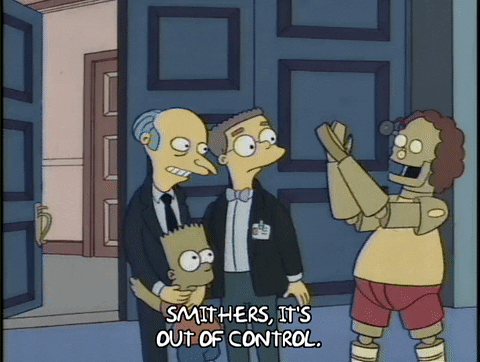 While applying a Louisiana statute, the Fifth Circuit reviewed federal securities law in Firefighters’ Retirement System v. Citco Group Ltd. and concluded that the defendants were not “control persons.” The substantive issue involved “material omissions from [an] offering memorandum”; thus, “to establish that the [defendants] were control persons, the pension plans must show that they had the ability to control the content of the offering memorandum.” The Court noted evidence that (a) the defendants “provided back-office administrative services” to the company at issue and could have stopped providing those services, (b) had made a loan that could have been called, and (c) “held … voting shares for administrative convenience” in a relevant entity, and found this evidence insufficient. No. 20-30654 (March 31, 2021).
While applying a Louisiana statute, the Fifth Circuit reviewed federal securities law in Firefighters’ Retirement System v. Citco Group Ltd. and concluded that the defendants were not “control persons.” The substantive issue involved “material omissions from [an] offering memorandum”; thus, “to establish that the [defendants] were control persons, the pension plans must show that they had the ability to control the content of the offering memorandum.” The Court noted evidence that (a) the defendants “provided back-office administrative services” to the company at issue and could have stopped providing those services, (b) had made a loan that could have been called, and (c) “held … voting shares for administrative convenience” in a relevant entity, and found this evidence insufficient. No. 20-30654 (March 31, 2021).
 In an appeal from a reduction of an attorney-fee award in an unpaid-overtime case, the Fifth Circuit affirmed. Among other matters, it noted the interplay of the required “lodestar” calculation with other factors to be considered later in the analysis: “As to the fifteen-percent reduction of the lodestar under the Johnson actors, the magistrate judge was careful to avoid so-
In an appeal from a reduction of an attorney-fee award in an unpaid-overtime case, the Fifth Circuit affirmed. Among other matters, it noted the interplay of the required “lodestar” calculation with other factors to be considered later in the analysis: “As to the fifteen-percent reduction of the lodestar under the Johnson actors, the magistrate judge was careful to avoid so- called ‘double counting’ to the extent that a factor was already accounted for in the initial lodestar determination. Among the factors that were not already subsumed by the lodestar calculation, the magistrate judge emphasized that the success achieved is the most important factor and then also considered the novelty of the issues and preclusion of other employment.” Rodney v. Elliott Security Solutions, No. 20-30251 (April 1, 2021) (unpublished).
called ‘double counting’ to the extent that a factor was already accounted for in the initial lodestar determination. Among the factors that were not already subsumed by the lodestar calculation, the magistrate judge emphasized that the success achieved is the most important factor and then also considered the novelty of the issues and preclusion of other employment.” Rodney v. Elliott Security Solutions, No. 20-30251 (April 1, 2021) (unpublished).
Plaintiffs, businesses that supply information to credit bureaus, sued Lexington Law, a consumer-advocacy organization, for fraud in its preparation of demand letters by consumers. CBE Group v. Lexington Law Firm, No. 20-10166 (April 1, 2021). The Fifth Circuit affirmed JNOV for the law firm, observing problems with the plaintiff’s evidence of:
- A contract. “While Chavarria and Garza may have misunderstood the process through which Lexington Law would represent them (and that misunderstanding may have been prompted by the firm’s actions), they were still bound by the terms of an engagement agreement the validity of which is not in doubt.”
- Reasonable reliance. “Once Plaintiffs developed suspicions that the letters may not have been sent from consumers themselves, they incurred costs in investigating correspondence on their own accord rather than because of the FCRA or the FDCPA. Indeed, Plaintiffs’ internal policies require them to investigate and respond to dispute letters sent by consumers and third parties alike. Thus, Plaintiffs fraud claim falls short for the additional reason that they did not justifiably rely on any alleged misrepresentation.”
The empire of  Genghis Khan stretched across thousands of miles, conquering all that it encountered. While at times, the doctrine of ERISA preemption seems to have a similar track record, it encountered a limit in Atkins v. CB&I, LLC, a dispute about whether a severance plan came within ERISA’s scope. The Fifth Circuit observed that the plan lacked “the ongoing administrative scheme characteristic of an ERISA plan,” specifically noting that it “calls only for a single payment,” the “simplicity of calculating the one-time payment,” that no discretionary decisions were called for as to the specific plaintiffs in this case, and that the situation did not present “any special administrative apparatus dedicated to overseeing the Plan.” No. 20-30004 (March 22, 2021).
Genghis Khan stretched across thousands of miles, conquering all that it encountered. While at times, the doctrine of ERISA preemption seems to have a similar track record, it encountered a limit in Atkins v. CB&I, LLC, a dispute about whether a severance plan came within ERISA’s scope. The Fifth Circuit observed that the plan lacked “the ongoing administrative scheme characteristic of an ERISA plan,” specifically noting that it “calls only for a single payment,” the “simplicity of calculating the one-time payment,” that no discretionary decisions were called for as to the specific plaintiffs in this case, and that the situation did not present “any special administrative apparatus dedicated to overseeing the Plan.” No. 20-30004 (March 22, 2021).
Douglas v. Wells Fargo Bank notes two different approaches that the Fifth Circuit has taken to an aspect of summary-judgment practice: “We have previously addressed the issue of new claims raised for the first time in response to a motion for summary judgment. We have taken two different approaches. The first approach states that a ‘claim which is not raised in the complaint but, rather, is raised only in response to a motion for summary judgment is not properly before the court.’ The second approach
instructs the district court to treat a new claim raised in response to a motion for summary judgment as a request for leave to amend. The district court must then determine whether leave should be granted.” No. 18-11567 (March 26, 2021) (footnotes omitted).
 The question whether “manifest disregard of the law” allows a court to vacate an arbitration award lingered in the case law since Hall Street Assocs. v. Mattel, Inc., 552 U.S. 576 (2008), which held that an arbitration agreement cannot create a ground for vacatur or modification beyond those set out in the FAA.
The question whether “manifest disregard of the law” allows a court to vacate an arbitration award lingered in the case law since Hall Street Assocs. v. Mattel, Inc., 552 U.S. 576 (2008), which held that an arbitration agreement cannot create a ground for vacatur or modification beyond those set out in the FAA.
Jones v. Michaels Stores provided “an opportunity to resolve at least one thing that we have directly resolved [about Hall Street]: ‘manifest disregard of the law as an independent, nonstatutory ground for setting aside an award must be abandoned and rejected.” No. 20-30428 (March 15, 2021) (quoting Citigroup Global Markets, Inc. v. Bacon, 562 F.3d 349, 358 (5th Cir. 2009)).
But what of McKool Smith, P.C. v. Curtis Int’l, Ltd., 650 F. App’x 208 (5th Cir. 2016) (per curiam)? Jones clarified that McKool Smith was a case “in which a party argued that an arbitrator’s manifest disregard of the law showed that he had ‘exceeded [his] powers within the meaning of 9 U.S.C. § 10(a)(4).” In that case, “[b]eecause of uncertainty about whether the manifest-disregard standard could still be used as a means of establishing one of the statutory factors, McKool Smith assumed arguendo that it could because the standard was not met in any event.” In this case, however, “[a]s Jones does not invoke any statutory ground for vacatur, Citigroup Global was dispositive of Jones’s challenge to the arbitration award.
The DC Circuit’s recent style manual amendment that criticized the use of “Garamond” font has drawn national attention. As this matter has now become a pressing issue facing the federal courts, 600Camp weighs in with these thoughts, all of which are written in 14-point size: 
Accordingly, if you really like Garamond and are writing a brief with a word limit rather than a page limit, you should consider bumping the size up to 15-point. And of course, in a jurisdiction with page limits rather than word limits, Garamond offers a way to add more substance to your submission–but be careful that this extra substance does not come at the price of less visibility.
Recent orders set these matters for en banc reconsideration:
US v. Dubin, in which the panel held: “An issue of first impression for our court is whether David Dubin’s fraudulently billing Medicaid for services not rendered constitutes an illegal ‘use’ of ‘a means of identification of another person’, in violation of 18 U.S.C. § 1028A.”
 Daves v. Dallas County, an Ex Parte Young case in which the panel held: “With one exception, we agree with the district court that the Plaintiffs have standing. This suit was properly allowed to proceed against most of the judges and the County. As for the Criminal District Court Judges, though, we hold that they are not proper defendants because the Plaintiffs lack standing as to them and cannot overcome sovereign immunity. We also disagree with the district court and hold that the Sheriff can be enjoined to prevent that official’s enforcement of measures violative of federal law.”
Daves v. Dallas County, an Ex Parte Young case in which the panel held: “With one exception, we agree with the district court that the Plaintiffs have standing. This suit was properly allowed to proceed against most of the judges and the County. As for the Criminal District Court Judges, though, we hold that they are not proper defendants because the Plaintiffs lack standing as to them and cannot overcome sovereign immunity. We also disagree with the district court and hold that the Sheriff can be enjoined to prevent that official’s enforcement of measures violative of federal law.”
Hewitt v. Helix Energy Solutions Group, a 2-1 decision involving “a legal question common to all executive, administrative, and professional employees—and to the modestly and highly compensated alike: whether a worker is paid ‘on a salary basis’ under” the Fair Labor Standards Act.
The Fifth Circuit granted a motion for sanctions as to a motion to supplement the record in Texas Alliance for Retired Americans v. Hugh); the key fact involved the duty of candor to the tribunal: “Appellees did not notify the court that their latest motion to supplement the record filed on February 10, 2021 was nearly identical to the motion to supplement the record filed several months ago by the same attorneys, on September 29, 2020. Critically, Appellees likewise failed to notify the court that their previous and nearly identical motion was denied. This inexplicable failure to disclose the earlier denial of their motion violated their duty of candor to the court.” No. No. 20-40643 (March 11, 2021).
 While written in a criminal appeal, Judge Oldham’s recent concurrence about specificity in error preservation is of broad general interest; he concludes:
While written in a criminal appeal, Judge Oldham’s recent concurrence about specificity in error preservation is of broad general interest; he concludes:
“[A] general declaration of ‘insufficient evidence!’ is not a meaningful objection. It challenges no particular legal error. It identifies no particular factual deficiency. It does nothing to focus the district judge’s mind on anything. It’s the litigator’s equivalent of freeing the beagles in a field that might contain truffles. Cf. del Carpio Frescas, 932 F.3d at 331 (“Judges are not like pigs, hunting for truffles buried in the record.” (quotation omitted)). Rather, if the defendant wants to preserve an insufficient-evidence challenge for de novo review, he must make a proper motion under Federal Rule of Criminal Procedure 29 and ‘specify at trial the particular basis on which acquittal is sought so that the Government and district court are provided notice.'”
United States v. Kieffer, No. 19-30225-CR (March 19, 2021). Notes: (1) A big 600Camp thanks to Jeff Levinger for drawing my attention to this case, and (2) Judge Oldham correctly notes that beagles are superior to pigs for finding truffles, as pigs tend to eat the valuable truffles after locating them.
 28 USC § 1631 says: “Whenever a civil action is filed in a court as defined in section 610 of this title . . . and that court finds that there is a want of jurisdiction, the court shall, if it is in the interest of justice, transfer such action or appeal to any other such court . . . in which the action or appeal could have been brought at the time it was filed . . ., and the action or appeal shall proceed as if it had been filed in . . . the court to which it is transferred on the date upon which it was actually filed in . . . the court from which it is transferred.” In Franco v. Mabe Trucking Co., the Fifth Circuit concluded that “want of jurisdiction” included both personal and subject-matter jurisdiction, observing: “[I]t appears no circuit split currently exists on this issue, and while we cannot predict how those circuits who have left the question open will ultimately resolve the matter, we decline to now create a split by adopting an overly restrictive reading of § 1631. Because no amount of legislative history can defeat unambiguous statutory text, we join the weight of circuit authority and conclude that the use of the term ‘jurisdiction’ in § 1631 encompasses both subject-matter and personal jurisdiction.” No. 19-30316 (March 18, 2021) (footnote and citation omitted). The Court also found no Erie problem in section 1631’s definition of the relevant filing date for limitations purposes.
28 USC § 1631 says: “Whenever a civil action is filed in a court as defined in section 610 of this title . . . and that court finds that there is a want of jurisdiction, the court shall, if it is in the interest of justice, transfer such action or appeal to any other such court . . . in which the action or appeal could have been brought at the time it was filed . . ., and the action or appeal shall proceed as if it had been filed in . . . the court to which it is transferred on the date upon which it was actually filed in . . . the court from which it is transferred.” In Franco v. Mabe Trucking Co., the Fifth Circuit concluded that “want of jurisdiction” included both personal and subject-matter jurisdiction, observing: “[I]t appears no circuit split currently exists on this issue, and while we cannot predict how those circuits who have left the question open will ultimately resolve the matter, we decline to now create a split by adopting an overly restrictive reading of § 1631. Because no amount of legislative history can defeat unambiguous statutory text, we join the weight of circuit authority and conclude that the use of the term ‘jurisdiction’ in § 1631 encompasses both subject-matter and personal jurisdiction.” No. 19-30316 (March 18, 2021) (footnote and citation omitted). The Court also found no Erie problem in section 1631’s definition of the relevant filing date for limitations purposes.
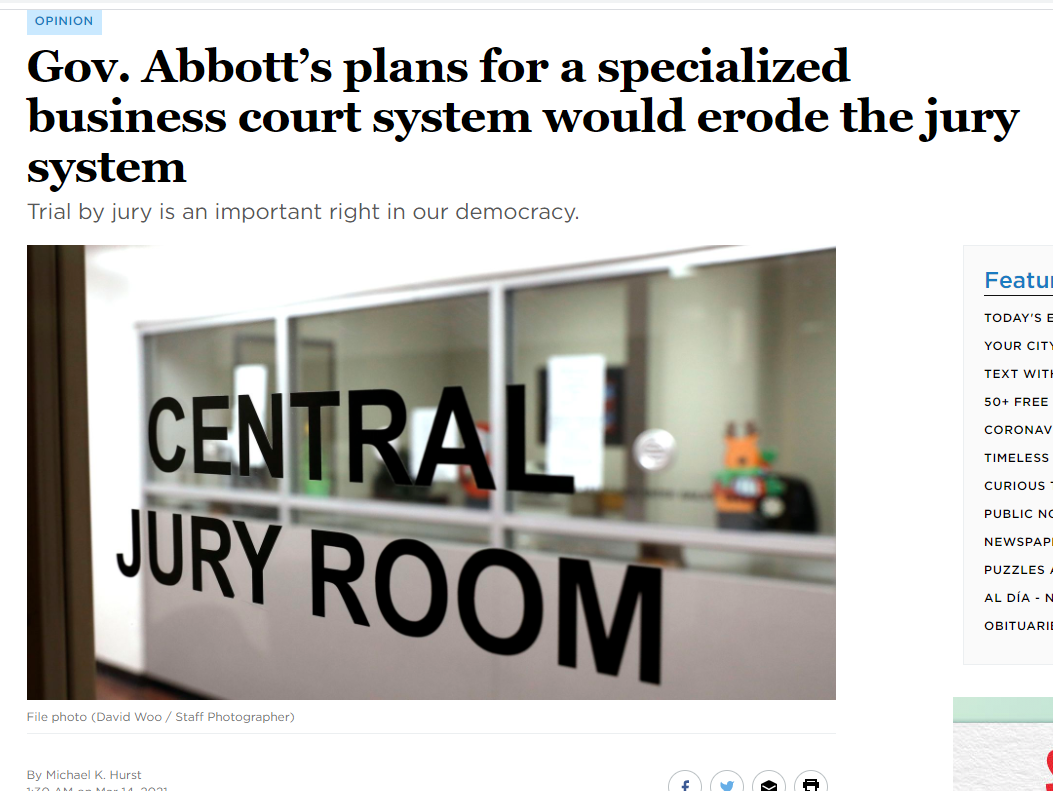 My colleague Michael Hurst wrote an insightful op-ed in the Dallas Morning News about a proposed system of specialized business courts for Texas. He questions whether it fits well with constitutional guaranties of the right to jury trial.
My colleague Michael Hurst wrote an insightful op-ed in the Dallas Morning News about a proposed system of specialized business courts for Texas. He questions whether it fits well with constitutional guaranties of the right to jury trial.
 Another voice joined the chorus of appellate observations about perceived excesses involving sealed records in Le v. Exeter Fin. Corp.: “[E]ntrenched litigation practices harden over time, including overbroad sealing practices that shield judicial records from public view for unconvincing (or unarticulated) reasons. Such stipulated sealings are not uncommon. But they are often unjustified. With great respect, we urge litigants and our judicial colleagues to zealously guard the public’s right of access to judicial records their judicial records—so ‘that justice may not be done in a corner.'” No. 20-10377 (March 3, 2021).
Another voice joined the chorus of appellate observations about perceived excesses involving sealed records in Le v. Exeter Fin. Corp.: “[E]ntrenched litigation practices harden over time, including overbroad sealing practices that shield judicial records from public view for unconvincing (or unarticulated) reasons. Such stipulated sealings are not uncommon. But they are often unjustified. With great respect, we urge litigants and our judicial colleagues to zealously guard the public’s right of access to judicial records their judicial records—so ‘that justice may not be done in a corner.'” No. 20-10377 (March 3, 2021).
Equity takes many forms; in Louisiana landlord-tenant law, it manifests as the doctrine of “judicial control.” In Richards Clearview LLC v. Bed Bath & Beyond, the Fifth Circuit observed: “[E]ven assuming arguendo that BB&B defaulted on the lease, the ‘unusual circumstances’ of this case—pandemic-related office closures causing delays in the receipt of notice coupled with prompt efforts to rectify the asserted underpayments— warranted the district court’s exercise of judicial control.” No. 20-30614 (March 8, 2021) (unpublished).
The Fifth Circuit concluded that a magistrate judge lacked jurisdiction to enter final judgment. The parties had conducted an entire wrongful-foreclosure case before a magistrate judge–but, early in the case, on the standard form, PNC expressly declined to allow trial by a magistrate judge. The Court concluded that consent could not be implied in the face of this express refusal. PNC Bank v. Ruiz, No. 20-50255 (March 2, 2021).
 During Hurricane Harvey, “to prevent the Lake Conroe Dam from overflowing and failing, the San Jacinto River Authority released from the dam 79,141 cubic feet of water per second—nearly the flow rate of Niagara Falls.” The resulting surge of water destroyed 22 boat slips owned by a condo association, which sought to recover from its insurer. The Fifth Circuit affirmed judgment for the condo association, noting:
During Hurricane Harvey, “to prevent the Lake Conroe Dam from overflowing and failing, the San Jacinto River Authority released from the dam 79,141 cubic feet of water per second—nearly the flow rate of Niagara Falls.” The resulting surge of water destroyed 22 boat slips owned by a condo association, which sought to recover from its insurer. The Fifth Circuit affirmed judgment for the condo association, noting:
- legally, while the policy’s Flood Endorsement says: “We will not pay for loss or damage caused by ‘flood’, arising from . . . [a h]urricane or tropical storm,” it defined a “flood” as “a general and temporary condition of partial or
complete inundation of 2 or more acres of normally dry land areas or of 2 or
more distinct parcels of land (at least one of which is your property) with
water”–and thus does not reach the boat slips, which were on water; - factually, the association offered evidence that the water release “created a suction effect, like a sink drain that is unplugged, but on a much greater scale. Because of the rate at which water was being released, the water on the north side of [the] lake (where the Boat Slips are located) was below normal levels afterwards, despite the rainfall brought by Harvey.”
Playa Vista Conroe v. Ins. Co. of the West, No. 20-20307 (March 5, 2021).
 A class of plaintiffs settled with several insurance companies, resolving various disputes about a large sinkhole caused by years of salt mining by Texas Brine Co. Texas Brine objected to the settlement and the Fifth Circuit found that it lacked standing to do so. While “[n]on-settling
A class of plaintiffs settled with several insurance companies, resolving various disputes about a large sinkhole caused by years of salt mining by Texas Brine Co. Texas Brine objected to the settlement and the Fifth Circuit found that it lacked standing to do so. While “[n]on-settling  parties generally lack standing to object to a settlement agreement,” “[a] potential exception exists ‘if the settlement agreement purports tot strip non-settling defendants of rights to contribution or indemnity.” Here, Texas Brine did not not have any right to indemnification or contribution from these insurers for the remaining claims, so it lacked standing to object to the settlement. LeBlanc v. Texas Brine Co., LLC, No. 20-30208 (March 1, 2021).
parties generally lack standing to object to a settlement agreement,” “[a] potential exception exists ‘if the settlement agreement purports tot strip non-settling defendants of rights to contribution or indemnity.” Here, Texas Brine did not not have any right to indemnification or contribution from these insurers for the remaining claims, so it lacked standing to object to the settlement. LeBlanc v. Texas Brine Co., LLC, No. 20-30208 (March 1, 2021).
WickFire won a tortious-interference judgment against TriMax. It claimed that TriMax “committed ‘click fraud’ by repeatedly clicking on WickFire’s advertisements without any intention of making purchases,” which has the effect of driving up WickFire’s costs without any corresponding increase in revenues. The Fifth Circuit reversed, noting:
- Tortious interference with contract. “WickFire produced evidence that a third party had a deleterious financial effect on its bottom line. But as was the case in El Paso Healthcare System, the record here fails to indicate that WickFire’s damages occurred because a co-contracting party breached its agreement with WickFire.”
- Tortious interference with prospective business relations. “WickFire’s damages theory for this claim was grounded in the assertions that TriMax’s tortious conduct delayed the development of TheCoupon.co website by six months and that WickFire lost $334,000 in profits because of that delay. When WickFire’s damages expert was asked how he calculated that dollar figure, the expert said that he had ‘quantified those damages by calculating the amount of profits that [WickFire] lost because of the six-month delay.’ He did not testify as to how he performed that calculation, nor did he point to any data concerning the business generated by TheCoupon.co. This evidence is threadbare and conclusory.”
Wickfire LLC v. Woodruff, No. 17-50340 (Feb. 26, 2021).
The plaintiff in Fontana v. H O V G L L C alleged that a debt collector violated the Fair Debt Collection Act by speaking with his sister. His claim failed because the FDCA requires a “communication,” and in this case: “[T]he conversation between HOVG’s representative and Fontana’s sister did not convey any information regarding a debt, either directly or indirectly. HOVG’s representative did not mention Fontana’s debt at all and did not directly provide any information about it. Instead, HOVG’s representative mentioned ‘an important personal business matter.’ That does not even suggest the existence of a debt, much less provide information about it. The closest HOVG’s representative came to giving information about a debt was providing the name of the debt collector.” No. 20-30471 (Feb. 26, 2021).
 A Louisiana statute lets private citizens sue to enforce certain state environmental laws, provided that “any injunction the citizen might obtain must be entered in favor of the Commissioner of Louisiana’s Office of Conservation.” Straightforward substantively, this statute raises federal-jurisdiction questions “that would make for a tough Federal Courts exam.” Grace Ranch LLC v. BP Am. Prod. Co., No. 20-30224 (Feb. 26, 2021). Specifically:
A Louisiana statute lets private citizens sue to enforce certain state environmental laws, provided that “any injunction the citizen might obtain must be entered in favor of the Commissioner of Louisiana’s Office of Conservation.” Straightforward substantively, this statute raises federal-jurisdiction questions “that would make for a tough Federal Courts exam.” Grace Ranch LLC v. BP Am. Prod. Co., No. 20-30224 (Feb. 26, 2021). Specifically:
- Is Louisiana a party to the suit? If so, diversity jurisdiction does not apply. The Fifth Circuit concluded that it was not a party, notwithstanding the potential for relief issued in its name, “because [Louisiana] has not authorized landowners to
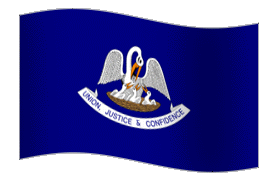 sue in its name” in the relevant statute. Similarly, Louisiana is not a real party in interest because the potential for an injunction in its favor is a “contingency,” which would make it “highly inefficient to remand the case to state court only at the end stage of the lawsuit when the injunction might issue.”
sue in its name” in the relevant statute. Similarly, Louisiana is not a real party in interest because the potential for an injunction in its favor is a “contingency,” which would make it “highly inefficient to remand the case to state court only at the end stage of the lawsuit when the injunction might issue.” - Does the 5th Circuit have jurisdiction? The matter was removed to federal court and the district court decided to abstain. Reviewing the not-always-clear history of 28 USC § 1447(c) and the cases applying it, the Court concluded that “a discretionary remand such as one on abstention grounds does not involve a removal ‘defect’ within the meaning of section 1447(c).”
 Was Burford abstention appropriate? Grace Ranch involved the remediation of environmental damage caused by a now-outlawed way of storing waste from oil and gas production. The Court reversed the district court’s decision to abstain, agreeing that the case presented “the potential need to decide an unsettled question of state law, in an area of general importance to the State”–but also finding that the case does not involve “an integrated state regulatory scheme in which a federal court’s tapping on one block in the Jenga tower might cause the whole thing to crumble.”
Was Burford abstention appropriate? Grace Ranch involved the remediation of environmental damage caused by a now-outlawed way of storing waste from oil and gas production. The Court reversed the district court’s decision to abstain, agreeing that the case presented “the potential need to decide an unsettled question of state law, in an area of general importance to the State”–but also finding that the case does not involve “an integrated state regulatory scheme in which a federal court’s tapping on one block in the Jenga tower might cause the whole thing to crumble.”
 Just over two years ago, in a single-judge order, Judge Costa rejected a request to seal the oral argument in a Deepwater Horizon claim dispute: “As its right, Claimant ID 100246928 has used the federal courts in its attempt to obtain millions of dollars it believes BP owes because of the oil spill. But it should not able to benefit from this public resource while treating it like a private tribunal when there is no good reason to do so. On Monday, the public will be able to access the courtroom it pays for.” BP Expl. & Prod. v. Claimant ID 100246928, 920 F.3d 209 (5th Cir. 2019). An echo of that order appears in a footnote in a mandamus order from earlier this week–unanimous as to substantive relief but with Judge Costa dissenting on the issue of sealing certain filings: “Judge Costa would not grant the motions to seal the motions and briefing, except for sealing the appendices filed in support of the petition in No. 21-40117, based on his conclusion that the parties have not overcome the right of public access to court filings.” A 2016 National Law Journal article further illustrated his views on these issues.
Just over two years ago, in a single-judge order, Judge Costa rejected a request to seal the oral argument in a Deepwater Horizon claim dispute: “As its right, Claimant ID 100246928 has used the federal courts in its attempt to obtain millions of dollars it believes BP owes because of the oil spill. But it should not able to benefit from this public resource while treating it like a private tribunal when there is no good reason to do so. On Monday, the public will be able to access the courtroom it pays for.” BP Expl. & Prod. v. Claimant ID 100246928, 920 F.3d 209 (5th Cir. 2019). An echo of that order appears in a footnote in a mandamus order from earlier this week–unanimous as to substantive relief but with Judge Costa dissenting on the issue of sealing certain filings: “Judge Costa would not grant the motions to seal the motions and briefing, except for sealing the appendices filed in support of the petition in No. 21-40117, based on his conclusion that the parties have not overcome the right of public access to court filings.” A 2016 National Law Journal article further illustrated his views on these issues.
 In Texas practice, “a judgment is final either if ‘it actually disposes of every pending claim and party’ or ‘it clearly and unequivocally states that it finally disposes of all claims and all parties.'” Bella Palma LLC v. Young, 601 S.W.3d 799, 801 (Tex. 2021) (emphasis in original, quoting Lehmann v. Har-Con Corp., 39 S.W.3d 191, 205 (Tex. 2001).
In Texas practice, “a judgment is final either if ‘it actually disposes of every pending claim and party’ or ‘it clearly and unequivocally states that it finally disposes of all claims and all parties.'” Bella Palma LLC v. Young, 601 S.W.3d 799, 801 (Tex. 2021) (emphasis in original, quoting Lehmann v. Har-Con Corp., 39 S.W.3d 191, 205 (Tex. 2001).
In federal practice, however, “[w]ithout a [Fed. R. Civ. P.] 54(b) order, ‘any order or other decision, however designated, that adjudicates fewer than all the claims or rights and liabilities of fewer than all the parties does not end the action as to any of the claims or parties.'” Guideone Ins. Co. v. First United Methodist Church of Hereford, No. 20-10528 (Feb. 22, 2021, unpublished) (emphasis in original, quoting Fed. R. Civ. P. 54).
The Texas Lawbook has a great story about a TRO battle in McAllen federal court between Laboratorios Pisa and PepsiCo that led to mandamus proceedings before the Fifth Circuit. This round of their battle ended in a short order late Sunday night that granted the petition; the response is available online but the Court granted PepsiCo’s request to seal its petition and related materials. No. 21-40116 (Feb. 21, 2021).
 On rehearing, the Fifth Circuit returned to the case of Echeverry v. Jazz Casino to make an Erie guess about Louisiana negligent-hiring law–specifically, whether it requires actual knowledge or only constructive knowledge. Finding its own precedent, and no on-point Louisiana Supreme Court opinion, the Court then reviewed intermediate-court opinions and
On rehearing, the Fifth Circuit returned to the case of Echeverry v. Jazz Casino to make an Erie guess about Louisiana negligent-hiring law–specifically, whether it requires actual knowledge or only constructive knowledge. Finding its own precedent, and no on-point Louisiana Supreme Court opinion, the Court then reviewed intermediate-court opinions and  “general Louisiana principles of negligence and negligent hiring outside of the context of independent contractors” to conclude that constructive knowledge was sufficient. It declined to certify the issue, reminding that “the availability of certification is such an important resource to this court that we will not risk its continued availability by going to that well too often.” No. 20-30038 (Feb. 17, 2021) (on rehearing).
“general Louisiana principles of negligence and negligent hiring outside of the context of independent contractors” to conclude that constructive knowledge was sufficient. It declined to certify the issue, reminding that “the availability of certification is such an important resource to this court that we will not risk its continued availability by going to that well too often.” No. 20-30038 (Feb. 17, 2021) (on rehearing).
 A trial court in the Northern District of Texas dismissed a case, under Fed. R. Civ. P. 41(b), because a lawyer based in the Eastern District did not retain local counsel as required by the local rules. That rule says that a defendant, or the court, “may move to dismiss the action or any claim against it” “[i]f the plaintiff fails to prosecute or to comply with these rules or a court order.” In Campbell v. Wilkinson, the Fifth Circuit concluded: “This case does not involve a violation of either ‘these rules’—that is, the Federal Rules of Civil Procedure—or ‘a court order.’ It involves the violation of a local rule. But Rule 41(b) does not mention local rules. This absence of any express reference to ‘local rules’ in Rule 41(b) thus raises the question whether it is ever appropriate to invoke Rule 41(b) based on nothing more than the violation of a local rule.” The Court concluded that it was not, and reversed because the record did not establish a failure to prosecute. No. 20-1102 (Feb. 19, 2021).
A trial court in the Northern District of Texas dismissed a case, under Fed. R. Civ. P. 41(b), because a lawyer based in the Eastern District did not retain local counsel as required by the local rules. That rule says that a defendant, or the court, “may move to dismiss the action or any claim against it” “[i]f the plaintiff fails to prosecute or to comply with these rules or a court order.” In Campbell v. Wilkinson, the Fifth Circuit concluded: “This case does not involve a violation of either ‘these rules’—that is, the Federal Rules of Civil Procedure—or ‘a court order.’ It involves the violation of a local rule. But Rule 41(b) does not mention local rules. This absence of any express reference to ‘local rules’ in Rule 41(b) thus raises the question whether it is ever appropriate to invoke Rule 41(b) based on nothing more than the violation of a local rule.” The Court concluded that it was not, and reversed because the record did not establish a failure to prosecute. No. 20-1102 (Feb. 19, 2021).
 Joint and several (or “solidary”) liability does not mean shared jurisdictional contacts: “Libersat argues that, because they are solidary obligors, each defendant’s respective contacts with Louisiana should be imputed to every other defendant. Libersat asks, ‘If two corporations are obligated for the same performance and can be judicially sanctioned for conduct related to said obligation irrespective of the presence of the other, are they not alter egos?’ No, they are not. Sharing liability is not the same as sharing an identity. As our colleagues in the Ninth Circuit explained, ‘Liability and jurisdiction are independent. . . . Regardless of their joint liability, jurisdiction over each defendant must be established individually.’ Lumping defendants together for jurisdictional purposes merely because they are solidary obligors ‘is plainly unconstitutional.'” Libersat v. Sundance Energy, No. 20-30121 (Oct. 26, 2020).
Joint and several (or “solidary”) liability does not mean shared jurisdictional contacts: “Libersat argues that, because they are solidary obligors, each defendant’s respective contacts with Louisiana should be imputed to every other defendant. Libersat asks, ‘If two corporations are obligated for the same performance and can be judicially sanctioned for conduct related to said obligation irrespective of the presence of the other, are they not alter egos?’ No, they are not. Sharing liability is not the same as sharing an identity. As our colleagues in the Ninth Circuit explained, ‘Liability and jurisdiction are independent. . . . Regardless of their joint liability, jurisdiction over each defendant must be established individually.’ Lumping defendants together for jurisdictional purposes merely because they are solidary obligors ‘is plainly unconstitutional.'” Libersat v. Sundance Energy, No. 20-30121 (Oct. 26, 2020).
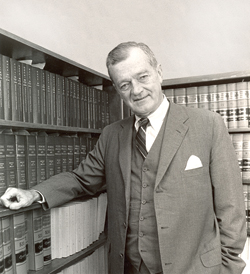 Vesting both enhances the image of a distinguished law professor. and creates an exception to the ordinary rule in Mississippi that a right conveyed by a statute comes to an end if the statute is repealed or modified. To qualify as “vested,” a right must satisfy two requirements. First, there must ‘be no condition precedent to the interest’s becoming a present estate’ and, second, it must be ‘theoretically possible to identify who would get the right to possession if the interest should become a present estate at any time.’ Put another way, it must be ‘not contingent’ upon a future event taking place.” As to the claimed right in Harper v. Southern Pine Elec Coop., “the legislature left it up to the board to determine when its revenues were no longer ‘needed’ for specified purposes. Only once the board makes that determination does the statute require it to return those revenues to the members. The right that plaintiffs assert, then, is contingent upon a determination of the board. And a right that is contingent is, definitionally, not vested.” No. 20-60451 (Feb. 8, 2021) (citations omitted).
Vesting both enhances the image of a distinguished law professor. and creates an exception to the ordinary rule in Mississippi that a right conveyed by a statute comes to an end if the statute is repealed or modified. To qualify as “vested,” a right must satisfy two requirements. First, there must ‘be no condition precedent to the interest’s becoming a present estate’ and, second, it must be ‘theoretically possible to identify who would get the right to possession if the interest should become a present estate at any time.’ Put another way, it must be ‘not contingent’ upon a future event taking place.” As to the claimed right in Harper v. Southern Pine Elec Coop., “the legislature left it up to the board to determine when its revenues were no longer ‘needed’ for specified purposes. Only once the board makes that determination does the statute require it to return those revenues to the members. The right that plaintiffs assert, then, is contingent upon a determination of the board. And a right that is contingent is, definitionally, not vested.” No. 20-60451 (Feb. 8, 2021) (citations omitted).
 The “Official Stanford Investors Committee” (“OSIC”), a creation of the receivership arising from the Allen Stanford Ponzi scheme, sought to intervene in ongoing tort litigation about the scheme. The Fifth Circuit affirmed the denial of OSIC’s request.
The “Official Stanford Investors Committee” (“OSIC”), a creation of the receivership arising from the Allen Stanford Ponzi scheme, sought to intervene in ongoing tort litigation about the scheme. The Fifth Circuit affirmed the denial of OSIC’s request.
Fed. R. Civ. P. 24(a)(2) sets four requirements for an application to intervene. The first requirement, timeliness, is also defined by reference to four factors. (1) the length of time the movant waited to file, (2) the prejudice to the existing parties from any delay, (3) the prejudice to the movant if intervention is denied, and (4) any unusual circumstances. Here, noting no unusual circumstances, the Court reasoned:
- Length of time. “Using the denial of class certification as the relevant starting point, Appellants waited 18 months before moving to intervene. … In many of our cases where we have found intervention motions to be timely, the delay was much shorter.”
- Prejudice to parties. “The existing parties would experience prejudice in at least two ways if Appellants were granted leave to intervene after a delay of 18 months. First, the existing parties would face a second round of fact discovery, significantly increasing litigation costs. …Second, Appellants’ tardiness will delay final distribution of any recovery.”
- Prejudice to intervenor. After reviewing the complex standing issues surrounding the Stanford claims: “The denial of intervention will not exclude Appellants from recovery even if it were to prejudice them in some way.”
Rotstain v. OSIC, No. 19-11131 (Feb. 3, 2021).
 DM Arbor Court v. City of Houston explains that a case may become ripe during the course of the appeal process: “Although some of the ripeness-on-appeal caselaw is couched in the language of discretion, our best reading of the decisions—especially those from the Supreme Court—is that ‘[i]ntervening events that occur after decision in lower courts should be included’ when an appellate court assesses ripeness. Supporting this view is the City’s inability to cite any case in which an appellate court declined to find a dispute ripe when postjudgment events had made it so. And we have an obligation to exercise the jurisdiction Article III and Congress grant us when any impediments, such as prudential concerns, have been eliminated. Cf.Colo. River Water Conservation Dist. v. United States, 424 U.S. 800, 813, 817 (1976) (recognizing that abstention ‘is an extraordinary and narrow exception’ to the ‘virtually unflagging obligation of the federal courts to exercise the jurisdiction given them’).” No. 20-20194 (Feb. 12, 2021) (other citations omitted).
DM Arbor Court v. City of Houston explains that a case may become ripe during the course of the appeal process: “Although some of the ripeness-on-appeal caselaw is couched in the language of discretion, our best reading of the decisions—especially those from the Supreme Court—is that ‘[i]ntervening events that occur after decision in lower courts should be included’ when an appellate court assesses ripeness. Supporting this view is the City’s inability to cite any case in which an appellate court declined to find a dispute ripe when postjudgment events had made it so. And we have an obligation to exercise the jurisdiction Article III and Congress grant us when any impediments, such as prudential concerns, have been eliminated. Cf.Colo. River Water Conservation Dist. v. United States, 424 U.S. 800, 813, 817 (1976) (recognizing that abstention ‘is an extraordinary and narrow exception’ to the ‘virtually unflagging obligation of the federal courts to exercise the jurisdiction given them’).” No. 20-20194 (Feb. 12, 2021) (other citations omitted).
 Mississippi Silicon (“MSH”), a manufacturer, was tricked into paying approximately $1 million to a cybercriminal, believing that it was in fact paying one of its regular vendors. MSH sought reimbursement under the “Computer Transfer Fraud” provision of an insurance policy, and the Fifth Circuit affirmed the district court’s conclusion that there was no coverage.
Mississippi Silicon (“MSH”), a manufacturer, was tricked into paying approximately $1 million to a cybercriminal, believing that it was in fact paying one of its regular vendors. MSH sought reimbursement under the “Computer Transfer Fraud” provision of an insurance policy, and the Fifth Circuit affirmed the district court’s conclusion that there was no coverage.
The provision said: “The insurer will pay for loss of . . . Covered Property resulting directly from Computer Transfer Fraud that causes the transfer, payment, or delivery of Covered Property from the Premises or Transfer Account to a person, place, or account beyond the Insured Entity’s control, without the Insured Entity’s knowledge or consent.”
But here: “Coverage under the Computer Transfer Fraud provision is available only when a computer-based fraud scheme causes a transfer of funds without the Insured’s knowledge or consent. Here, three MSH employees affirmatively authorized the transfer; it therefore cannot be said that the fraud caused a transfer without the
company’s knowledge. … [T]he agreement plainly limits coverage to instances in which the transfer is made without knowledge or consent.”
Mississippi Silicon Holdings v. Axis Ins. Co., No. 20-60215 (Feb. 4, 2021) (all emphasis in original).
 Section 9.343 of the Texas UCC contains a nonuniform provision, “which grants a first
Section 9.343 of the Texas UCC contains a nonuniform provision, “which grants a first
priority purchase money security interest in oil and gas produced in Texas as well as proceeds in the hands of any ‘first purchaser.’ A ‘first purchaser,’ is in pertinent part, ‘the first person that purchases oil or gas production from an operator or interest owner after the production is severed.’ The statute’s purpose is to ‘provide[] a security interest in favor of interest owners, as secured parties, to secure the obligations of the first purchaser of . . . production, as debtor, to pay the purchase price.’ It effectuates a ‘security interest’ that is ‘perfected automatically without the filing of a financing statement.'” (citations omitted). But Delaware lien-priority law does not recognize  nonuniform UCC provisions, and in Deutsche Bank Trust Co. Americas v. U.S. Energy Devel. Corp., the Fifth Circuit affirmed the bankruptcy court’s conclusion that Delaware law applied to the case before it. The Court observed: “The bankruptcy court adroitly untangled a thorny conflicts of law issue, the result of which, unfortunately, undermines the efficacy of a non-standard UCC provision intended to protect Texas oil and gas producers. . As a result, producers must beware ‘the amazing disappearing security interest’ and continue to file financing statements. The Texas legislature should take note.” No. 19-50646 (Feb. 3, 2021) (citations and footnote omitted).
nonuniform UCC provisions, and in Deutsche Bank Trust Co. Americas v. U.S. Energy Devel. Corp., the Fifth Circuit affirmed the bankruptcy court’s conclusion that Delaware law applied to the case before it. The Court observed: “The bankruptcy court adroitly untangled a thorny conflicts of law issue, the result of which, unfortunately, undermines the efficacy of a non-standard UCC provision intended to protect Texas oil and gas producers. . As a result, producers must beware ‘the amazing disappearing security interest’ and continue to file financing statements. The Texas legislature should take note.” No. 19-50646 (Feb. 3, 2021) (citations and footnote omitted).
An unusual Fed. R. Civ. P. 60(b)(5) proceeding did not create appellate jurisdiction: “This case does not yet involve a final determination of the status of the interpleaded funds. Instead, it involves Rule 60(b)(5) relief from a prior order to disburse funds. The district court was not disbursing funds to the other party, but merely ordering that they be returned to the court’s registry pending the outcome of the state court action on remand. As the district court said, there has been no decision on who is entitled to the money. The final judgment has been set aside. Thus, this court lacks jurisdiction to hear this appeal.” Reed Migraine Centers of Texas v. Chapman, No. 20-10156 (Jan. 28, 2021).
 At issue in Big Binder Express LLC v. Liberty Mutual Ins. Co. was the meaning of the term “you.” The Fifth Circuit concluded that the term “you” in the key endorsement about a large deductible, when given its “ordinary and generally accepted meaning,” referred only the named insured and not additional insureds. The Court also rejected the insured’s argument that “damages” meant only a court award of damages. No. 20-60188 (Jan. 27, 2021).
At issue in Big Binder Express LLC v. Liberty Mutual Ins. Co. was the meaning of the term “you.” The Fifth Circuit concluded that the term “you” in the key endorsement about a large deductible, when given its “ordinary and generally accepted meaning,” referred only the named insured and not additional insureds. The Court also rejected the insured’s argument that “damages” meant only a court award of damages. No. 20-60188 (Jan. 27, 2021).
Belliveau v. Barco, Inc., discussed yesterday as to its holding about veil-piercing, also found that the plaintiff had not established a fiduciary relationship with the defendants under Texas law. The Court examined:
- The general principle that “one party’s subjective belief” is insufficient to establish an attorney-client relationship;
- The inadequacy of “vague and conclusory” statements about the parties’ dealings to satisfy that standard (especially if later deposition testimony undermines those statements); and
- The long-standing principle that to establish an informal relationship of “trust and confidence,” that relationship must have existed before the “agreement made
the basis of the suit.”
No. 19-5017 (Jan. 28, 2021). The dissenting judge agreed with the majority on its analysis of this claim.
 In a dispute about various licensing agreements, the Fifth Circuit found that Texas law’s requirements for piercing the corporate veil had not been satisfied:
In a dispute about various licensing agreements, the Fifth Circuit found that Texas law’s requirements for piercing the corporate veil had not been satisfied:
“The evidence, when viewed as a whole, does not raise a fact issue regarding Barco’s dishonest purpose or intent to deceive Belliveau in entering into the Barco Sublicense. Piercing the corporate veil is not a cumulative remedy for creditors of corporate or other legal entities in Texas; that theory does not make owners of such entities codefendants for every breach of contract case. It is a remedy to be used when the actions of the entity’s owner amounting to ‘actual fraud’ have rendered the entity unable to pay its debts. The district court properly granted summary judgment on Belliveau’s claim to pierce the corporate veil.”
Specifically, the court reviewed (and rejected) arguments about the consideration exchanged in the licensing agreement, issues about disclosure, and a “badges of fraud” analysis under Texas’s fraudulent-transfer statute. Belliveau v. Barco, Inc., No. 19-50717 (Jan. 28, 2021). A dissent identified issues for trial on these matters.
 “Mindful of the fundamental right to fairness in every proceeding–both in fact, and in appearance,” the Fifth Circuit reversed the outcome in a Title VII dispute, and ordered the reassignment to a new district judge on remand, when:
“Mindful of the fundamental right to fairness in every proceeding–both in fact, and in appearance,” the Fifth Circuit reversed the outcome in a Title VII dispute, and ordered the reassignment to a new district judge on remand, when:
From the outset of these suits, the district judge’s actions evinced a prejudgment of Miller’s claims. At the beginning of the Initial Case Management Conference, the judge dismissed sua sponte Miller’s claims against TSUS and UHS, countenancing no discussion regarding the dismissal. Later in the same conference, the judge responded to the parties’ opposition to consolidating Miller’s two cases by telling Miller’s counsel, “I will get credit for closing two cases when I crush you. . . . How will that look on your record?”
And things went downhill from there. The court summarily denied Miller’s subsequent motion for reconsideration, denied Miller’s repeated requests for leave to take discovery (including depositions of material witnesses), and eventually granted summary judgment in favor of SHSU and UHD, dismissing all claims.”
Miller v. Sam Houston State, No. 19-20752 (Jan. 29, 2021).
 Shah sued about the alleged monopolization of pediatric anesthesiology services in Bexar County. The Fifth Circuit looked to its discussion of market definition in Surgical Care Center of Hammond, L.C. v. Hosp. Serv. Dist. No. 1, 309 F.3d 836, 840 (5th Cir. 2002), which looked for “a showing of where people could practicably go” to obtain the services at issue. Here, Shah failed to satisfy that standard: “He did not even specify individual pediatric anesthesiologists from whom patients could practicably obtain health care services. Rather, he provided tallies, by county, of pediatric anesthesiologists in Texas that fit the anesthesiology requirements of the BHS-STAR Agreement. Moreover, as the BHS parties argue, Shah’s proposed relevant market does not encompass all interchangeable substitute products because it does not include the two non-BHS facilities that the BHS parties contend serve as viable alternatives to BHS facilities. Shah has not provided evidence or any persuasive argument to raise a genuine dispute as to either of those facilities.” Shah v. VHS San Antonio Partners LLC, No. 20-50394 (Jan. 13, 2021).
Shah sued about the alleged monopolization of pediatric anesthesiology services in Bexar County. The Fifth Circuit looked to its discussion of market definition in Surgical Care Center of Hammond, L.C. v. Hosp. Serv. Dist. No. 1, 309 F.3d 836, 840 (5th Cir. 2002), which looked for “a showing of where people could practicably go” to obtain the services at issue. Here, Shah failed to satisfy that standard: “He did not even specify individual pediatric anesthesiologists from whom patients could practicably obtain health care services. Rather, he provided tallies, by county, of pediatric anesthesiologists in Texas that fit the anesthesiology requirements of the BHS-STAR Agreement. Moreover, as the BHS parties argue, Shah’s proposed relevant market does not encompass all interchangeable substitute products because it does not include the two non-BHS facilities that the BHS parties contend serve as viable alternatives to BHS facilities. Shah has not provided evidence or any persuasive argument to raise a genuine dispute as to either of those facilities.” Shah v. VHS San Antonio Partners LLC, No. 20-50394 (Jan. 13, 2021).
 An unusual procedural path, winding through a bankruptcy proceeding, led the Fifth Circuit to review a state-court summary judgment. On the issue of the state court’s evidentiary rulings, the Court applied a federal-court approach to a standard form of Texas practice, reasoning: “The grant of these objections improperly excluded important evidence from consideration. To start, the state trial court offered no explanation as to why it granted the objections. It simply checked boxes on a form saying that the objections were sustained. Since a trial court can abuse its discretion by failing to explain the reasons for excluding evidence, the lack of a reasoned explanation weighs in favor of overturning the objections. Courts also typically consider evidence unless the objecting party can show that it could not be reduced to an admissible form at trial.” Cohen v. Gilmore, No. 19-20152 (Dec. 15, 2020) (citations omitted).
An unusual procedural path, winding through a bankruptcy proceeding, led the Fifth Circuit to review a state-court summary judgment. On the issue of the state court’s evidentiary rulings, the Court applied a federal-court approach to a standard form of Texas practice, reasoning: “The grant of these objections improperly excluded important evidence from consideration. To start, the state trial court offered no explanation as to why it granted the objections. It simply checked boxes on a form saying that the objections were sustained. Since a trial court can abuse its discretion by failing to explain the reasons for excluding evidence, the lack of a reasoned explanation weighs in favor of overturning the objections. Courts also typically consider evidence unless the objecting party can show that it could not be reduced to an admissible form at trial.” Cohen v. Gilmore, No. 19-20152 (Dec. 15, 2020) (citations omitted).
 Prantil v. Arkema, No. 19-20723 (Jan. 22, 2021), involved class claims about property damage that resulted from a chemical explosion caused by Hurricane Harvey. The Fifth Circuit vacated and remanded the trial court’s class-certification order, holding:
Prantil v. Arkema, No. 19-20723 (Jan. 22, 2021), involved class claims about property damage that resulted from a chemical explosion caused by Hurricane Harvey. The Fifth Circuit vacated and remanded the trial court’s class-certification order, holding:
- “[T]he Daubert hurdle must be cleared when scientific evidence is relevant to the decision to certify”;
- The trial court’s Rule 23(b)(3) analysis fell short in its “discussion of how proof of Arkema’s conduct will affect trial”–specifically, on plaintiff-specific defensive issues about causation, injury, and damages; and
- As to injunctive relief, the order “leaves us uncertain” as to how the extent of necessary property remediation can be determined, and whether a responsive injunction can be fashioned to account for Arkema’s past remediation efforts”–especially if the injunction will rely on the analysis of the class’s experts.
The panel in Gonzalez v. CoreCivic, Inc., No. 19-50691 (Jan. 20, 2021), in the context of an interlocutory appeal certified under 28 USC § 1292, affirmed the denial of a motion to dismiss a claim based on the Trafficking Victims Protection Act of 2000. That law imposes civil liability on on e who “knowingly provides or obtains the labor or services of a person” by certain coercive means. The panel found that the text of the statute unambiguously reached the plaintiffs’ claims against a private company that operated detention facilities for ICE.
A dissent would have found that the plaintiff did not adequately state her claim under Twombly and Iqbal; in response, a concurrence argued that the concept of “party presentation” foreclosed the Court’s review of that matter. North Texas practitioners will recognize echoes of the debate among Justices about supplemental briefing from the Flakes litigation.
 Louisiana bar owners contended that a state COVID restriction violated the Equal Protection Clause. The Fifth Circuit disagreed:
Louisiana bar owners contended that a state COVID restriction violated the Equal Protection Clause. The Fifth Circuit disagreed:
“Unlike AG-permitted bars whose primary purpose is to serve alcohol, AR-permitted businesses must serve more food than alcohol to meet their monthly revenue requirements. Even if the Bar Closure Order’s classifications are based solely on the premise that venues whose primary purpose and revenue are driven by alcohol sales rather than food sales are more likely to increase the spread of COVID-19, such a rationale, as described by Dr. Billioux and the Governor and credited by both district courts, is sufficiently ‘plausible’ and not ‘irrational.”’ … [T]he Bar Closure Order’s differential treatment of bars operating with AG permits is at least rationally related to reducing the spread of COVID-19 in higher-risk environments.”
Big Tyme Investments, LLC v. Edwards, No. 20-30526 (Jan. 13, 2021) (citations omitted). The panel majority and a concurrence disputed the exact import of archaic-sounding language from Jacobson v. Massachusetts, 197 U.S. 11 (1905), but did not find it to materially impact the outcome under traditional Equal Protection principles.
 The appropriate “gatekeeping” procedures for FLSA cases, which involve the question whether claims are “similarly situated” and thus trigger notice obligations, was thoroughly reviewed in Swales v. KLLM Transport Services, No. 19-60847 (Jan. 12, 2021): “This case poses an issue that has been under-studied but whose importance cannot be overstated: how stringently, and how soon, district courts should enforce § 216(b)’s ‘similarly situated’ mandate. As explained above, the FLSA’s similarity requirement is something that district courts should rigorously enforce at the outset of the litigation.” In reaching this conclusion, the Fifth Circuit disapproved of the widely-cited analysis of this issue in Lusardi v. Xerox Corp., 975 F.2d 964 (3d Cir. 1992).
The appropriate “gatekeeping” procedures for FLSA cases, which involve the question whether claims are “similarly situated” and thus trigger notice obligations, was thoroughly reviewed in Swales v. KLLM Transport Services, No. 19-60847 (Jan. 12, 2021): “This case poses an issue that has been under-studied but whose importance cannot be overstated: how stringently, and how soon, district courts should enforce § 216(b)’s ‘similarly situated’ mandate. As explained above, the FLSA’s similarity requirement is something that district courts should rigorously enforce at the outset of the litigation.” In reaching this conclusion, the Fifth Circuit disapproved of the widely-cited analysis of this issue in Lusardi v. Xerox Corp., 975 F.2d 964 (3d Cir. 1992).
Echeverry v. Jazz Casino Co., LLC, No. 20-30038 (Jan.11, 2021), discussed yesterday, also reviewed the admissibility of four pieces of evidence in a personal-injury trial. The issue was the liability of the LLC that owns Harrah’s Casino in New Orleans for hiring a wildlife-removal contractor to work on its exterior landscaping (“AWR”). The Fifth Circuit found no abuse of discretion by the trial court in admitting them:
 The contractor’s “F” rating with the Better Business Bureau. “[T]he BBB evidence is not very probative of the safety and competency of AWR. Still, as we earlier discussed, it might have been properly used by jurors as evidence of the Casino’s failure to investigate AWR adequately. … The evidence of the BBB rating at least added to the jurors’ understanding that the Casino missed another of the markers that could have led to further inquiry, even if the inquiry would not have led to much of significance.”
The contractor’s “F” rating with the Better Business Bureau. “[T]he BBB evidence is not very probative of the safety and competency of AWR. Still, as we earlier discussed, it might have been properly used by jurors as evidence of the Casino’s failure to investigate AWR adequately. … The evidence of the BBB rating at least added to the jurors’ understanding that the Casino missed another of the markers that could have led to further inquiry, even if the inquiry would not have led to much of significance.”- The contractor’s certificate of insurance. “The Casino relies on Federal Rule of Evidence 411, which makes inadmissible the existence or nonexistence of insurance for purposes of proving or disproving a party’s negligence. … Here, AWR’s lack of insurance was not admitted on the issue of AWR’s negligence but to prove the Casino’s negligence in hiring AWR. Rule 411 was not violated.”
- The Casino’s internal policies. “While [an earlier unpublished case] held that internal policies did not establish the applicable standard of care, that panel did not go so far as to say that evidence that a principal violated its internal policies is irrelevant to the question of negligence. We conclude that failure to follow internal policies can be relevant. The district court did not abuse its discretion by admitting the evidence.” (citation omitted).
- Construction-site photos. “The district court did not abuse its discretion by admitting the evidence of construction sites. [Plainitff] sought to use the evidence of construction sites that had barricades to show that there should have been barricades in place to prevent her injury. The fact that the bird-removal site did not have barricades when similar construction sites did is some evidence
of a breach of the applicable standard of care, especially when the Casino’s expert made the comparison to construction sites.”
Echeverry v. Jazz Casino Co. illustrates a deferential review of a jury’s work in a case about a property owner’s control of construction work that caused injury. Procedurally, the case reminds that federal court does not strictly follow Texas’s Casteel approach to sufficiency review of multiple-theory cases: “This court employs a harmless-error ‘gloss,’ meaning that if we are ‘totally satisfied’ or ‘reasonably certain’ based on the focus of the evidence at trial that the jury’s verdict was not based on the theory with insufficient evidence, a new trial is unnecessary.” Substantively, the Court found sufficient evidence supported the verdict on each of the plaintiff’s three “theories of negligent hiring, operational control, and authorization of unsafe work practices.” No. 20-30038 (Jan. 11, 2021).
Taylor-Travis v. Jackson State Univ. applies the Fifth Circuit’s principles for review of alleged charge error, finding no abuse of discretion on a complicated question of causation in a discrimination case. No. 17-60856 (Jan. 6, 2020).
 The complexities of the McDonnell-Douglass framework were not at issue in Lindsley v. TRT Holdings, Inc., No. 10-`10623 (Jan. 7, 2021), in which the Fifth Circuit found that the appellant established a prima facie case of sex discrimination:
The complexities of the McDonnell-Douglass framework were not at issue in Lindsley v. TRT Holdings, Inc., No. 10-`10623 (Jan. 7, 2021), in which the Fifth Circuit found that the appellant established a prima facie case of sex discrimination:
It is undisputed that Lindsley was paid less than her three immediate predecessors as food and beverage director of Omni Corpus Christi. As a result, she has established a prima facie case of pay discrimination, and the district court erred in concluding otherwise.
First, it is undisputed that Lindsley was paid $4,149 less than Walker and $6,149 less than Pollard. It is also undisputed that Lindsley held the same job title at the same Omni hotel as those men. What’s more, Omni agrees that Lindsley established a prima facie case of pay discrimination as to Cornelius, who held the position directly after Pollard and Walker—and there is no evidence that the position has changed since then. This establishes a prima facie case of pay discrimination.
The district court therefore erred in concluding that Lindsley failed to establish a prima facie case because she “provide[d] no evidence that her job as Food and Beverage Director was in any way similar to Pollard and Walker’s jobs, aside from the fact that they shared the same job title.” Far from failing to show that her job was “in any way similar,” Lindsley showed that she held the same position as Walker and Pollard did, at the same hotel, just a few years after they did—and that she was paid lessthan they were. No more is needed to establish a prima facie case.
Did that recent SCOTUS opinion overrule older Circuit authority? “If a
precedent of this Court has direct application in a case, yet appears to rest on
reasons rejected in some other line of decisions, the Court of Appeals should
follow the case which directly controls, leaving to this Court the prerogative
of overruling its own decisions.” Baisley v. Int’l Assoc. of Machinists & Aerospace Workers, No. 20-50319 (Dec. 22, 2020) (quoting Rodriguez de Quijas v. Shearson/American Express, Inc., 490 U.S. 477, 484 (1989)).
“When Amazon allows third parties to sell products on its website, is Amazon ‘placing’ products into the stream of commerce or merely ‘facilitating’ the stream? If the former, then Amazon is a ‘seller’ under Texas products-liability law and potentially liable for injuries caused by unsafe products sold on its website. But if Amazon only facilitates the stream when it hosts third-party vendors on its platform, then it is not a seller, meaning injured consumers cannot sue for alleged product defects.” The Fifth Circuit certified this important issue to the Texas Supreme Court in McMillian v. Amazon, No. 20-20108 (Dec. 18, 2020).
Practice tip: In the Court’s review of whether the issue warranted certification, it noted that both parties had agreed that there was “substantial ground for difference of opinion” in order to proceed with an interlocutory appeal under 28 U.S.C. § 1292(b).
 The Twelfth Amendment says: “The President of the Senate shall, in the presence of the Senate and House of Representatives, open all the certificates and the votes shall then be counted.” By statute, that is to occur this year on January 6. That statute also lays out a procedure for handling objections to votes. Judge Jeremy Kernodle of Tyler rejected a challenge to that process, as the process is in detailed in Section 15 of 1887’s Electoral Count Act, stating: “Plaintiff Louie Gohmert, the United States Representative for Texas’s First Congressional District, alleges at most an institutional injury to the House of Representatives. Under well settled Supreme Court authority, that is insufficient to support standing.” Gohmert v. Pence, No. 6:20-cv-660-JDK (E.D. Tex. Jan. 1, 2020).
The Twelfth Amendment says: “The President of the Senate shall, in the presence of the Senate and House of Representatives, open all the certificates and the votes shall then be counted.” By statute, that is to occur this year on January 6. That statute also lays out a procedure for handling objections to votes. Judge Jeremy Kernodle of Tyler rejected a challenge to that process, as the process is in detailed in Section 15 of 1887’s Electoral Count Act, stating: “Plaintiff Louie Gohmert, the United States Representative for Texas’s First Congressional District, alleges at most an institutional injury to the House of Representatives. Under well settled Supreme Court authority, that is insufficient to support standing.” Gohmert v. Pence, No. 6:20-cv-660-JDK (E.D. Tex. Jan. 1, 2020).
A Fifth Circuit motions panel (Higginbotham, Smith, Oldham) dismissed an effort at immediate appeal:
 The plaintiffs in Molina-Aranda v. Black Magic Enterprises alleged RICO violations based on a scheme to bring them to the US under H2-B visas, but not pay accordingly. The Fifth Circuit affirmed the dismissal of their claims on causation grounds, observing: “Understating the type of work to be done may have supported obtaining the visas, but it was not the cause of underpayment; indeed, if one accepts the Plaintiffs’ allegations, truthfulness would likely have resulted in a lack of visas, keeping Plaintiffs from being able to come to the United States in the first place. But, critically, Plaintiffs’ reduced wages were several steps in the causal chain away from the transmission of fraudulent forms; nothing about the forms required underpayment. To even have the opportunity to underpay Plaintiffs, the Ramirezes had to submit fraudulent forms, obtain authorization, and bring the Plaintiffs to the United States for work. Only then could the Ramirezes actually underpay Plaintiffs.” No. 19-50638 (Dec. 21, 2020) (emphasis added).
The plaintiffs in Molina-Aranda v. Black Magic Enterprises alleged RICO violations based on a scheme to bring them to the US under H2-B visas, but not pay accordingly. The Fifth Circuit affirmed the dismissal of their claims on causation grounds, observing: “Understating the type of work to be done may have supported obtaining the visas, but it was not the cause of underpayment; indeed, if one accepts the Plaintiffs’ allegations, truthfulness would likely have resulted in a lack of visas, keeping Plaintiffs from being able to come to the United States in the first place. But, critically, Plaintiffs’ reduced wages were several steps in the causal chain away from the transmission of fraudulent forms; nothing about the forms required underpayment. To even have the opportunity to underpay Plaintiffs, the Ramirezes had to submit fraudulent forms, obtain authorization, and bring the Plaintiffs to the United States for work. Only then could the Ramirezes actually underpay Plaintiffs.” No. 19-50638 (Dec. 21, 2020) (emphasis added).
 The Fifth Circuit affirmed a summary judgment in favor of a business that had been accused of being a “control person” under Louisiana securities laws. “As the district court recognized, the contract between STC and SEI is strong evidence that SEI was unable to control STC’s primary violations. The contract made STC responsible for pricing the SIBL CDs and for providing accurate information to SEI. The contract does not assign any role to SEI in the sale or valuation of SIBL CDs. Further, as the district court noted, the investors’ ‘pleadings contain no evidence demonstrating that the relationship between the companies differed from that contemplated in the
The Fifth Circuit affirmed a summary judgment in favor of a business that had been accused of being a “control person” under Louisiana securities laws. “As the district court recognized, the contract between STC and SEI is strong evidence that SEI was unable to control STC’s primary violations. The contract made STC responsible for pricing the SIBL CDs and for providing accurate information to SEI. The contract does not assign any role to SEI in the sale or valuation of SIBL CDs. Further, as the district court noted, the investors’ ‘pleadings contain no evidence demonstrating that the relationship between the companies differed from that contemplated in the
contract.'” The Court then reviewed, and rejected, evidence about the types of work done by the defendant as a service provider. Ahders v. SEI Private Trust Co., No. 20-30186 (Dec. 3, 2020).
 When you next want to pose a question in your writing, and really really emphasize it, please consider . . . the Interrobang! Wikipedia suggests the below examples of when the Interrobang may be just the punctuation mark you’re looking for. (H/T to Lucy Forbes of Houston for her knowledge of unconventional punctuation marks)
When you next want to pose a question in your writing, and really really emphasize it, please consider . . . the Interrobang! Wikipedia suggests the below examples of when the Interrobang may be just the punctuation mark you’re looking for. (H/T to Lucy Forbes of Houston for her knowledge of unconventional punctuation marks)
 A Buddhist group sued for alleged infringement of the mark “Unified Buddhist Church of Vietnam” and two others. The Fifth Circuit concluded that of the seven relevant factors about secondary meaning, “only the first factor—the length and manner of use of the Unified Church’s asserted marks—has evidence weighing in favor of the marks having developed protectable secondary meaning.” On the record presented, that evidence alone was insufficient to justify a finding for the plaintiff, and the Court affirmed a defense summary judgment. The Unified Buddhist Church of Vietnam v. Unified Buddhist Church of Vietnam – Giao Hoi Phat Giao Viet Nam Thong Nhat, No. 19-20544 (Dec. 14, 2020, unpublished). (Relatedly, the Fifth Circuit recently affirmed the denial of a preliminary injunction in Future Proof Brands v. Molson Coors, based on a review of the “digits of confusion” as developed on that record, No. No. 20-50323 (Dec. 3, 2020, unpublished). Our firm represented the appellant in that matter.)
A Buddhist group sued for alleged infringement of the mark “Unified Buddhist Church of Vietnam” and two others. The Fifth Circuit concluded that of the seven relevant factors about secondary meaning, “only the first factor—the length and manner of use of the Unified Church’s asserted marks—has evidence weighing in favor of the marks having developed protectable secondary meaning.” On the record presented, that evidence alone was insufficient to justify a finding for the plaintiff, and the Court affirmed a defense summary judgment. The Unified Buddhist Church of Vietnam v. Unified Buddhist Church of Vietnam – Giao Hoi Phat Giao Viet Nam Thong Nhat, No. 19-20544 (Dec. 14, 2020, unpublished). (Relatedly, the Fifth Circuit recently affirmed the denial of a preliminary injunction in Future Proof Brands v. Molson Coors, based on a review of the “digits of confusion” as developed on that record, No. No. 20-50323 (Dec. 3, 2020, unpublished). Our firm represented the appellant in that matter.)
 An IRS limitations statute runs from the filing of the “return” in question. The issue in Quezada v. IRS was whether the filing of a return–but the wrong type of return–starts the clock running. The Fifth Circuit found that it did, so long as it contained information from which the taxpayer’s claimed error could be identified: “Accordingly, consistent with a plurality of our sister circuits, we think the better reading of [Supreme Court precedent] is that the taxpayer is not required to file the precise return prescribed by treasury regulations in order to start the limitations clock. Instead, ‘the return’ is filed, and the limitations clock begins to tick, when the taxpayer files a return that contains data sufficient (1) to show that the taxpayer is liable for the tax at issue and (2) to calculate the extent of that liability.” No. 19-5100-CV (Dec. 11, 2020).
An IRS limitations statute runs from the filing of the “return” in question. The issue in Quezada v. IRS was whether the filing of a return–but the wrong type of return–starts the clock running. The Fifth Circuit found that it did, so long as it contained information from which the taxpayer’s claimed error could be identified: “Accordingly, consistent with a plurality of our sister circuits, we think the better reading of [Supreme Court precedent] is that the taxpayer is not required to file the precise return prescribed by treasury regulations in order to start the limitations clock. Instead, ‘the return’ is filed, and the limitations clock begins to tick, when the taxpayer files a return that contains data sufficient (1) to show that the taxpayer is liable for the tax at issue and (2) to calculate the extent of that liability.” No. 19-5100-CV (Dec. 11, 2020).
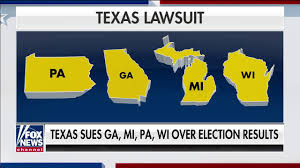 The Supreme Court’s rejection of Texas v. Pennsylvania (despite support from an amicus brief by two nonexistent states) has sparked an unusual national dialogue about the concept of standing (including the President’s accurate observation: “All they were interested in is ‘standing’, which makes it very difficult for the President to present a case on the merits.” (emphasis added)). The capable Rory Ryan at Baylor Law School has analyzed and critiqued the dissenters’ position; for reference, the entire order appears below:
The Supreme Court’s rejection of Texas v. Pennsylvania (despite support from an amicus brief by two nonexistent states) has sparked an unusual national dialogue about the concept of standing (including the President’s accurate observation: “All they were interested in is ‘standing’, which makes it very difficult for the President to present a case on the merits.” (emphasis added)). The capable Rory Ryan at Baylor Law School has analyzed and critiqued the dissenters’ position; for reference, the entire order appears below:
The State of Texas’s motion for leave to file a bill of complaint is denied for lack of standing under Article III of the Constitution. Texas has not demonstrated a judicially cognizable interest in the manner in which another State conducts its elections. All other pending motions are dismissed as moot. Statement of Justice Alito, with whom Justice Thomas joins: In my view, we do not have discretion to deny the filing of a bill of complaint in a case that falls within our original jurisdiction. See Arizona v. California, 589 U. S. ___ (Feb. 24, 2020) (Thomas, J., dissenting). I would therefore grant the motion to file the bill of complaint but would not grant other relief, and I express no view on any other issue.
 Yes, it’s kind of a pain, but it’s your vote, your voice, and your chance to be heard as to a widely-circulated attorney directory. The link to the Super Lawyers nomination site is here, and the deadline to make your nominations is December 21, 2020.
Yes, it’s kind of a pain, but it’s your vote, your voice, and your chance to be heard as to a widely-circulated attorney directory. The link to the Super Lawyers nomination site is here, and the deadline to make your nominations is December 21, 2020.
Automation Support, Inc. v. Philippi, No. 20-10386 (Dec. 8, 2020).
In Williams v. Reeves, 953 F.3d 729 (5th Cir. 2020), “[t]he plaintiffs in this lawsuit are low-income African-American women whose children attend public schools in Mississippi. They filed suit against multiple state officials in 2017, alleging that the current version of the Mississippi Constitution violates the ‘school rights and privileges’ condition of the [1870] Mississippi Readmission Act.” A Fifth Circuit panel found that ” a portion of the relief plaintiffs seek is prohibited by the Eleventh Amendment,” but that “the lawsuit also partially seeks relief that satisfies the Ex parte Young exception to sovereign immunity.” The full court recently denied en banc review by an 8-9 vote; the votes are described below, and they are identical to the split in another recent vote. (Red and blue show the political party of the nominating President, and an * indicates former service as a trial judge.)
 “In November 2015, over a year after Richter claims that an implied contract had been formed, the parties exchanged a letter of intent. The letter stated that it was to be construed as securing a “preliminary understanding” between the parties and to serve as “a preliminary basis for negotiating a written agreement that will contain additional material terms, conditions and provisions not yet agreed upon by the parties.” The letter explicitly stated that it did not constitute a binding contract. We agree with the district court that this renders implausible any inference that the prior 2014 e-mail was intended by the parties to represent assent to be bound by contract …” Richter v. Carnival Corp., No. 20-10480 (Dec. 1, 2020).
“In November 2015, over a year after Richter claims that an implied contract had been formed, the parties exchanged a letter of intent. The letter stated that it was to be construed as securing a “preliminary understanding” between the parties and to serve as “a preliminary basis for negotiating a written agreement that will contain additional material terms, conditions and provisions not yet agreed upon by the parties.” The letter explicitly stated that it did not constitute a binding contract. We agree with the district court that this renders implausible any inference that the prior 2014 e-mail was intended by the parties to represent assent to be bound by contract …” Richter v. Carnival Corp., No. 20-10480 (Dec. 1, 2020).
 In striking down a regulation of casket-making by a Louisiana monastery, the Fifth Circuit assured: “Nor is the ghost of Lochner lurking about.” St. Joseph Abbey v. Castille, 712 F. 3d 215, 226-27 (5th Cir. 2013). Nevertheless, that fearsome shade surfaced in Hines v. Quillivan, an equal-protection challenge to Texas’s regulation of telemedicine by veterinarians, only to be banished by the panel majority: “It is not irrational for a state to change in stages its licensing laws to adapt to our new, technology-based economy. If the Texas legislature finds the recently enacted changes on telemedicine successful, it may decide to expand those changes to include veterinarians. It is reasonable to have a trial period rather than to make a hasty policy change. Though we could conceive no rational basis for the law challenged in St. Joseph Abbey, we can conceive many rational bases here.”
In striking down a regulation of casket-making by a Louisiana monastery, the Fifth Circuit assured: “Nor is the ghost of Lochner lurking about.” St. Joseph Abbey v. Castille, 712 F. 3d 215, 226-27 (5th Cir. 2013). Nevertheless, that fearsome shade surfaced in Hines v. Quillivan, an equal-protection challenge to Texas’s regulation of telemedicine by veterinarians, only to be banished by the panel majority: “It is not irrational for a state to change in stages its licensing laws to adapt to our new, technology-based economy. If the Texas legislature finds the recently enacted changes on telemedicine successful, it may decide to expand those changes to include veterinarians. It is reasonable to have a trial period rather than to make a hasty policy change. Though we could conceive no rational basis for the law challenged in St. Joseph Abbey, we can conceive many rational bases here.”
A dissent saw matters differently, crediting the plaintiff’s argument that “[i]t simply is not rational to allow telemedicine without a physical examination for babies but deny the same form of  telemedicine for puppies on the ground that puppies cannot speak.” No. 19-40605 (revised Dec. 2, 2020).
telemedicine for puppies on the ground that puppies cannot speak.” No. 19-40605 (revised Dec. 2, 2020).
An error in pleading jurisdiction led to an inconclusive end in Accordant Communications v. Sayer Construction, No. 20-50169 (Dec. 4, 2020):
- Accordant won a $1.4 million arbitration award against Sayer.
- Accordant sued to confirm the award in federal court.
 “As to the citizenship of the parties, Accordant alleged that it ‘is a limited liability company organized under the laws of Georgia with its principal place of business in Seminole County, Florida” and that Sayers ‘is a limited liability company organized under the laws of Texas with its principal place of business in Travis County, Texas.'”
“As to the citizenship of the parties, Accordant alleged that it ‘is a limited liability company organized under the laws of Georgia with its principal place of business in Seminole County, Florida” and that Sayers ‘is a limited liability company organized under the laws of Texas with its principal place of business in Travis County, Texas.'” - Sayer declined to answer postjudgment discovery, and on appeal argued that the district court lacked subject-matter jurisdiction (as the above allegations are based on the standards for a corporation rather than an LLC).
 Despite this ‘clearly deficient’ and ‘basic’ pleading problem, the Fifth Circuit did not dismiss the case: “Considering the evidence in the record on appeal … we find that ‘jurisdiction is not clear from the record, but there is some reason to believe that jurisdiction exists.’ Therefore, we exercise our discretion under [28 USC] § 1653 and ‘remand the case to the district court for amendment of the allegations and for the record to be supplemented,’ if necessary.” (citation omitted).
Despite this ‘clearly deficient’ and ‘basic’ pleading problem, the Fifth Circuit did not dismiss the case: “Considering the evidence in the record on appeal … we find that ‘jurisdiction is not clear from the record, but there is some reason to believe that jurisdiction exists.’ Therefore, we exercise our discretion under [28 USC] § 1653 and ‘remand the case to the district court for amendment of the allegations and for the record to be supplemented,’ if necessary.” (citation omitted).
 Hon. Thomas Reavley has passed away in Houston, at the age of 99. The Houston Chronicle summarizes his life of extraordinary service to the Texas courts and the U.S. Court of Appeals for the Fifth Circuit, as does the Texas Lawbook. His wisdom and statesmanlike presence will be missed by all.
Hon. Thomas Reavley has passed away in Houston, at the age of 99. The Houston Chronicle summarizes his life of extraordinary service to the Texas courts and the U.S. Court of Appeals for the Fifth Circuit, as does the Texas Lawbook. His wisdom and statesmanlike presence will be missed by all.
By an 8-9 vote, the Fifth Circuit abstained from en banc review of McRaney v. North American Mission Board, 966 F.3d 346 (5th Cir. 2020), in which the panel found that the application of the ecclesiastical abstention doctrine was premature given the stage of the parties’ case. A breakdown of the votes is below (the third panel member, Judge Clement, has taken senior status and did not participate in the vote):
“Hard cases make bad law,” says the old adage; whether that holds true for Taylor v. Riojas, will remain to be seen. The Supreme Court reversed a qualified-immunity ruling in a case involving what it saw as “shockingly unsanitary” prison cells, finding that the “extreme circumstances” of the case eliminated any dispute about whether the relevant law was clearly-established. No. 19-1261 (U.S. Nov. 2, 2020) (reversing Taylor v. Stevens, 946 F.3d 211 (5th Cir. 2019).
Doe, a police officer, sued under Louisiana state law for injuries that he suffered when trying to clear a highway of protesters, who had been organized by McKesson. The district court dismissed the case on First Amendment grounds; a Fifth Circuit panel majority “held that a jury could plausibly find that Mckesson breached his ‘duty not to negligently precipitate the crime of a third party’ because ‘a violent confrontation with a police officer was a foreseeable effect of negligently directing a protest’ onto the highway, and the en b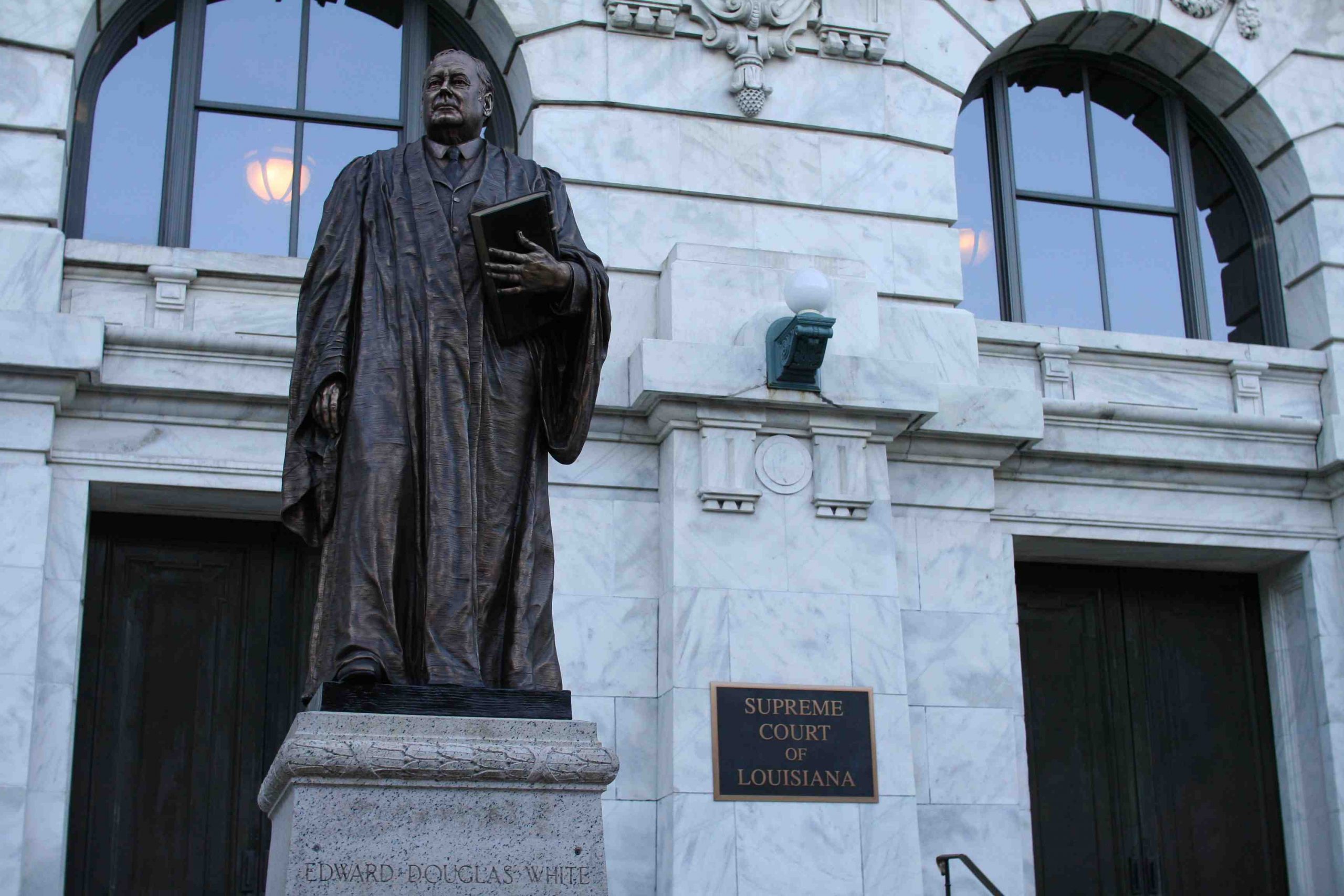 anc court divided -8 on whether to further review the case.
anc court divided -8 on whether to further review the case.
The Supreme Court held that the issue should be certified to the Louisiana Supreme Court, noting that “the dispute presents novel issues of state law peculiarly calling for the exercise of judgment by the state courts,” and that “certification would ensure that any conflict in this case between state law and the First Amendment is not purely hypothetical. The novelty of the claim at issue here only underscores that ‘[w]arnings against premature adjudication of constitutional questions bear heightened attention when a federal court is asked to invalidate a State’s law.'” McKesson v. Doe, No.19–1108 (U.S. Nov. 2, 2020) (citation omitted).
The dry-sounding issue before the en banc court in Planned Parenthood v. Kauffman, No. 17-50282 (Nov. 23, 2020), was “whether 42 U.S.C. § 1396a(a)(23) gives Medicaid patients a right to challenge, under 42 U.S.C. § 1983, a State’s determination that a health care provider is not ‘qualified’ within the meaning of § 1396a(a)(23).” The practical consequence of that issue, however, is significant–who may sue about Texas’s termination of several Planned Parenthood facilities from that state’s Medicaid program.
The majority held that under a 1980 Supreme Court case and the structure of the statute, the patients did not have the right to sue. In so doing, the Fifth Circuit joined the Eighth Circuit and split with five others. A 7-judge concurrence (2 votes shy of a majority, given the configuration of the en banc court for this case) would have reached the merits and rejected them. The opinions are illustrated in the chart below:
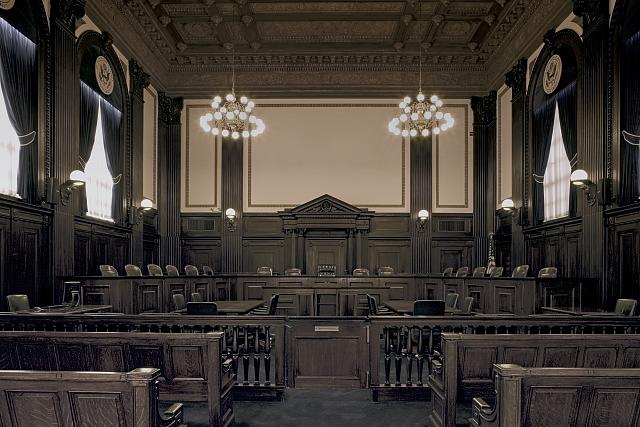 The Fifth Circuit recently decided to take three matters en banc:
The Fifth Circuit recently decided to take three matters en banc:
- Cochran v. SEC, 969 F.3d 507 (2020): “Judicial review of Securities and Exchange Commission proceedings lies in the courts of appeals after the agency rules. 15 U.S.C. § 78y. This appeal asks whether a party may nonetheless raise a constitutional challenge to an SEC enforcement action in federal district court before the agency proceeding ends.”
- Sanchez v. Smart Fabricators, 970 F.3d 550 (2020), in which all three panel members urged the en banc court to address Circuit precedent about the definition of a seaman; and
- Whole Woman’s Health v. Paxton, No. 17-51060 (Oct. 13, 2020), an abortion case in which the panel disagreed about the effect of June Medical Services LLC v. Russo, 140 S. Ct. 2103 (2020).
 “Sharing liability is not the same as sharing an identity. As our colleagues in the Ninth Circuit explained, ‘Liability and jurisdiction are independent. . . . Regardless of their joint liability, jurisdiction over each defendant must be established individually.’ Lumping defendants together for jurisdictional purposes merely because they are solidary obligors ‘is plainly unconstitutional.'” Libersat v. Sundance Energy, No. 20-30121 (Oct. 26, 2020) (citation omitted, emphasis added).
“Sharing liability is not the same as sharing an identity. As our colleagues in the Ninth Circuit explained, ‘Liability and jurisdiction are independent. . . . Regardless of their joint liability, jurisdiction over each defendant must be established individually.’ Lumping defendants together for jurisdictional purposes merely because they are solidary obligors ‘is plainly unconstitutional.'” Libersat v. Sundance Energy, No. 20-30121 (Oct. 26, 2020) (citation omitted, emphasis added).
 The novelty of the international-discovery procedure in 28 USC § 1782 intersected with the collateral-order doctrine about interlocutory appeals in Banca Pueyo SA v. Lone Star Fund: “While we readily conclude that this appeal was premature, we recognize that the unusual nature of section 1782 proceedings results in some uncertainty about when to appeal. Indeed, respondents acknowledged that this might not be the right time, but they appealed now in an abundance of caution. They also worry that an appeal may never be ripe due to the possibility of a future dispute over privilege. But appellate jurisdiction is a ‘practical’ determination, not a speculative one. Once the district court fully resolves the second motion to quash, the scope of section 1782 discovery should be definitively resolved. When that conclusive determination comes, an appeal would be appropriate.” No. 20-10049 (Oct. 27, 2020) (mem. op.).
The novelty of the international-discovery procedure in 28 USC § 1782 intersected with the collateral-order doctrine about interlocutory appeals in Banca Pueyo SA v. Lone Star Fund: “While we readily conclude that this appeal was premature, we recognize that the unusual nature of section 1782 proceedings results in some uncertainty about when to appeal. Indeed, respondents acknowledged that this might not be the right time, but they appealed now in an abundance of caution. They also worry that an appeal may never be ripe due to the possibility of a future dispute over privilege. But appellate jurisdiction is a ‘practical’ determination, not a speculative one. Once the district court fully resolves the second motion to quash, the scope of section 1782 discovery should be definitively resolved. When that conclusive determination comes, an appeal would be appropriate.” No. 20-10049 (Oct. 27, 2020) (mem. op.).
 Richardson v. Flores reviewed the standards for intervention into an ongoing appeal, noting: “There is no appellate rule allowing intervention generally. Instead, the Federal Rules of Appellate Procedure contemplate intervention only in
Richardson v. Flores reviewed the standards for intervention into an ongoing appeal, noting: “There is no appellate rule allowing intervention generally. Instead, the Federal Rules of Appellate Procedure contemplate intervention only in
proceedings to review agency action. Fed. R. App. P. 15(d). But despite the lack of an on-point rule, we have allowed intervention in cases outside the scope of Rule 15(d). . . . Perhaps because there is no rule explicitly allowing intervention on appeal, the caselaw explicating the standards for such motions is scarce. In Bursey, when granting a similar motion to intervene, we said ‘a court of appeals may,  but only in an exceptional case for imperative reasons, permit intervention where none was sought in the district court.'” (footnote and citations omitted, emphasis in original). The Court also noted: “Motions to intervene on appeal are different from motions to intervene for purposes of appeal. Motions to intervene for purposes of appeal are used where ‘the existing parties have decided not to pursue [an appeal]’ and are filed in district courts in the first instance under the Federal Rules of Civil Procedure.” (citation omitted).
but only in an exceptional case for imperative reasons, permit intervention where none was sought in the district court.'” (footnote and citations omitted, emphasis in original). The Court also noted: “Motions to intervene on appeal are different from motions to intervene for purposes of appeal. Motions to intervene for purposes of appeal are used where ‘the existing parties have decided not to pursue [an appeal]’ and are filed in district courts in the first instance under the Federal Rules of Civil Procedure.” (citation omitted).
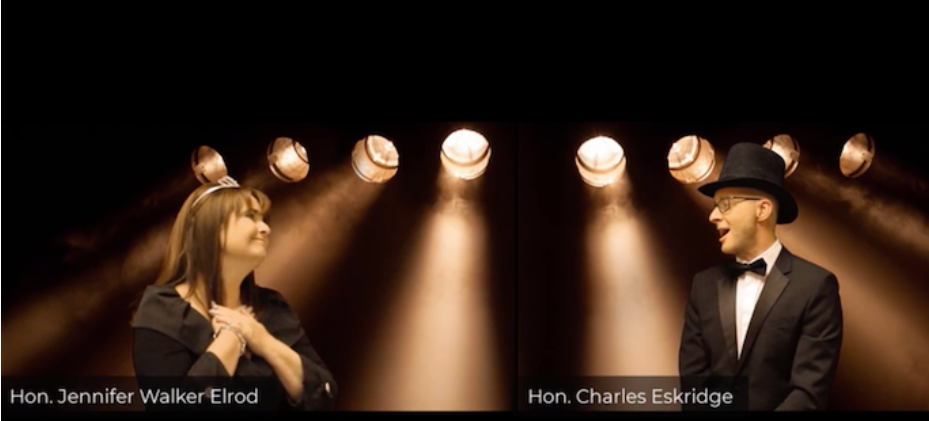 Who knew? The federal bench in Houston just released an inspiring rendition of “We’ll Be Back” from Hamilton, revised to reflect life in the COVID-19 pandemic. Bravo!
Who knew? The federal bench in Houston just released an inspiring rendition of “We’ll Be Back” from Hamilton, revised to reflect life in the COVID-19 pandemic. Bravo!
The defendant in Coastal Bridge Co. v. Heatec, No. 19-31030 (revised Nov. 6, 2020) made a spoliation claim about the loss of a heater involved in a fire. The Fifth Circuit reasoned:
- “As a threshold matter, Because Coastal Bridge reasonably should have anticipated litigation over the fire damage, it had a duty to preserve the equipment.”
- But bad faith was not shown: “Adherence to normal operating procedures may counter a contention of bad faith. Here, an outdoor piece of industrial equipment was stored outdoors. The record does not support the finding that Coastal Bridge acted with a culpable state of mind.”
- And as to relevance: “Heatec did not specifically request to examine the pumps at the joint inspection. As such, the pumps are of questionable relevance for the purposes of its underlying claim that poor pump maintenance can be a cause of a heater fire.”
 Billy Joel disputed causation about starting the fire. So did the parties in Coastal Bridge Co. v. Heatec, in which the Fifth Circuit reversed a summary judgment, holding: “Here, genuine disputes of material fact exist as to: (1) the significance of the heating pumps; (2) what
Billy Joel disputed causation about starting the fire. So did the parties in Coastal Bridge Co. v. Heatec, in which the Fifth Circuit reversed a summary judgment, holding: “Here, genuine disputes of material fact exist as to: (1) the significance of the heating pumps; (2) what  equipment was disassembled and disposed of; (3) the origin of the subject fire and whether the inlet pipe moved; and (4) the extent of communication4 that occurred between the parties before the formal notice of the fire. These factual disputes cannot be resolved without weighing the evidence and making credibility determinations, which are matters for the factfinder.” No. 19-31030 (Nov. 6, 2020, revised).
equipment was disassembled and disposed of; (3) the origin of the subject fire and whether the inlet pipe moved; and (4) the extent of communication4 that occurred between the parties before the formal notice of the fire. These factual disputes cannot be resolved without weighing the evidence and making credibility determinations, which are matters for the factfinder.” No. 19-31030 (Nov. 6, 2020, revised).
 Each of the four factors for a deadline extension was in play in AIG Europe, Inc. v. Caterpillar, Inc., No. 19-40934, where the Fifth Circuit observed:
Each of the four factors for a deadline extension was in play in AIG Europe, Inc. v. Caterpillar, Inc., No. 19-40934, where the Fifth Circuit observed:
- Explanation. “If AIG needed information from Caterpillar’s experts to allow Faherty to complete his expert report, AIG should have moved to compel the depositions of those experts.”
- Importance. “AIG’s claims do not turn on Faherty’s report. Despite the exclusion, AIG had experts on causation.”
- Prejudice. “Faherty’s report responded to the analysis of Caterpillar’s experts, it also contained new analyses and conclusions. Defendants were not given the opportunity to challenge these conclusions on the critical issue of causation.”
- Continuance? “Yet another continuance would have delayed summary judgment and a potential trial even further.”
 An “area developer” for Pizza Inn did not timely renew his option contract related to the potential development of new stores. The Fifth Circuit reversed a judgment for the developer, finding that Texas’s doctrine of “equitable intervention” did not apply. The alleged harms from nonrenewal–“a partial forfeiture of a $1,250,000 purchase price, a forfeiture of future profits . . . , and the shuttering of a Pizza Inn franchise store”–were either within the scope of the contractual bargain or simply not unconscionable, as required by the doctrine. Pizza Inn v. Cairday, No. 19-11302 (Nov. 4, 2020).
An “area developer” for Pizza Inn did not timely renew his option contract related to the potential development of new stores. The Fifth Circuit reversed a judgment for the developer, finding that Texas’s doctrine of “equitable intervention” did not apply. The alleged harms from nonrenewal–“a partial forfeiture of a $1,250,000 purchase price, a forfeiture of future profits . . . , and the shuttering of a Pizza Inn franchise store”–were either within the scope of the contractual bargain or simply not unconscionable, as required by the doctrine. Pizza Inn v. Cairday, No. 19-11302 (Nov. 4, 2020).
 The issue in 9503 Middlex, Inc. v. Continental Motors, Inc., No. 19-50361 (Nov. 2, 2020) (unpublished), was whether a commercial tenant was “holding over in possession,” and the Fifth Circuit held it was not: “Here, the district court found that the combination of (1) the retention of the keys to the gate, (2) the use of the gate as a shortcut, and (3) the use of the premises as a break area “constituted holding over.” We agree they are relevant evidence, but we do not agree that they are sufficient. Continental did not occupy the premises of Buildings E and F, nor did Continental exercise dominion over the premises. Continental surrendered the properties to the plaintiffs, though it retained a key to an outside gate. We do not see support in the caselaw that a tenant occupies or controls property when something occurs as insignificant as when employees eat lunch at picnic tables on that property.”
The issue in 9503 Middlex, Inc. v. Continental Motors, Inc., No. 19-50361 (Nov. 2, 2020) (unpublished), was whether a commercial tenant was “holding over in possession,” and the Fifth Circuit held it was not: “Here, the district court found that the combination of (1) the retention of the keys to the gate, (2) the use of the gate as a shortcut, and (3) the use of the premises as a break area “constituted holding over.” We agree they are relevant evidence, but we do not agree that they are sufficient. Continental did not occupy the premises of Buildings E and F, nor did Continental exercise dominion over the premises. Continental surrendered the properties to the plaintiffs, though it retained a key to an outside gate. We do not see support in the caselaw that a tenant occupies or controls property when something occurs as insignificant as when employees eat lunch at picnic tables on that property.”
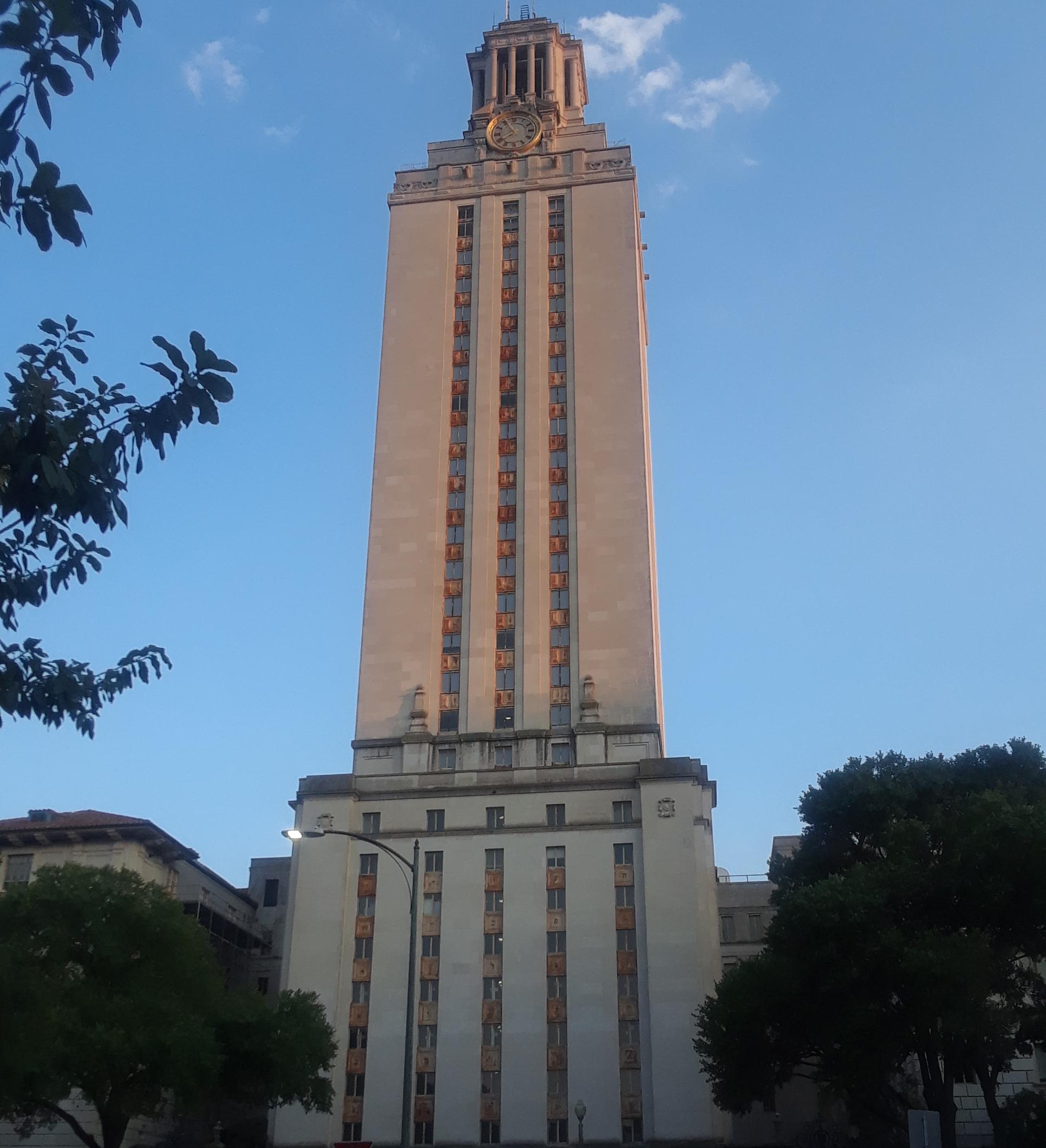 The University of Texas’s rules about campus speech did not fare well in Speech First, Inc. v. Fenves, in which the Fifth Circuit found that a preliminary-injunction action could proceed. The Court found that the case was not moot and stated a strong claim on the merits: “Of course, not every utterance is worth protecting under the First Amendment. In our current national condition, however, in which ‘institutional leaders, in a spirit of panicked damage control, are delivering hasty and disproportionate punishment instead of considered reforms,’ courts must be especially vigilant against assaults on speech in the Constitution’s care. Otherwise, the people may not be free to generate, debate, and discuss both general and specific ideas, hopes, and experiences,’ to ‘transmit their resulting views and conclusions to their elected representatives,’ ‘to influence the public policy enacted by elected representatives,’ and thereby to realize the political and human common good.” No. 19-50529 (revised Oct. 30, 2020) (footnotes omitted).
The University of Texas’s rules about campus speech did not fare well in Speech First, Inc. v. Fenves, in which the Fifth Circuit found that a preliminary-injunction action could proceed. The Court found that the case was not moot and stated a strong claim on the merits: “Of course, not every utterance is worth protecting under the First Amendment. In our current national condition, however, in which ‘institutional leaders, in a spirit of panicked damage control, are delivering hasty and disproportionate punishment instead of considered reforms,’ courts must be especially vigilant against assaults on speech in the Constitution’s care. Otherwise, the people may not be free to generate, debate, and discuss both general and specific ideas, hopes, and experiences,’ to ‘transmit their resulting views and conclusions to their elected representatives,’ ‘to influence the public policy enacted by elected representatives,’ and thereby to realize the political and human common good.” No. 19-50529 (revised Oct. 30, 2020) (footnotes omitted).
 Belcher complained about the FDIC’s power to take his deposition. The parties, and the panel majority, agreed that his lawsuit did not become moot even after the challenged deposition occurred: ‘Because the district court on remand can ‘fashion some form of meaningful relief,’ appeal is not moot. Exactly what that relief might entail is beyond the scope of our concern. However, it is undisputed by the parties that the district court could strike Belcher’s deposition testimony before the FDIC.” The majority also noted that the district court could address the FDIC’s sharing of the transcript. A dissent observed: “I see no reason to override what common sense suggests: the appeal of an order requiring a deposition is moot once the deposition is over.” FDIC v. Belcher, No. 19-31023 (Oct. 26, 2020).
Belcher complained about the FDIC’s power to take his deposition. The parties, and the panel majority, agreed that his lawsuit did not become moot even after the challenged deposition occurred: ‘Because the district court on remand can ‘fashion some form of meaningful relief,’ appeal is not moot. Exactly what that relief might entail is beyond the scope of our concern. However, it is undisputed by the parties that the district court could strike Belcher’s deposition testimony before the FDIC.” The majority also noted that the district court could address the FDIC’s sharing of the transcript. A dissent observed: “I see no reason to override what common sense suggests: the appeal of an order requiring a deposition is moot once the deposition is over.” FDIC v. Belcher, No. 19-31023 (Oct. 26, 2020).
 In one of many recent election-law disputes, the panel majority in Richardson v. Hughs painstakingly reviewed, and rejected, the plaintiffs’ challenge to Texas’s practices about signature verification for mail-in ballots. The procedural posture was a motion to stay; a concurrence cauti
In one of many recent election-law disputes, the panel majority in Richardson v. Hughs painstakingly reviewed, and rejected, the plaintiffs’ challenge to Texas’s practices about signature verification for mail-in ballots. The procedural posture was a motion to stay; a concurrence cauti oned: “[T]he reality is that the ultimate legality of the present system cannot be settled by the federal courts at this juncture when voting is already underway, and any opinion on a motions panel is essentially written in sand with no precedential value ….” footnote omitted). No. 20-50774 (Oct. 20, 2020).
oned: “[T]he reality is that the ultimate legality of the present system cannot be settled by the federal courts at this juncture when voting is already underway, and any opinion on a motions panel is essentially written in sand with no precedential value ….” footnote omitted). No. 20-50774 (Oct. 20, 2020).
If the law had an attic, it would hold the subject matter of Pool v. City of Houston, No. 19-20828 (Oct. 23, 2020):

It is often said that courts “strike down” laws when ruling them unconstitutional. That’s not quite right. Courts hold laws unenforceable; they do not erase them. Many laws that are plainly unconstitutional remain on the statute books. Jim Crow-era segregation laws are one example. The City of Houston contends that it’s being sued for one of these so-called “zombie” laws. Its Charter allows only registered voters to circulate petitions for initiatives and referenda, even though the Supreme Court held a similar law unconstitutional twenty years ago. This case thus requires us to decide when the threat of continued enforcement is enough to reanimate a zombie law and bring it from the statutory graveyard into federal court.
 (citations omitted). Held: the zombie walked, based both on the City’s history of enforcement of this specific law, and the inadequacy of its effort to disclaim further enforcement: “At least based on the current record, the City’s addition of the ‘Editor’s note’ on its website does not moot this case. Voluntarily stopping an unconstitutional practice renders a case moot only ‘if subsequent events ma[k]e it absolutely clear that the allegedly wrongful behavior c[an] not reasonably be expected to recur.'” You can hear more about this case on the Coale Mind Halloween Special – “Attack of the Zombie Statute!”
(citations omitted). Held: the zombie walked, based both on the City’s history of enforcement of this specific law, and the inadequacy of its effort to disclaim further enforcement: “At least based on the current record, the City’s addition of the ‘Editor’s note’ on its website does not moot this case. Voluntarily stopping an unconstitutional practice renders a case moot only ‘if subsequent events ma[k]e it absolutely clear that the allegedly wrongful behavior c[an] not reasonably be expected to recur.'” You can hear more about this case on the Coale Mind Halloween Special – “Attack of the Zombie Statute!”
 The dispute in Smith v. Toyota Motor Corp., No 19-60938 (Oct. 20, 2020), was whether there was diversity jurisdiction over two business entities with diverse business activities, one of which was named . . . Diversity Vuteq LLC. Despite the abundant diversity in the case, the Fifth Circuit reminded that there is not a diversity of opinion about how to properly plead citizenship:
The dispute in Smith v. Toyota Motor Corp., No 19-60938 (Oct. 20, 2020), was whether there was diversity jurisdiction over two business entities with diverse business activities, one of which was named . . . Diversity Vuteq LLC. Despite the abundant diversity in the case, the Fifth Circuit reminded that there is not a diversity of opinion about how to properly plead citizenship:
- “To adequately allege the citizenship of Toyota, a corporation, Smith needed to ‘set out the principal place of business of the corporation as well as the stat e of its incorporation.'” (citations omitted);
- “To adequately allege the citizenship of Diversity, a limited liability corporation, Smith needed to ‘specifically allege the citizenship of every member of every LLC or partnership involved in a litigation.'”
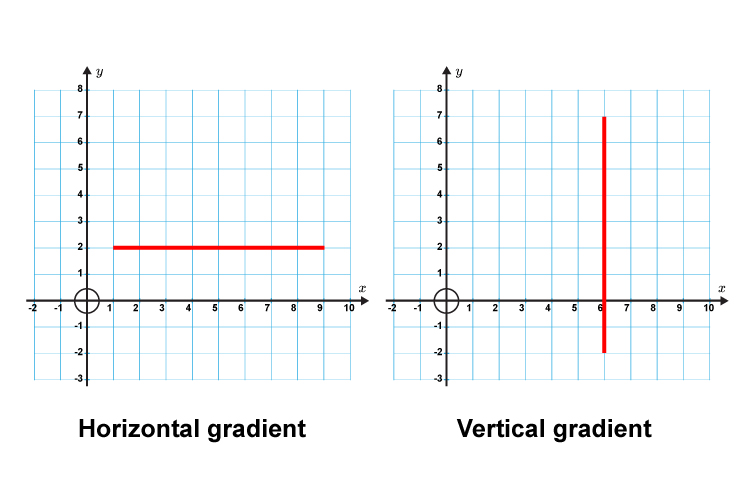 A challenging case about the Texas foster-care system returned to the Fifth Circuit in M.D. v. Abbott, No. 19-41015 (Oct. 16, 2020), and the panel did not approve of revisions to an injunction that went beyond its mandate in the previous appeal: “Plaintiffs claim that the district court did not violate the mandate rule
A challenging case about the Texas foster-care system returned to the Fifth Circuit in M.D. v. Abbott, No. 19-41015 (Oct. 16, 2020), and the panel did not approve of revisions to an injunction that went beyond its mandate in the previous appeal: “Plaintiffs claim that the district court did not violate the mandate rule
because a court ‘invok[ing] equity’s power to remedy a constitutional
violation by an injunction mandating systemic changes to an institution’ generally has ‘the continuing duty and responsibility to assess the efficacy and consequences of its order.’ As Plaintiffs point out, we recited this general principle in Stukenberg II,  stating that ‘[a] district court undoubtedly has the equitable power to oversee compliance with its own injunction.’ ‘E]quitable decrees that impose a continuing supervisory function on the court commonly . . . contemplate the subsequent issuance of specific implementing injunctions.’ But judges disagree on occasion over the proper exercise of equitable powers, just as judges disagree on occasion over the proper interpretation o statutes. When that happens, appellate courts must make the final decision—and once the decision is made, it must be followed. And that, of course, is the whole purpose of the mandate rule: ‘A district court on remand . . . may not disregard the explicit directives of [the appellate] court'”.’ A (citations omitted).
stating that ‘[a] district court undoubtedly has the equitable power to oversee compliance with its own injunction.’ ‘E]quitable decrees that impose a continuing supervisory function on the court commonly . . . contemplate the subsequent issuance of specific implementing injunctions.’ But judges disagree on occasion over the proper exercise of equitable powers, just as judges disagree on occasion over the proper interpretation o statutes. When that happens, appellate courts must make the final decision—and once the decision is made, it must be followed. And that, of course, is the whole purpose of the mandate rule: ‘A district court on remand . . . may not disregard the explicit directives of [the appellate] court'”.’ A (citations omitted).
 John Dierlam doggedly pursued his religious-freedom challenge to the Affordable Care Act throughout that statute’s “serpentine history.” After considering his persistence in the face of constant statutory change, the Fifth Circuit reversed a finding of mootness, observing: “Ordinarily, when a case ‘has become moot on appeal,’ the court
John Dierlam doggedly pursued his religious-freedom challenge to the Affordable Care Act throughout that statute’s “serpentine history.” After considering his persistence in the face of constant statutory change, the Fifth Circuit reversed a finding of mootness, observing: “Ordinarily, when a case ‘has become moot on appeal,’ the court  should “vacate the judgment with directions to dismiss.” But ‘in instances where the mootness is attributable to a change in the legal framework governing the case, and where the plaintiff may have some residual claim under the new framework that was understandably not asserted previously,’ we ‘vacate the judgment and remand for further proceedings in which the parties may, if necessary, amend their pleadings or develop the record more fully.’” Dierlam v. Trump, No. 18-20440 (Oct. 15, 2020).
should “vacate the judgment with directions to dismiss.” But ‘in instances where the mootness is attributable to a change in the legal framework governing the case, and where the plaintiff may have some residual claim under the new framework that was understandably not asserted previously,’ we ‘vacate the judgment and remand for further proceedings in which the parties may, if necessary, amend their pleadings or develop the record more fully.’” Dierlam v. Trump, No. 18-20440 (Oct. 15, 2020).
 The most recent episode of the Coale Mind podcast discusses Mi Familia Vota v. Abbott, No. 20-50793 (Oct. 14, 2020), a challenge to several Texas voting laws in light of the COVID-19 pandemic. The case reminds of two important limits on federal judicial power in such disputes:
The most recent episode of the Coale Mind podcast discusses Mi Familia Vota v. Abbott, No. 20-50793 (Oct. 14, 2020), a challenge to several Texas voting laws in light of the COVID-19 pandemic. The case reminds of two important limits on federal judicial power in such disputes:
- Under Ex parte Young (Mr. Young appears to the right): “Although a court can enjoin state officials from enforcing statutes, such an injunction must be directed to those who have the authority to enforce those statutes. In the present case, that would be county or other local officials.”
- And naming the right defendant is only the first hurdle posed by federalism: “An examination of the relief that the Plaintiffs seek in the case before us reveals that in many instances, court-ordered-relief would require the Governor or the Secretary of State to issue an executive order or directive or to take other sweeping affirmative action. If implemented by the district court, many of the directives requested by the Plaintiffs would violate principles of federalism.”
The Fifth Circuit reversed on an issue about arbitrator disclosure, observing, inter alia: “OOGC hypothesizes that these possible, incidental harms to FTS flowing from a unanimous arbitration panel ruling would make [the arbitrator] think that he needed to rule in FTS’s favor or else it would take him personally to task by declining to retain him in future matters. This is simply too much conjecture. Accepting OOGC’s argument would create an ‘incentive to conduct intensive, after-the-fact investigations to discover the most trivial of relationships,’ undercutting the purpose of arbitration ‘as an
efficient and cost-effective alternative to litigation.'” OOGC America v. Chesapeake Exploration, No. 19-20002 (Sept. 14, 2020).
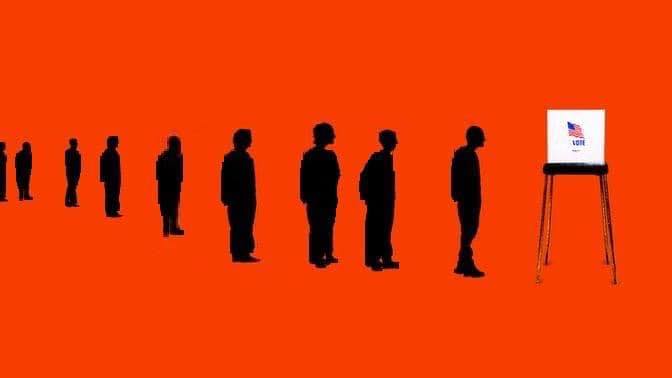 Early voting begins today in Texas. The Fifth Circuit stayed the district court’s order that would have let large Texas counties have more than one early-ballot pickup location. The panel majority concluded, inter alia, that the plaintiffs misconstrued the entirety of the Governor’s actions: “The July 27 and October 1 Proclamations—which must be read together to make sense—are beyond any doubt measures that ‘make[] it easier’ for eligible Texans to vote absentee. How this expansion of voting opportunities burdens anyone’s right to vote is a mystery” (citation omitted). From there, the majority concluded that the plaintiffs overstated the claimed burden, and failed to give sufficient weight to the Governor’s asserted interest in preventing voter fraud. A concurrence criticized the Governor’s use of emergency power: “If a governor can unilaterally suspend early voting laws to reach policy outcomes that you prefer, it stands to reason that a governor can also unilaterally suspend other election laws to achieve policies that you oppose.” Texas LULAC v. Hughs, No. 20-50867 (Oct. 12, 2020).
Early voting begins today in Texas. The Fifth Circuit stayed the district court’s order that would have let large Texas counties have more than one early-ballot pickup location. The panel majority concluded, inter alia, that the plaintiffs misconstrued the entirety of the Governor’s actions: “The July 27 and October 1 Proclamations—which must be read together to make sense—are beyond any doubt measures that ‘make[] it easier’ for eligible Texans to vote absentee. How this expansion of voting opportunities burdens anyone’s right to vote is a mystery” (citation omitted). From there, the majority concluded that the plaintiffs overstated the claimed burden, and failed to give sufficient weight to the Governor’s asserted interest in preventing voter fraud. A concurrence criticized the Governor’s use of emergency power: “If a governor can unilaterally suspend early voting laws to reach policy outcomes that you prefer, it stands to reason that a governor can also unilaterally suspend other election laws to achieve policies that you oppose.” Texas LULAC v. Hughs, No. 20-50867 (Oct. 12, 2020).
 The loser of a Florida arbitration sought to challenge it in Texas; the Fifth Circuit affirmed dismissal for lack of personal jurisdiction in Sayers Construction v. Timberline Construction, No. 19-51099 (Oct. 2, 2020), observing as to the categories of facts alleged:
The loser of a Florida arbitration sought to challenge it in Texas; the Fifth Circuit affirmed dismissal for lack of personal jurisdiction in Sayers Construction v. Timberline Construction, No. 19-51099 (Oct. 2, 2020), observing as to the categories of facts alleged:
- Solicitation. “Reid and Duffy are irrelevant because the ‘unilateral activity of a third party’ cannot establish minimum contacts on behalf of a corporate defendant.”
- Communications. “[M]ailing payments to the forum state, engaging in communications related to the execution and performance of the contract, and the existence of a contract between the nonresident defendant and a resident of the forum are insufficient to establish . . . minimum contacts . . . .” (citation omitted); and
- Texas choice-of-law clause. “[T]he choice-of-law clause in the Master Services Agreement does not suggest the parties expected to resolve their disputes in Texas. That’s because the same Agreement also required that arbitration take place in accordance with the AAA’s venue-selection rules—i.e., as close as possible to the project in Florida.”
All journeys must end, and at long last the journey of the transferee’s good-faith defense has ended in Janvey v. GMAG LLC: “This case requires us to determine whether the Texas Uniform Fraudulent Transfer Act’s … good faith affirmative defense allows Defendants-Appellees to retain fraudulent transfers received while on inquiry notice of a Ponzi scheme. We initially held it does not. We then vacated that decision so that the Supreme Court of Texas could clarify whether good faith requires a transferee on inquiry notice to conduct an investigation into the fraud, or, alternatively, show that such an investigation would have been futile. Having received an answer to our question, we once again hold that the Defendants-Appellees’ good faith defense must fail.” No. 17-11526 (Oct. 8, 2020).
 Motion in limine? “Even though the motion in limine initially excluded post-sale evidence, nothing prohibited the Jordans from seeking to revisit that ruling later. Though the record indicates that the Jordans contemplated asking the district court to reconsider its ruling on the motion in limine, they never did.”
Motion in limine? “Even though the motion in limine initially excluded post-sale evidence, nothing prohibited the Jordans from seeking to revisit that ruling later. Though the record indicates that the Jordans contemplated asking the district court to reconsider its ruling on the motion in limine, they never did.”- Offer of Proof? “Federal Rule of Evidence 103(a)(2) requires parties to proffer excluded evidence to the court unless the ‘substance was apparent from the context.’ The Jordans do not argue that the substance of their bias evidence against Nord was apparent from the context, so they were required to proffer this evidence to preserve the alleged error on appeal. The Jordans failed to proffer evidence of Nord’s alleged bias, so the district court was unable to rule on the evidence’s admissibility. Therefore, we cannot review the exclusion of this evidence.” (citations omitted).
Jordan v. Maxfield & Oberton Holdings, LLC, Ni. 19-60364 (Oct. 7, 2020).
 A nonprofit complained about a lack of press access to the Texas legislative session in 2019, and argued that the case avoided mootness because of the “capable of repetition yet evading review” exception to that doctrine. The Fifth Circuit disagreed, noting that the nonprofit had not fully used the available tools to move its case along: “Crucially, Empower never asked this court to expedite its appeal. Both the Federal Rules of Appellate Procedure and this court’s local rules allow a party to move the court for an expedited appeal. Empower did not take advantage of these rules. That relaxed approach can be contrasted with a
A nonprofit complained about a lack of press access to the Texas legislative session in 2019, and argued that the case avoided mootness because of the “capable of repetition yet evading review” exception to that doctrine. The Fifth Circuit disagreed, noting that the nonprofit had not fully used the available tools to move its case along: “Crucially, Empower never asked this court to expedite its appeal. Both the Federal Rules of Appellate Procedure and this court’s local rules allow a party to move the court for an expedited appeal. Empower did not take advantage of these rules. That relaxed approach can be contrasted with a  recent case in this court involving a plaintiff who similarly sought an injunction against public officials so that he could attend school-district meetings and activities. … In [that case], two days after the appealed was docketed, the plaintiff–appellant filed a motion for expedited appeal which, he argued, was “necessary to redress [the] ‘irreparable injury.’” We granted that motion and moved the case along with appropriate dispatch.
recent case in this court involving a plaintiff who similarly sought an injunction against public officials so that he could attend school-district meetings and activities. … In [that case], two days after the appealed was docketed, the plaintiff–appellant filed a motion for expedited appeal which, he argued, was “necessary to redress [the] ‘irreparable injury.’” We granted that motion and moved the case along with appropriate dispatch.
In contrast, Empower demonstrated no such urgency. When time is of the essence, a party must act like it.” Empower Texas, Inc. v. Geren, No. 19-50577 (Oct. 5, 2020) (citations omitted).
Basic Capital Management v. Dynex, No. 20-40643 (Sept. 30, 2020), reminds about the proper record for evaluating a Rule 12 dismissal mo tion:
tion:
- “[A]s the district court correctly observed, the Form 10-K and the state-court [case] record ‘are al publicly available governmental filings and the existence of the documents, and the contents therein, cannot reasonably be questioned.’ Therefore, the Form 10-K and the state-court record fall squarely within the ambit of [Fed. R. Evid.] 201(b).”
- “Rule 201(d) expressly provides that a court ‘may take judicial notice at any stage of the proceeding,’ and our precedents confirm judicially noticed facts may be considered in ruling on a 12(b)(6) motion. Therefore, in ruling on the 12(b)(6) motion, ‘the district court appropriately used judicial notice.'”
 “[C]ourt changes of election laws close in time to the election are strongly disfavored. … [I]n staying a preliminary injunction that would change election laws eighteen days before early voting begins, we recognize the value of preserving the status quo in a voting case on the eve of an election, and we find that the traditional factors for granting a stay favor granting one here.” Texas Alliance for Retired Americans v. Hughs, No. 20-40643 (Sept. 30, 2020).
“[C]ourt changes of election laws close in time to the election are strongly disfavored. … [I]n staying a preliminary injunction that would change election laws eighteen days before early voting begins, we recognize the value of preserving the status quo in a voting case on the eve of an election, and we find that the traditional factors for granting a stay favor granting one here.” Texas Alliance for Retired Americans v. Hughs, No. 20-40643 (Sept. 30, 2020).
 If the details of the virgule are not obscure enough for you, then you will love this wonderful article from Smithsonian Magazine about the “pilcrow,” a/k/a the paragraph symbol.
If the details of the virgule are not obscure enough for you, then you will love this wonderful article from Smithsonian Magazine about the “pilcrow,” a/k/a the paragraph symbol.
 While Adams v. Alcolac, Inc. presents an exotic dispute –civil liability for the use of mustard gas by Saddam Hussein’s regime–it turns on a fundamental issue of foreseeability under Texas tort (conspiracy) law: “The plaintiffs argue that it was foreseeable that the exported TDG [chemical] would be turned into mustard gas by some ‘nefarious character’ and that it would then be ‘used for terrorist activity.’ Perhaps so, but that misses the point. The question is not whether the plaintiffs’ battery was a foreseeable result of the alleged conspiracy but whether the battery was ‘done in pursuance of the common purpose of the conspiracy[.]’ Because there is no evidence of a common purpose beyond the initial sale and exportation of the TDG, any eventual use of mustard gas on the plaintiffs, even if foreseeable, was not in furtherance of the alleged conspiracy. The plaintiffs’ conspiracy claim thus fails for lack of an underlying tort.” No. 19-40899 (revised, Sept. 25, 2020) (citations and footnote omitted, emphasis added).
While Adams v. Alcolac, Inc. presents an exotic dispute –civil liability for the use of mustard gas by Saddam Hussein’s regime–it turns on a fundamental issue of foreseeability under Texas tort (conspiracy) law: “The plaintiffs argue that it was foreseeable that the exported TDG [chemical] would be turned into mustard gas by some ‘nefarious character’ and that it would then be ‘used for terrorist activity.’ Perhaps so, but that misses the point. The question is not whether the plaintiffs’ battery was a foreseeable result of the alleged conspiracy but whether the battery was ‘done in pursuance of the common purpose of the conspiracy[.]’ Because there is no evidence of a common purpose beyond the initial sale and exportation of the TDG, any eventual use of mustard gas on the plaintiffs, even if foreseeable, was not in furtherance of the alleged conspiracy. The plaintiffs’ conspiracy claim thus fails for lack of an underlying tort.” No. 19-40899 (revised, Sept. 25, 2020) (citations and footnote omitted, emphasis added).
 Badgerow v. REJ Properties, Inc., No 19-30584 (Sept. 11, 2020), applying the McDonnell-Douglas burden-shifting framework, reached the issue of whether there was a fact question on pretext and concluded that there was:
Badgerow v. REJ Properties, Inc., No 19-30584 (Sept. 11, 2020), applying the McDonnell-Douglas burden-shifting framework, reached the issue of whether there was a fact question on pretext and concluded that there was:
“The timing of Badgerow’s firing is highly indicative of motive. According to Badgerow’s version of events the day she was fired, she received a call from Walters who said that he had ‘just got off the phone with Marc Cohen’ and would call her back. When Walters called Badgerow back, he asked her to travel from her office in Houma to his office in Thibodaux so that he could speak with her in person. During their in-person meeting, Walters terminated Badgerow’s employment. Thus, Badgerow’s firing occurred in the immediate aftermath of Walters being informed of Badgerow’s complaints to Cohen. And Badgerow has adduced other significant evidence of pretext. For example, although REJ states that Walters fired Badgerow due to constant complaints from her coworkers, Badgerow asserts that the only explanation he gave for her firing was that she had ‘dinged his perfect . . . record’ with Ameriprise. And Walters admits that immediately before firing Badgerow he ‘told her that Cohen had said he needed to hire a labor attorney and asked “[d]o I have to worry about you suing me?” Finally, although Walters testified that Badgerow’s coworkers had been complaining to him about her behavior for months, Walters seemed determined to keep Badgerow as one of his AFAs until his conversation with Cohen. A reasonable fact finder could infer from this evidence that REJ’s proffered reason for Badgerow’s firing was pretext for unlawful retaliation.”
(citation omitted, emphasis added).



